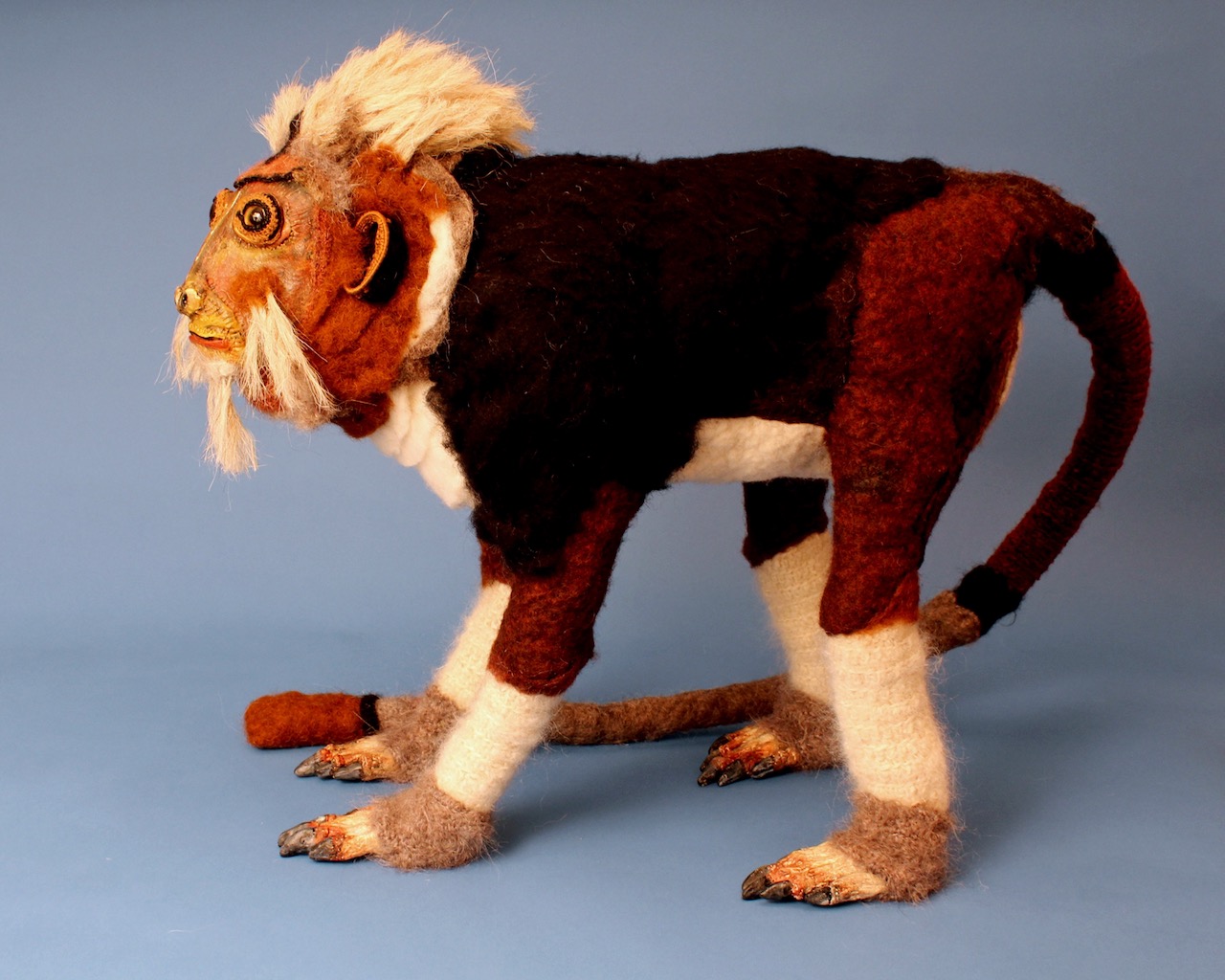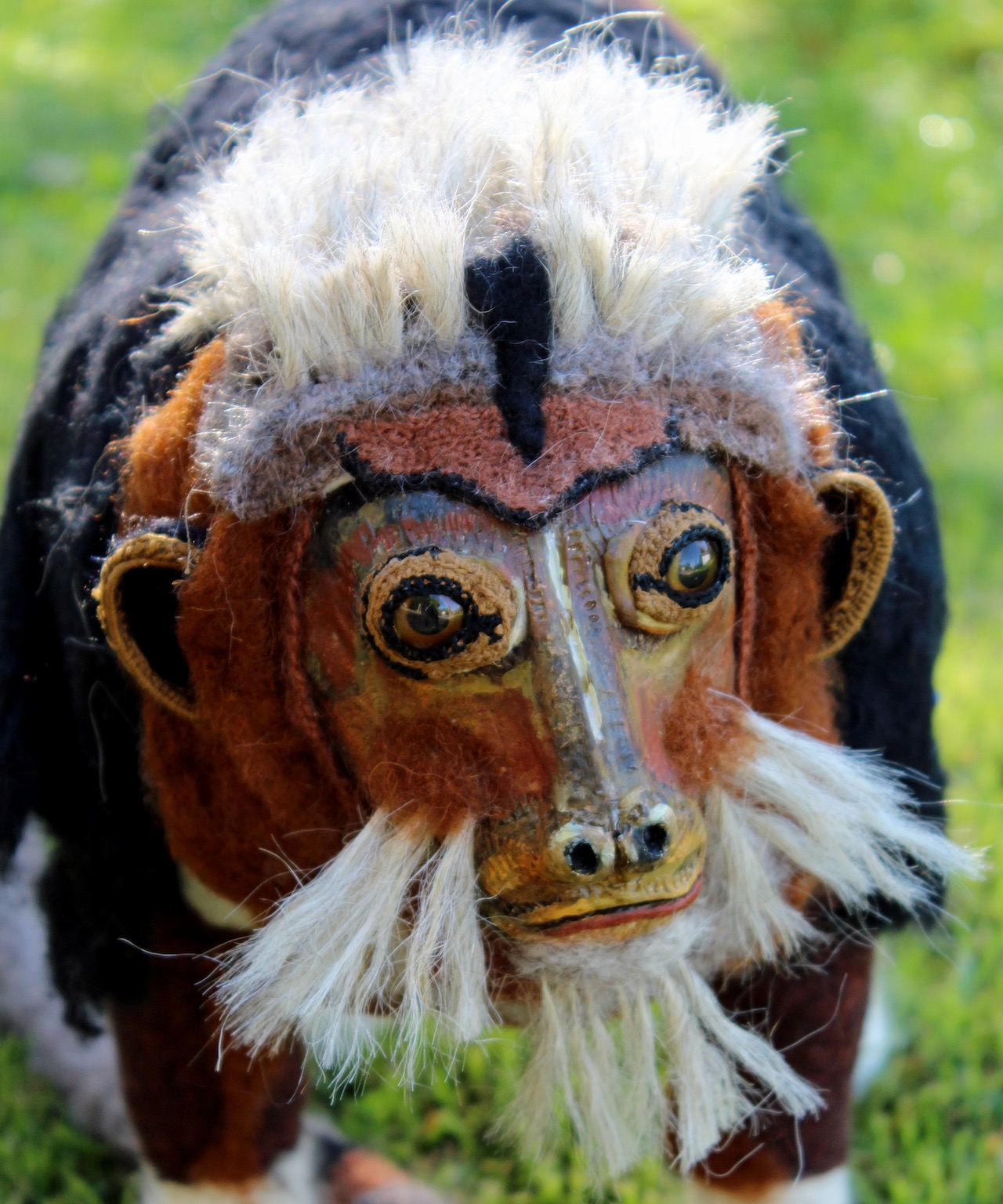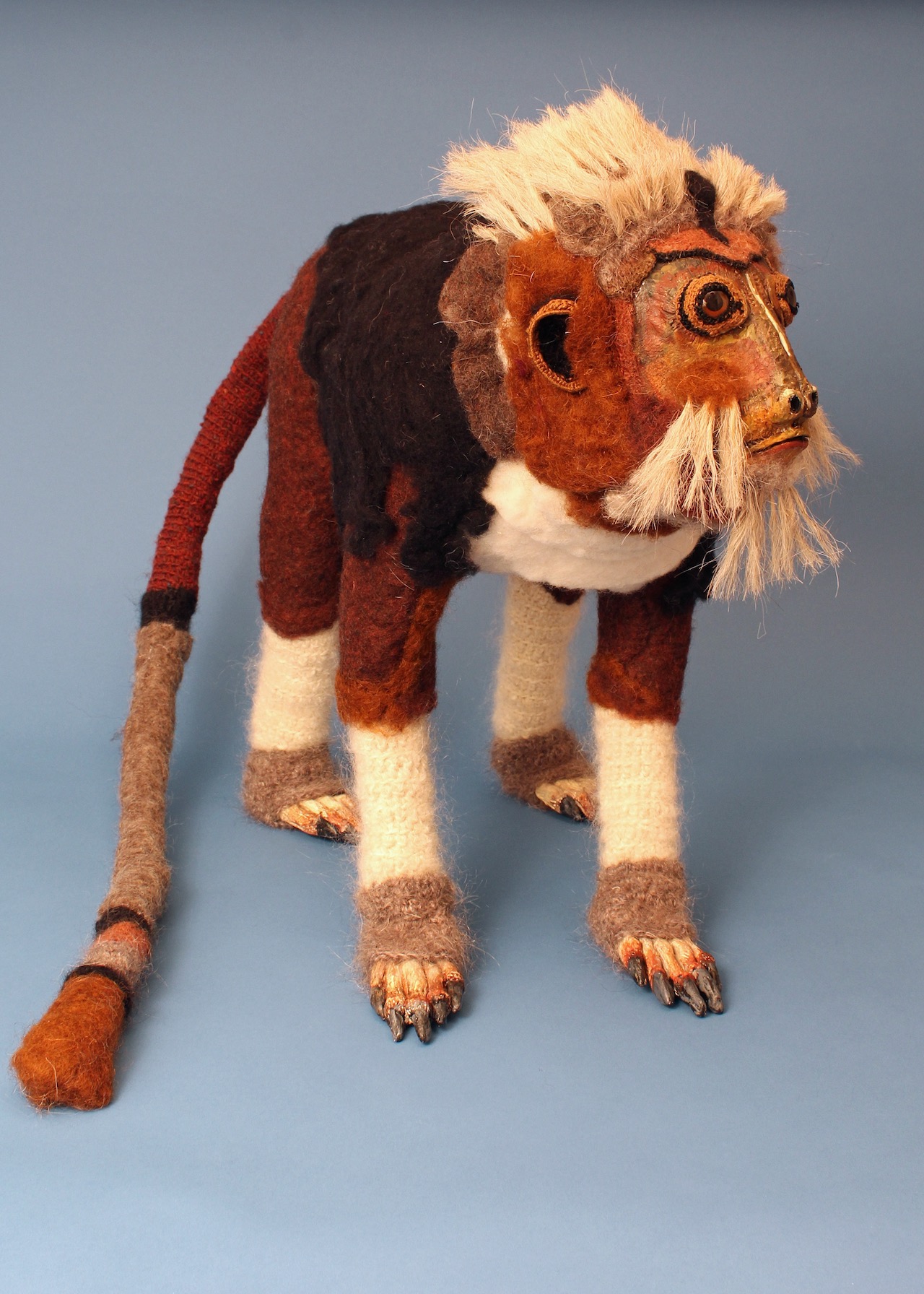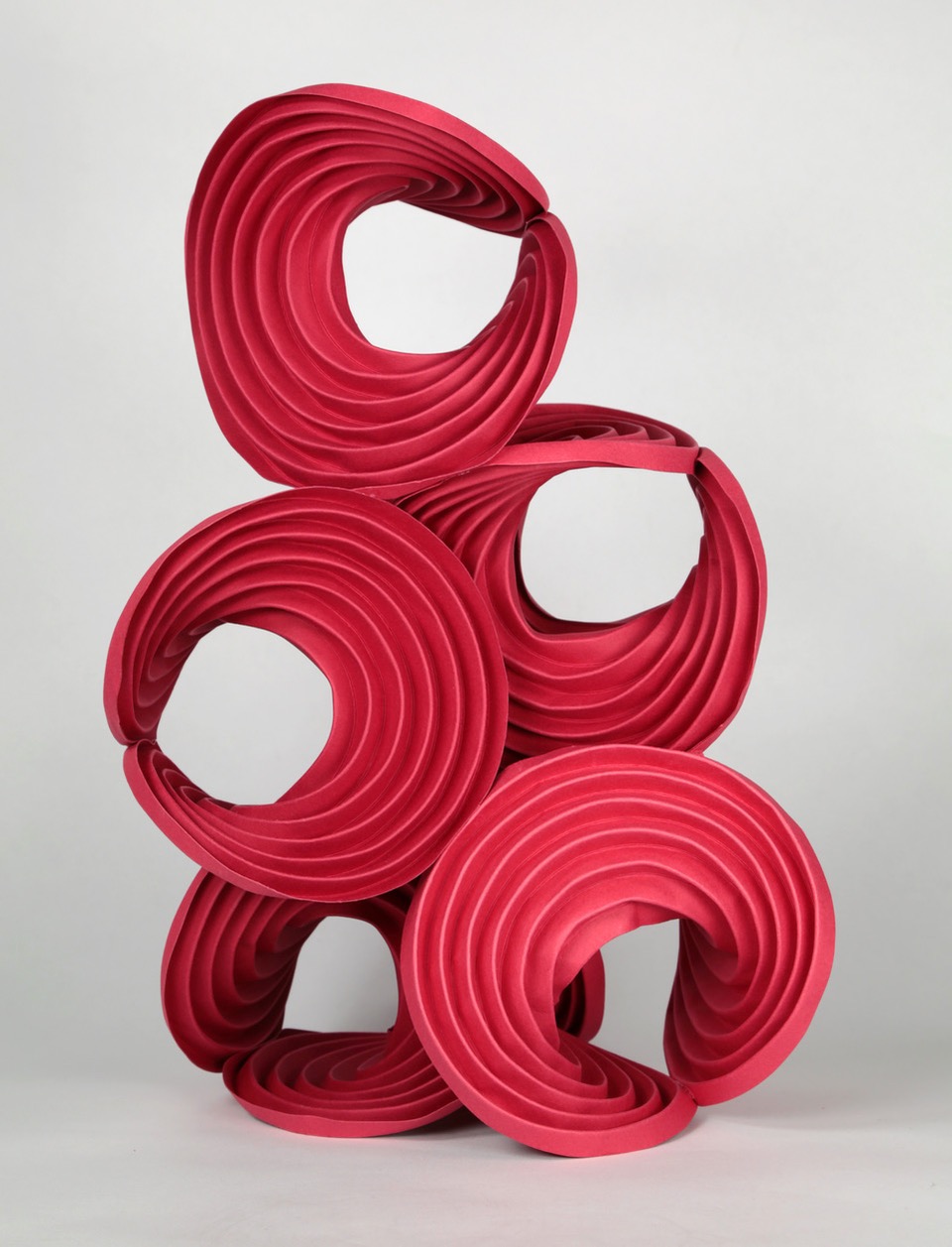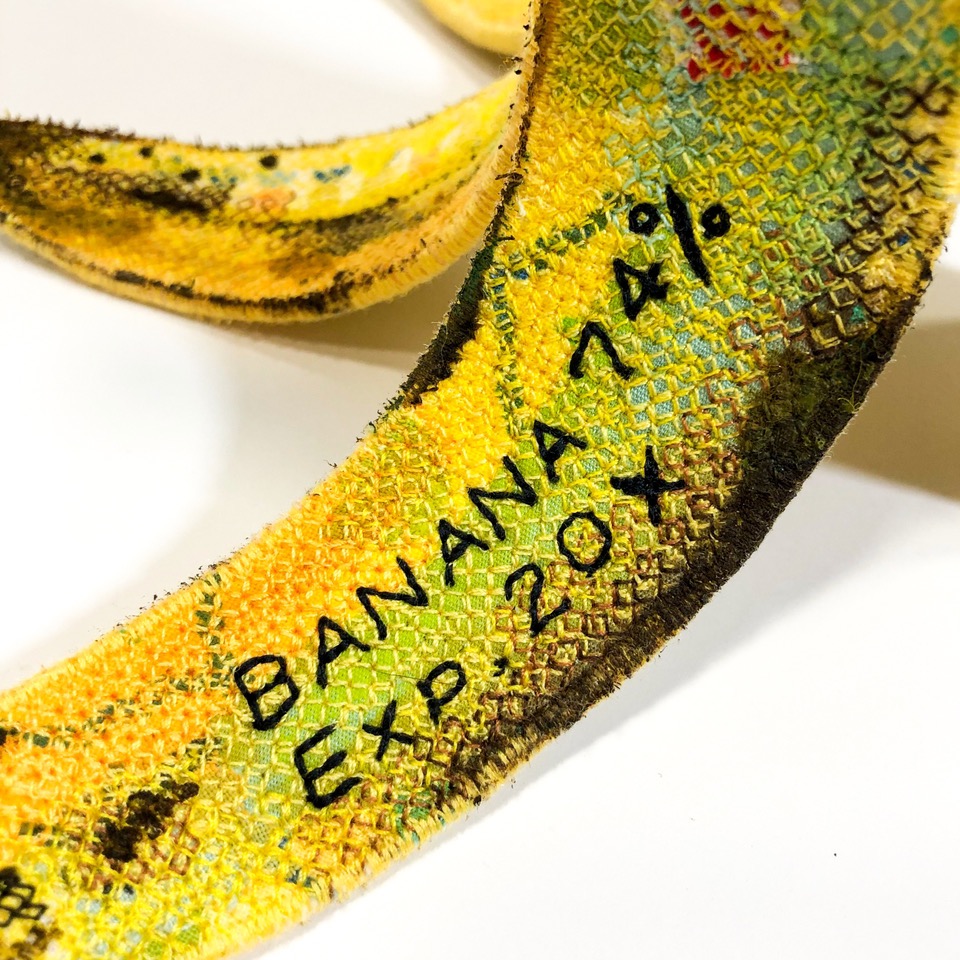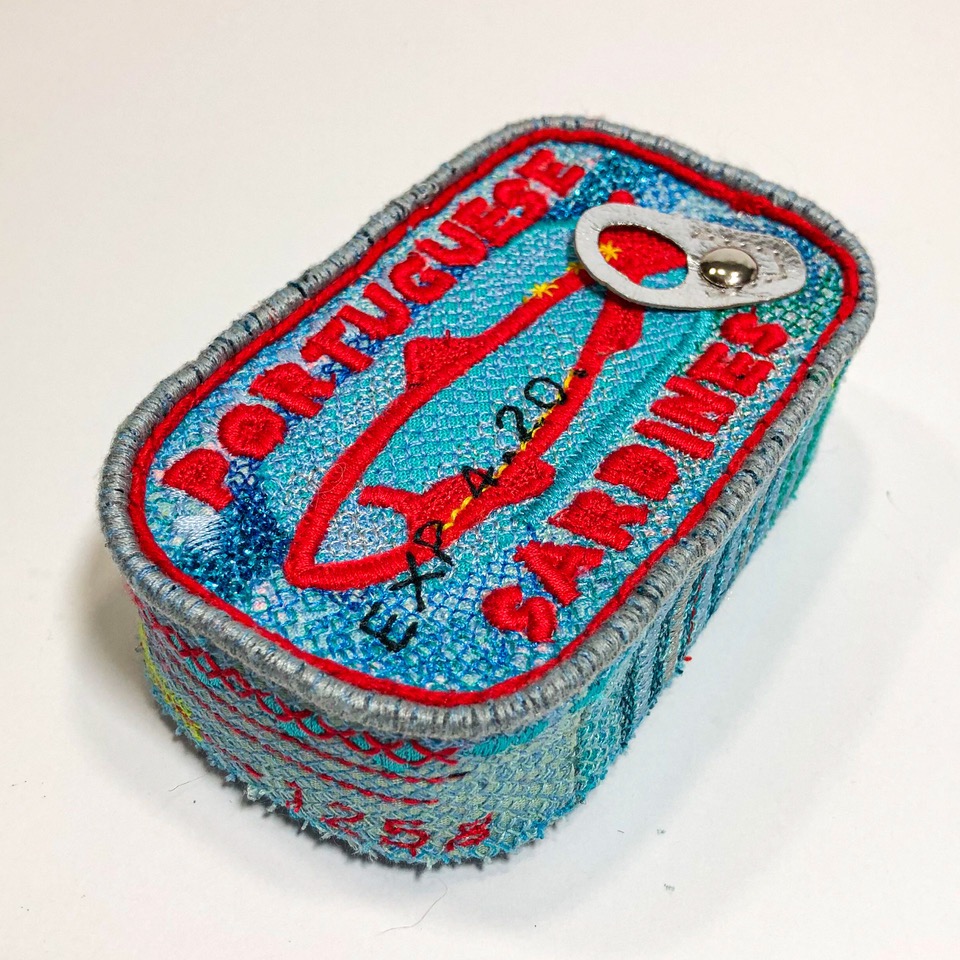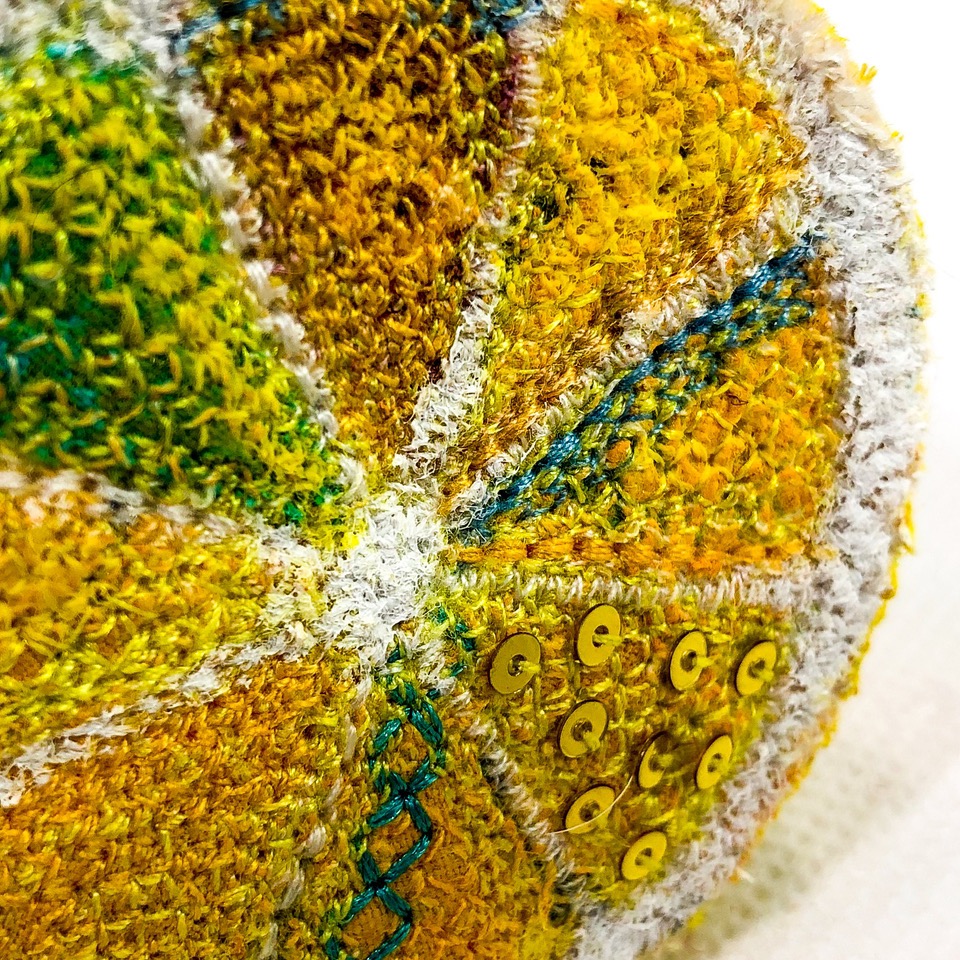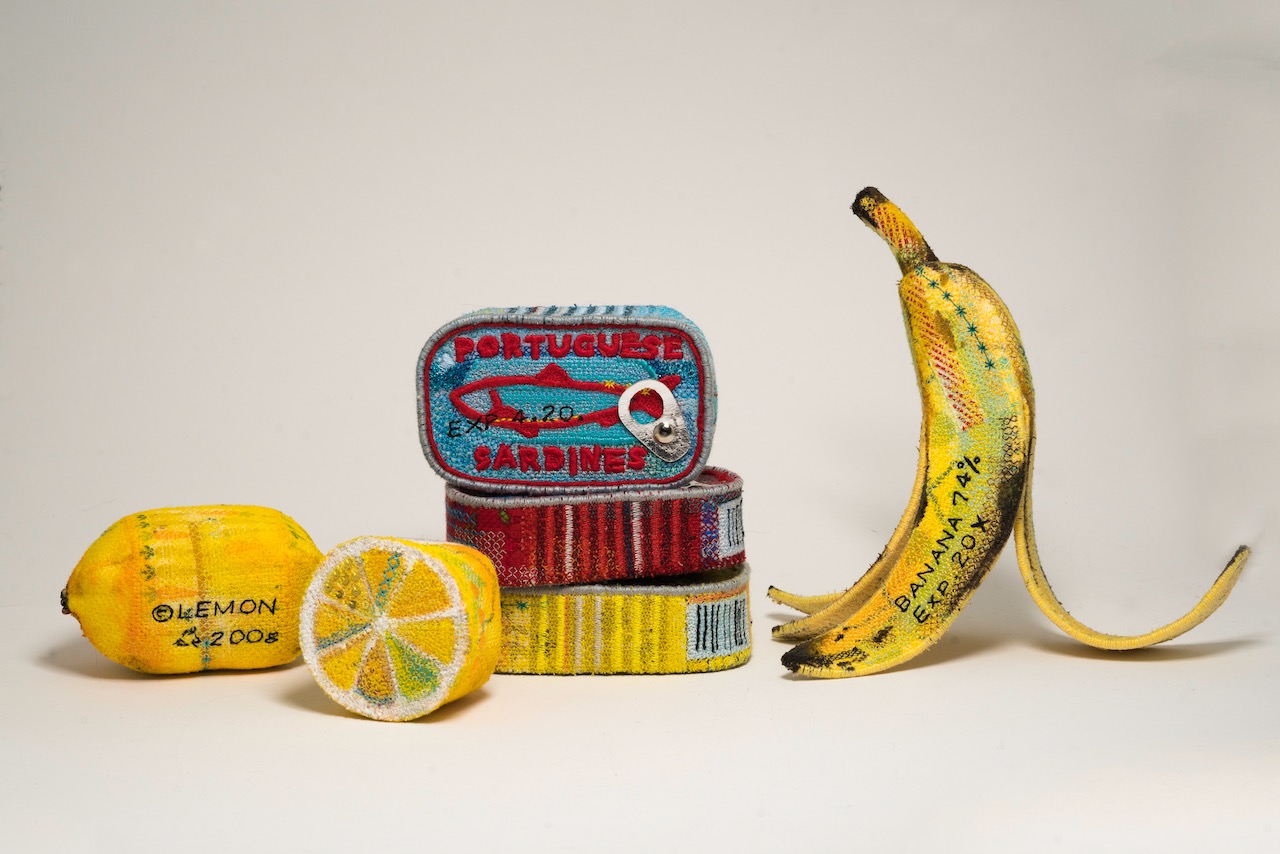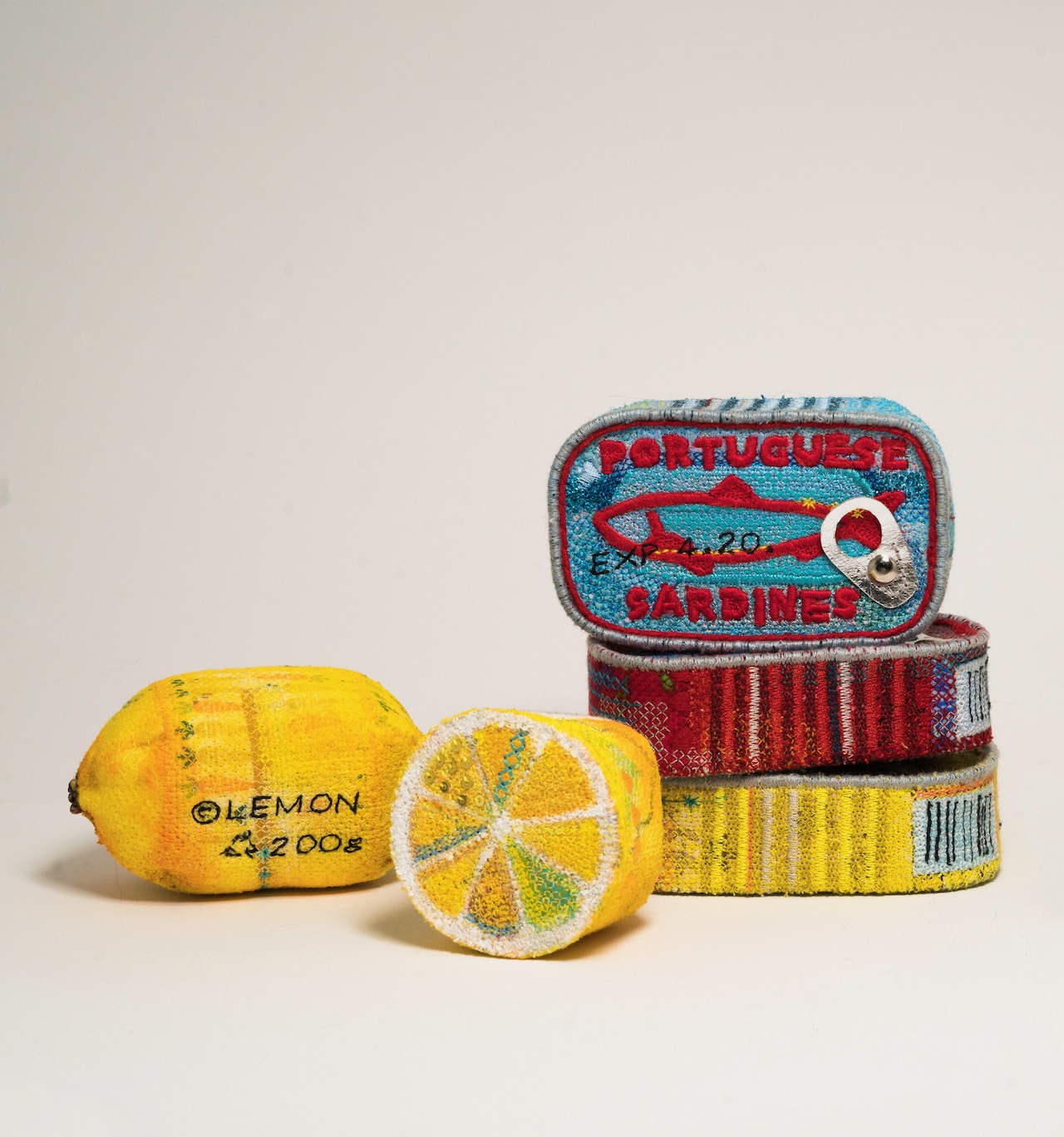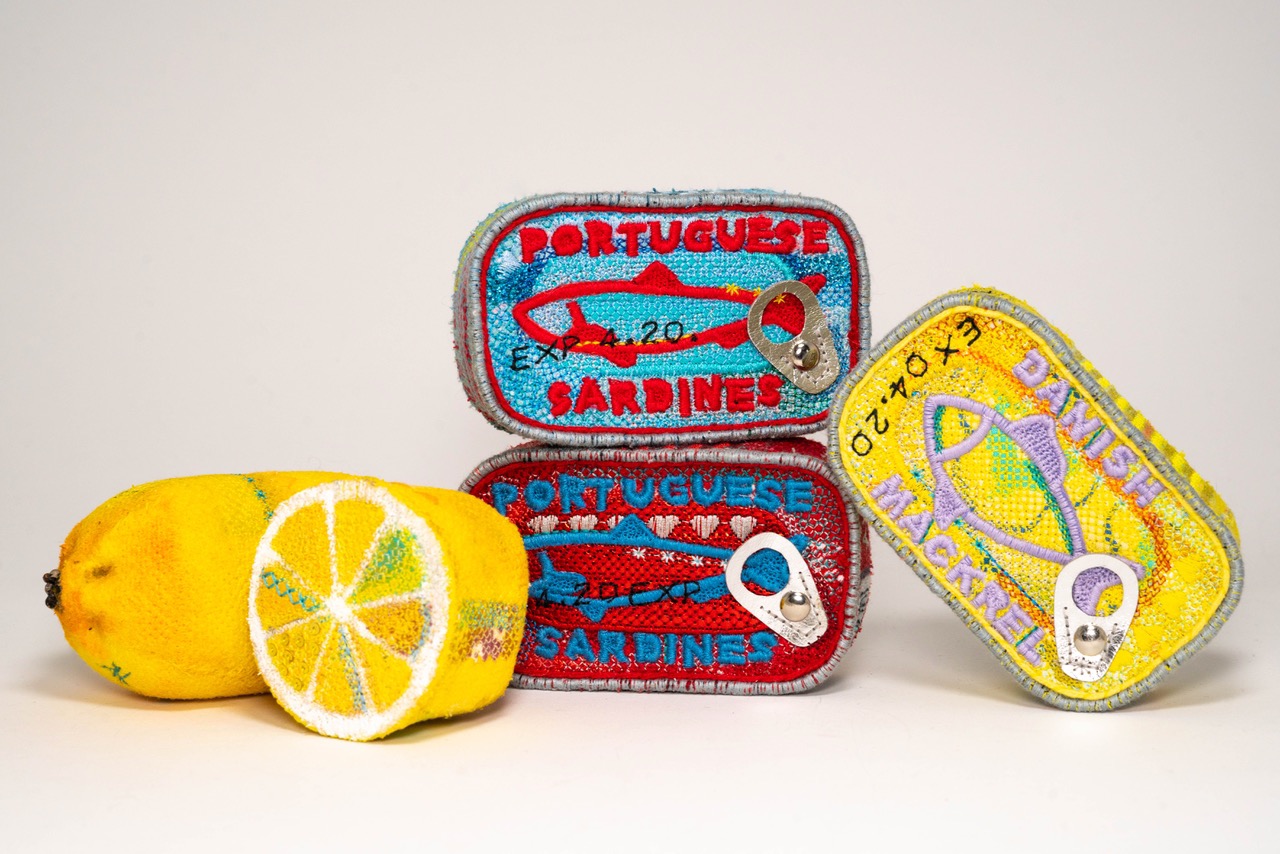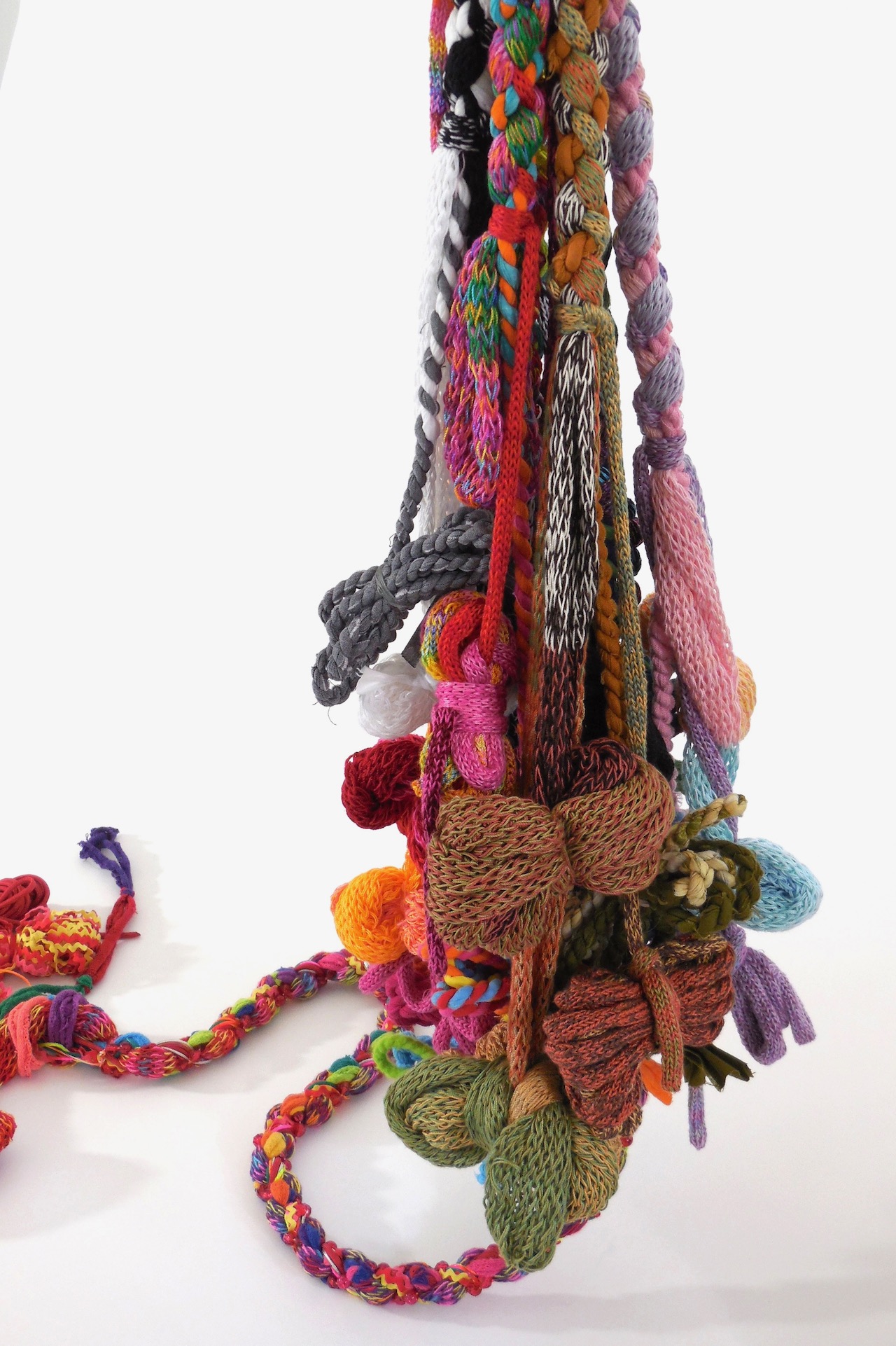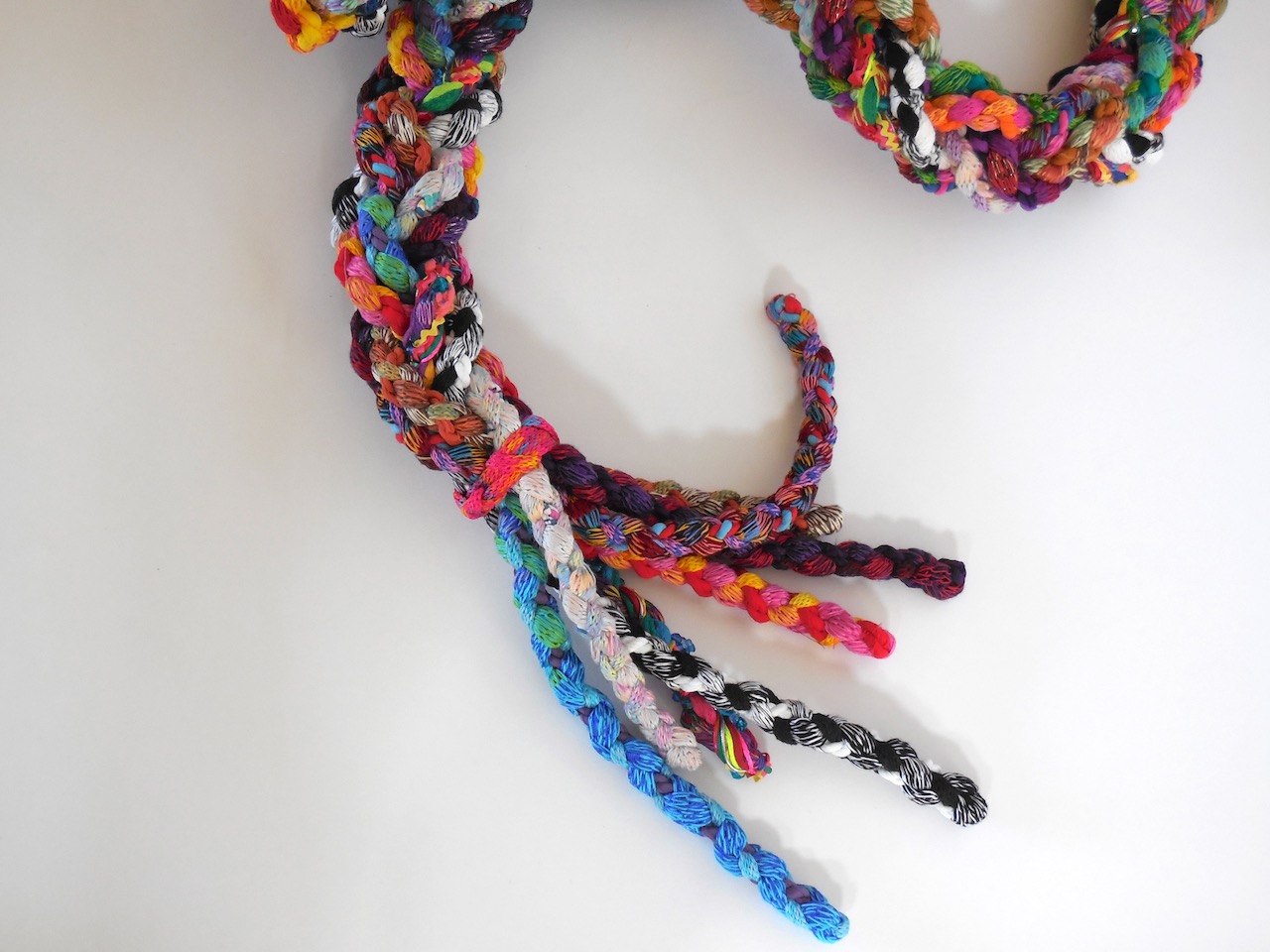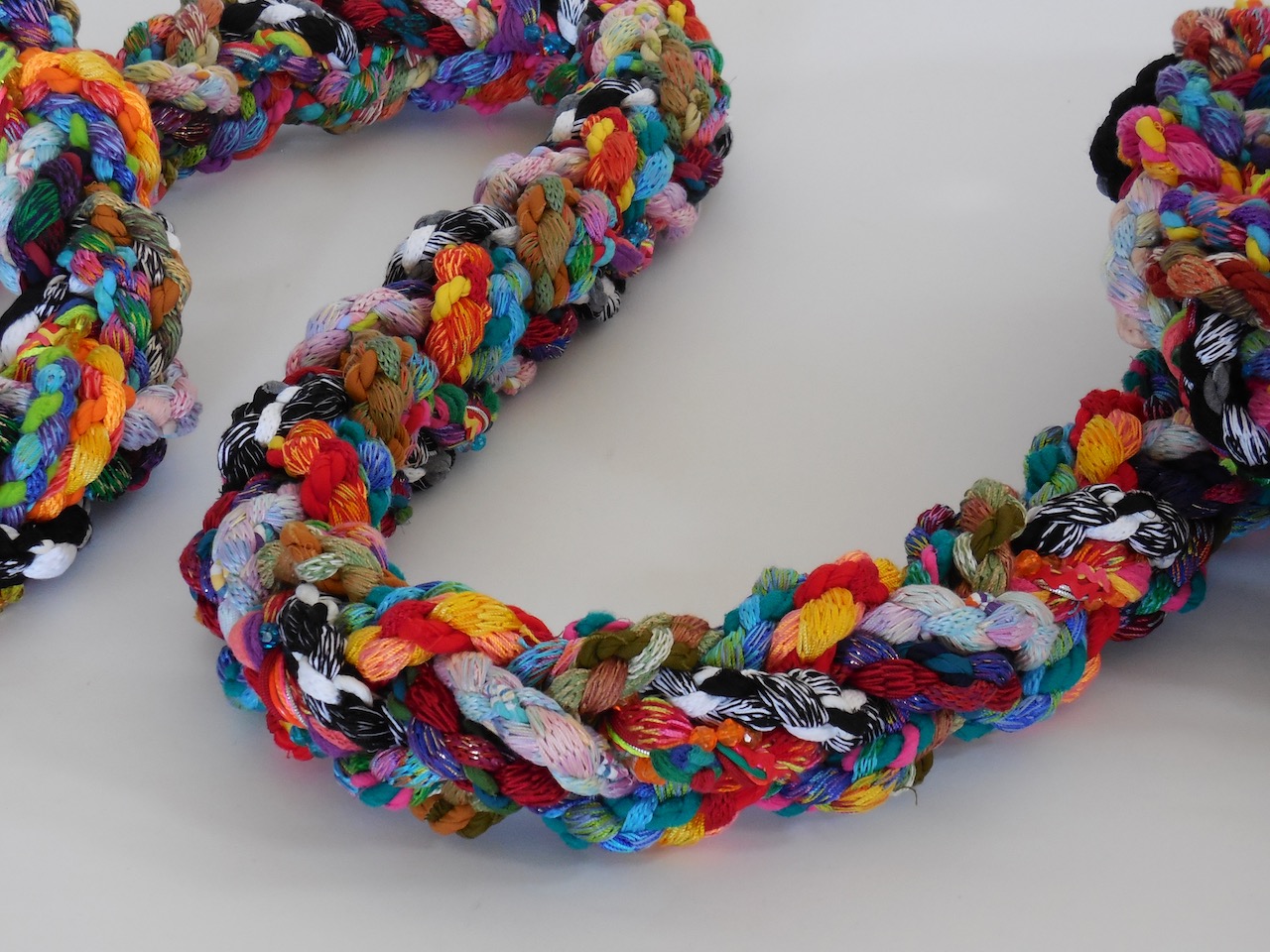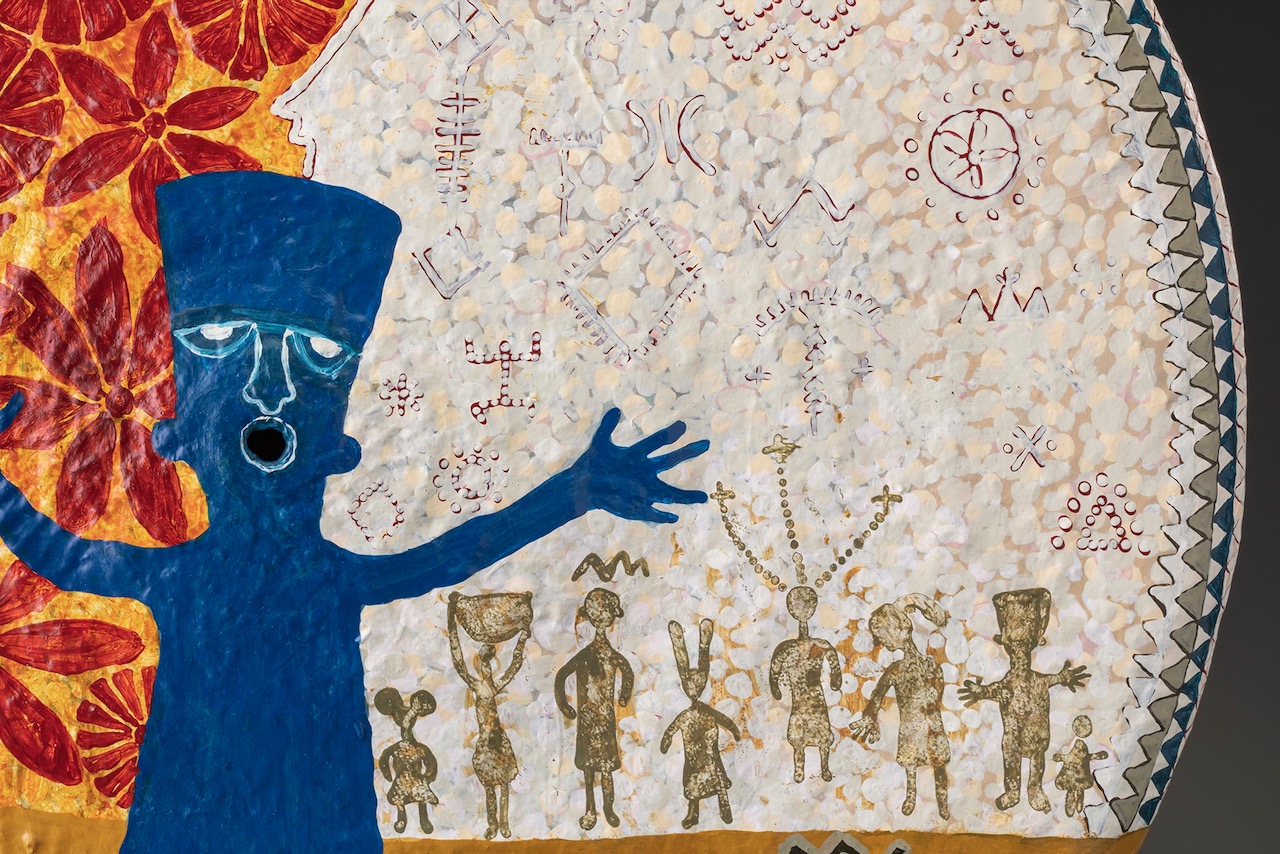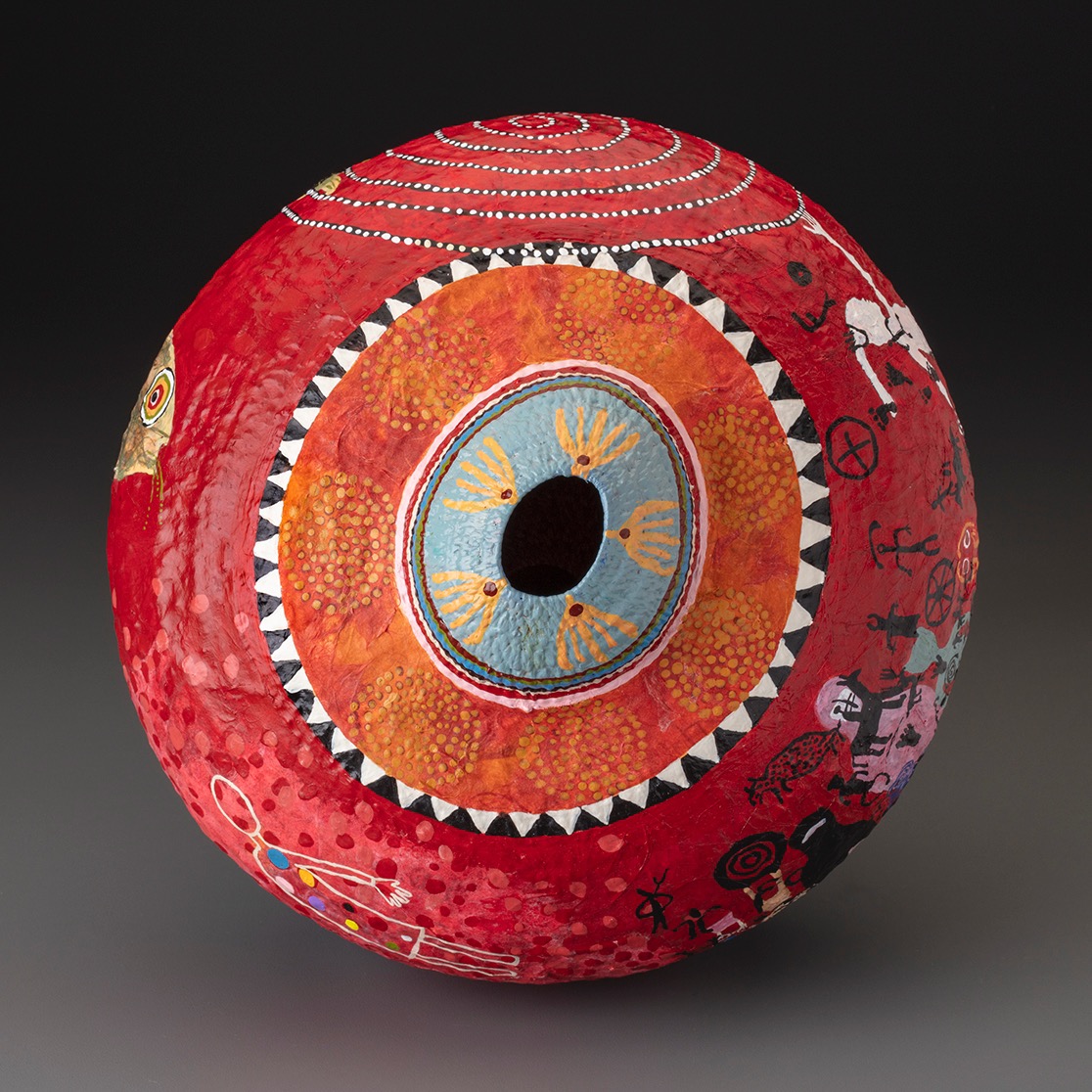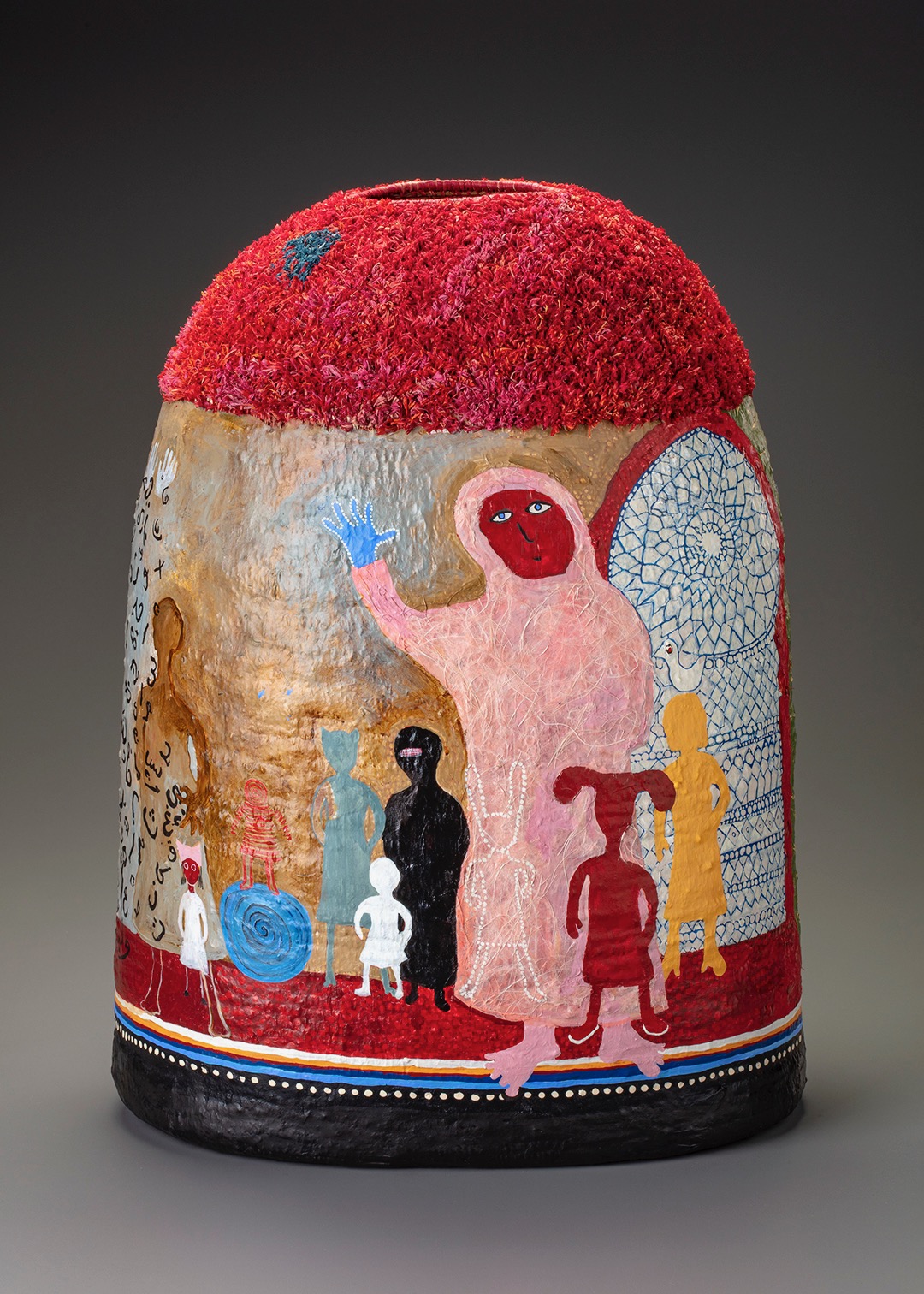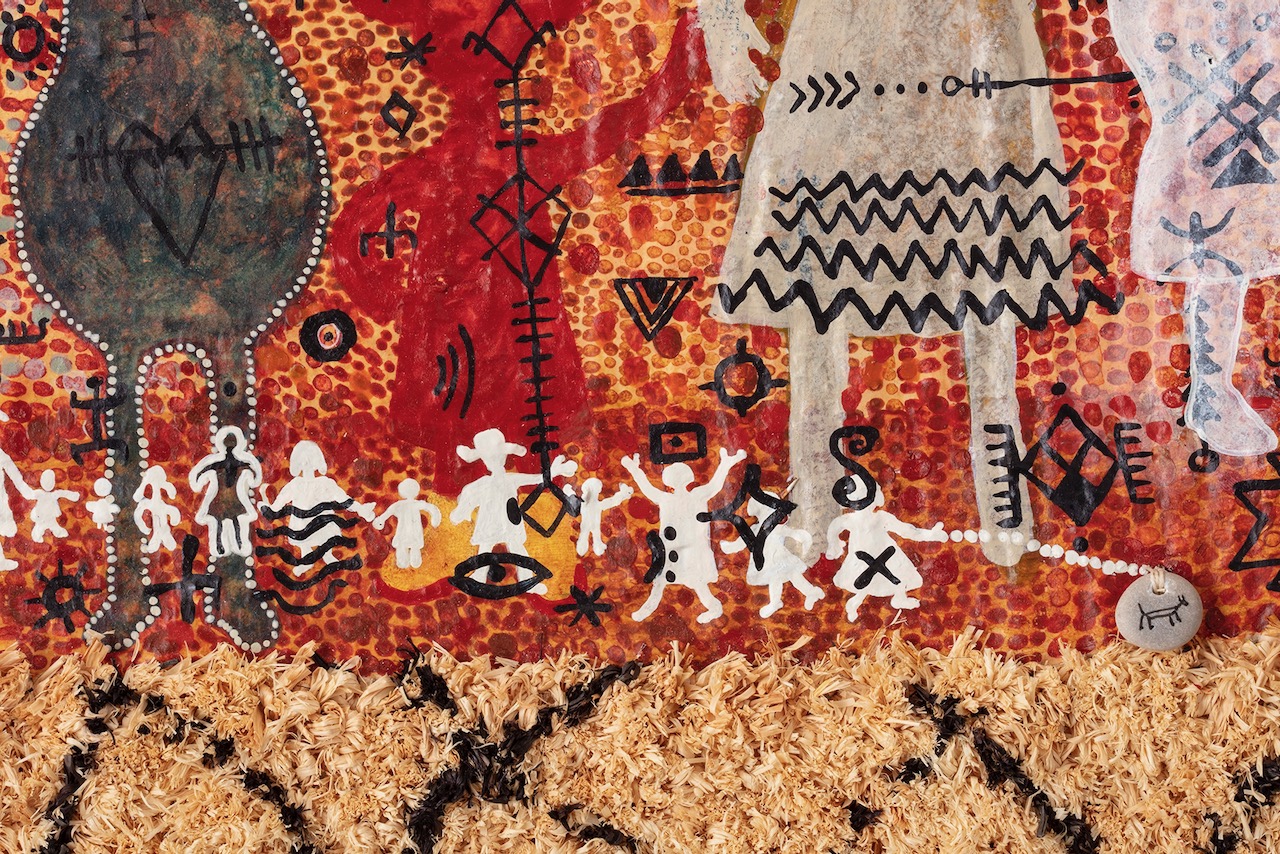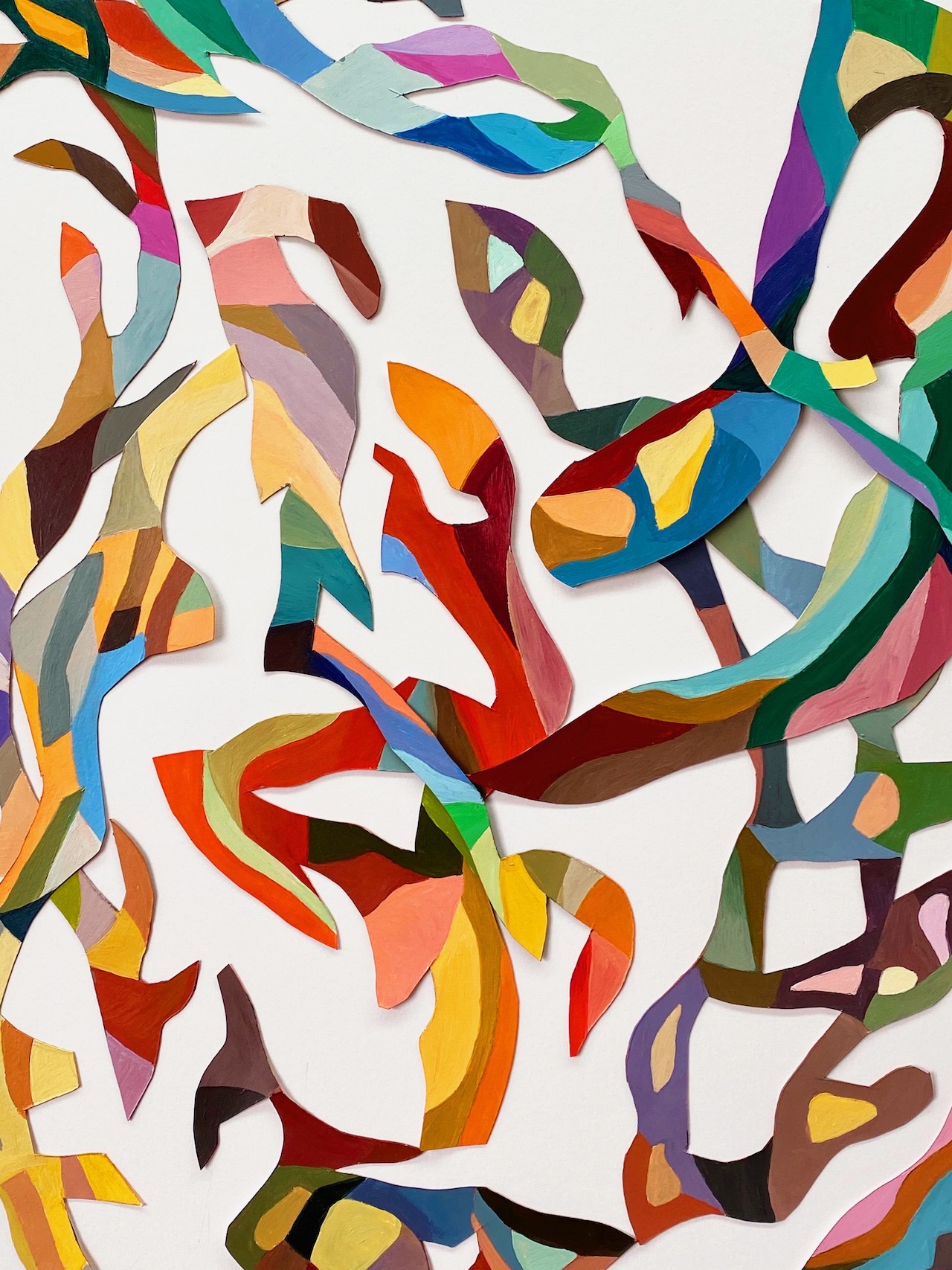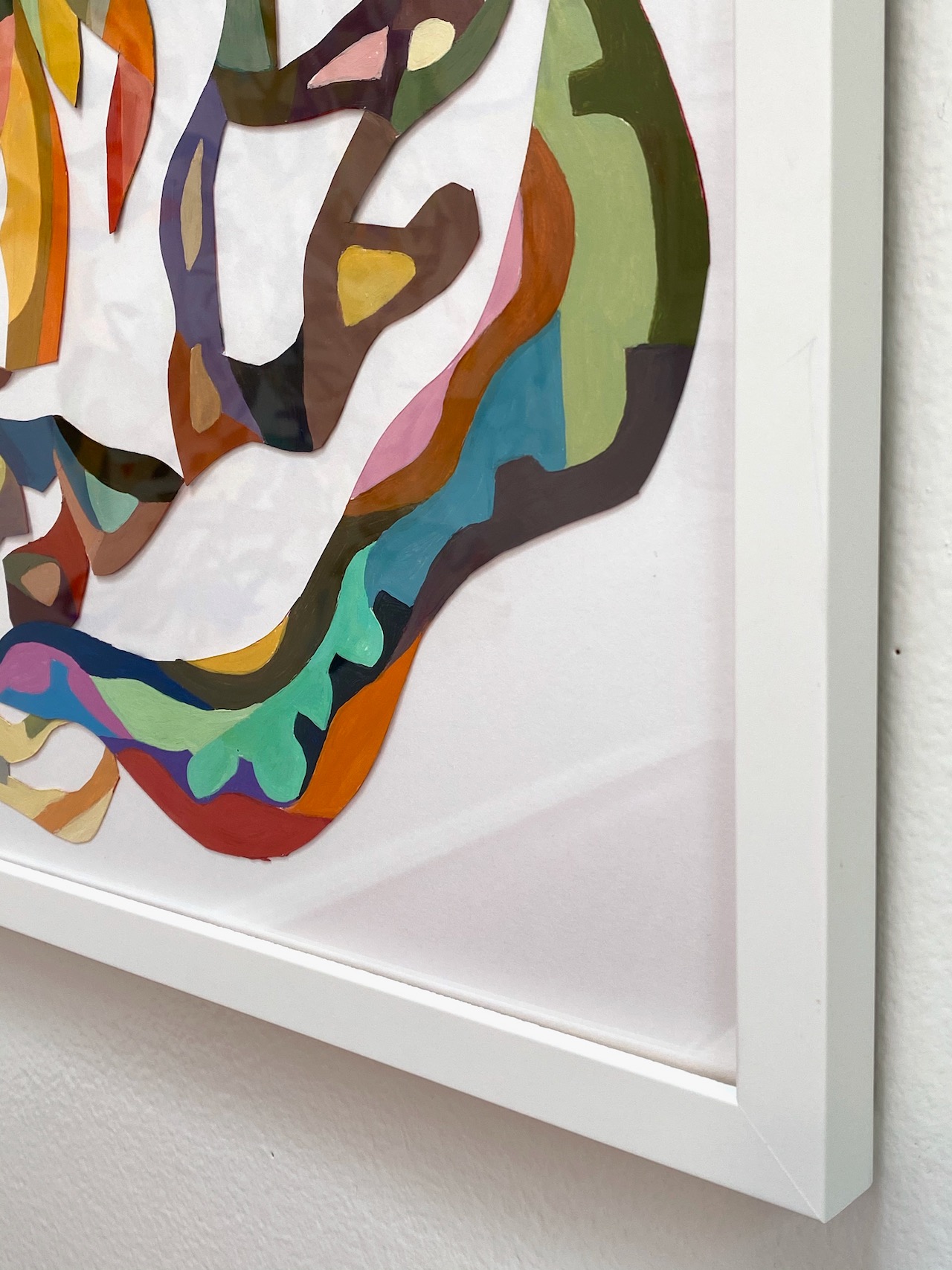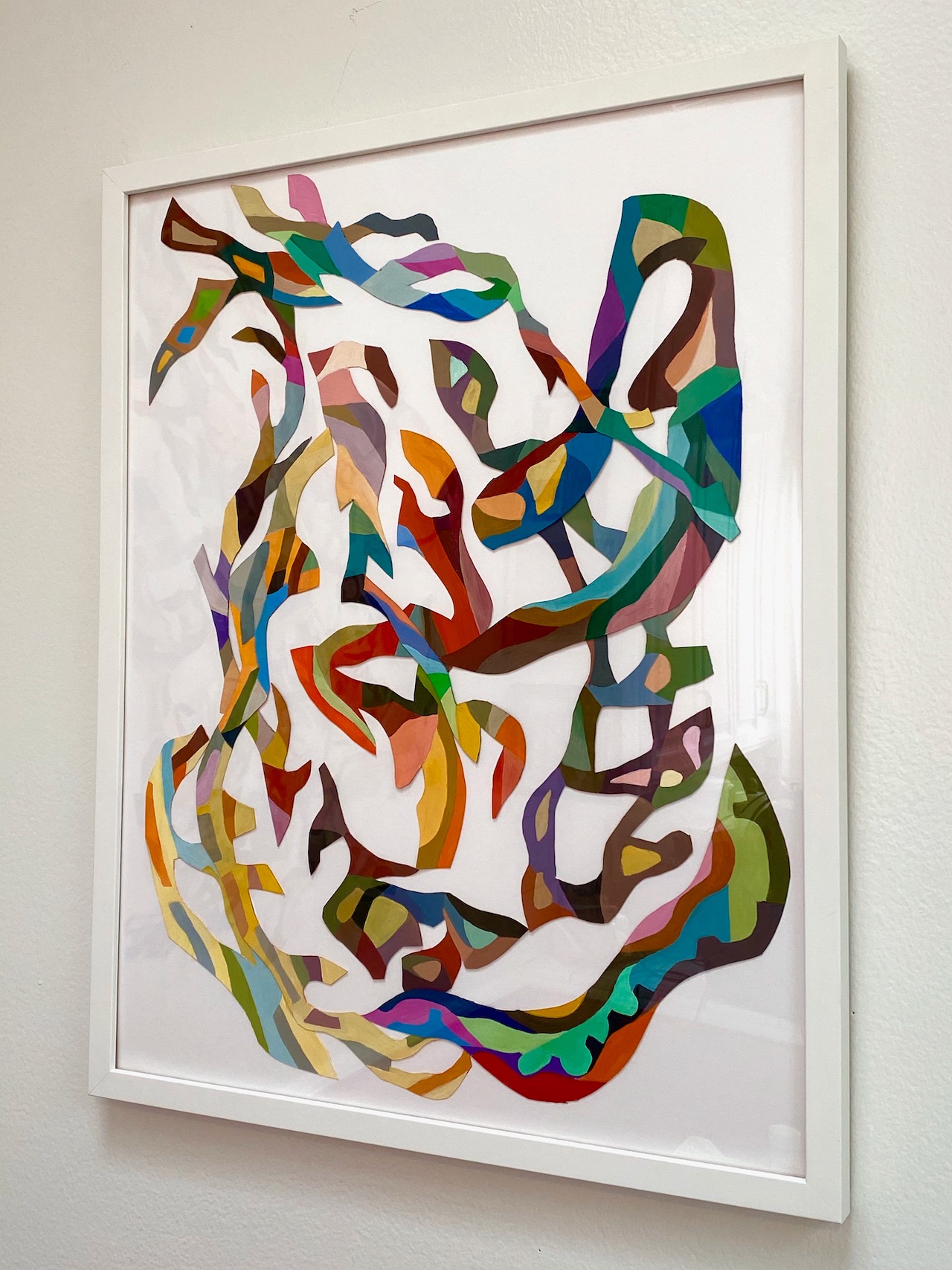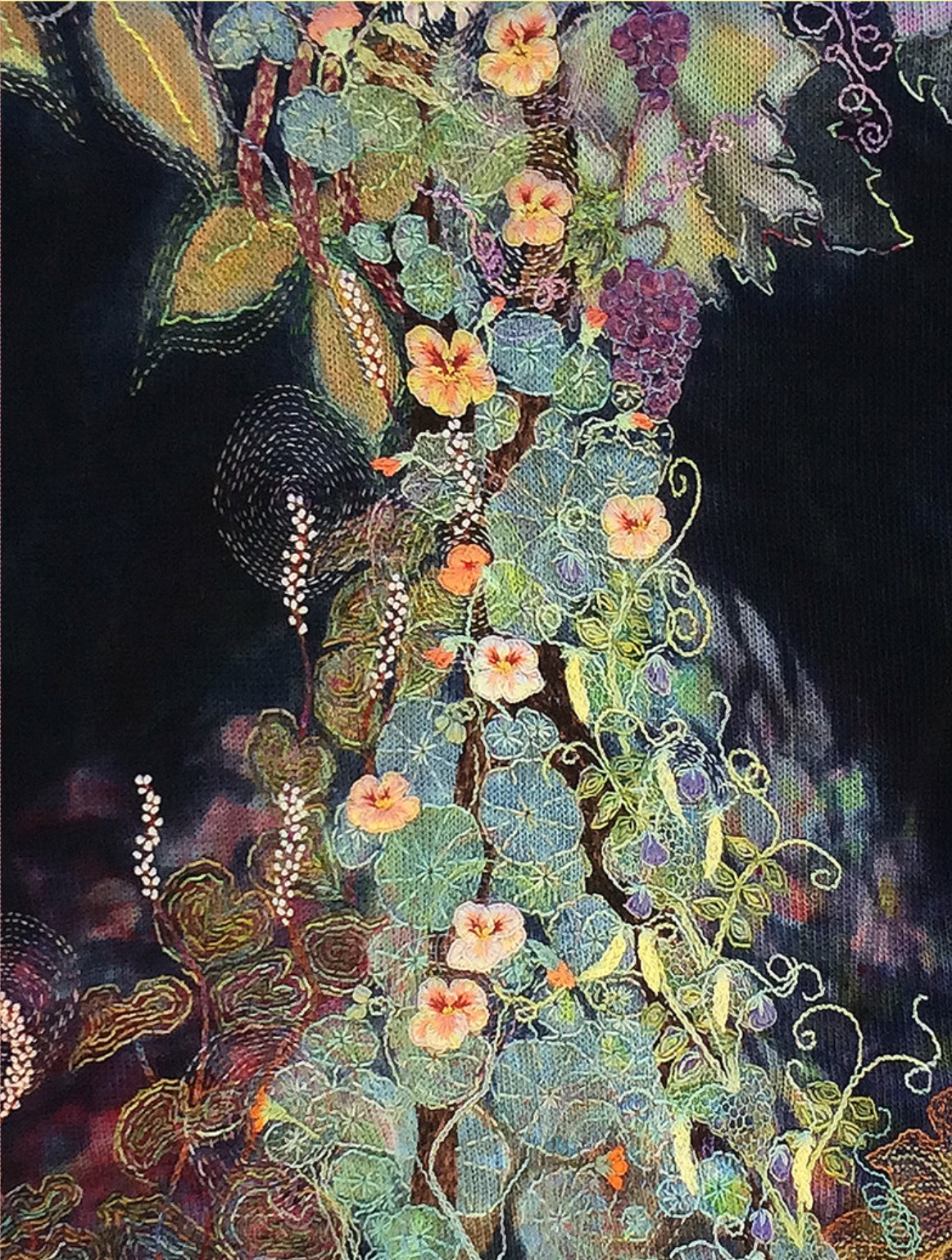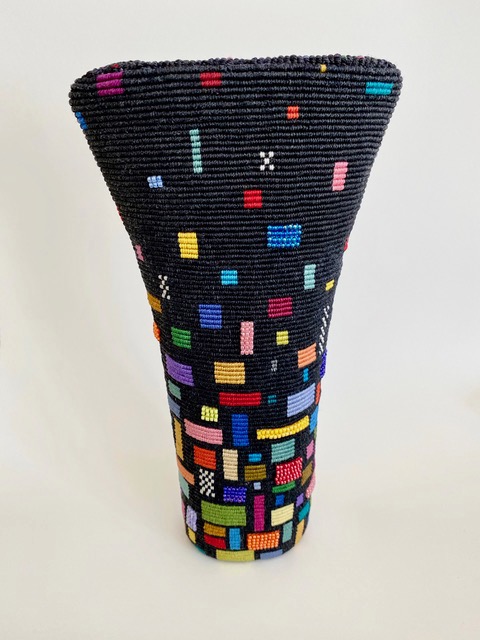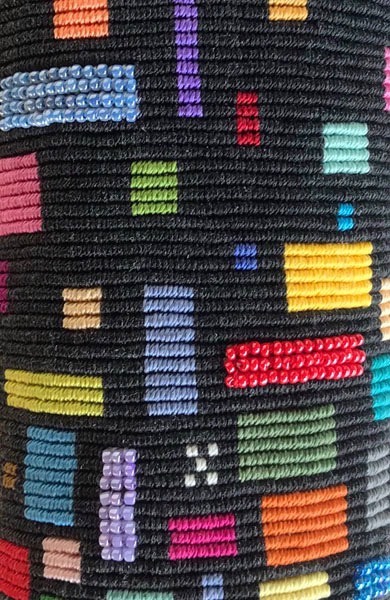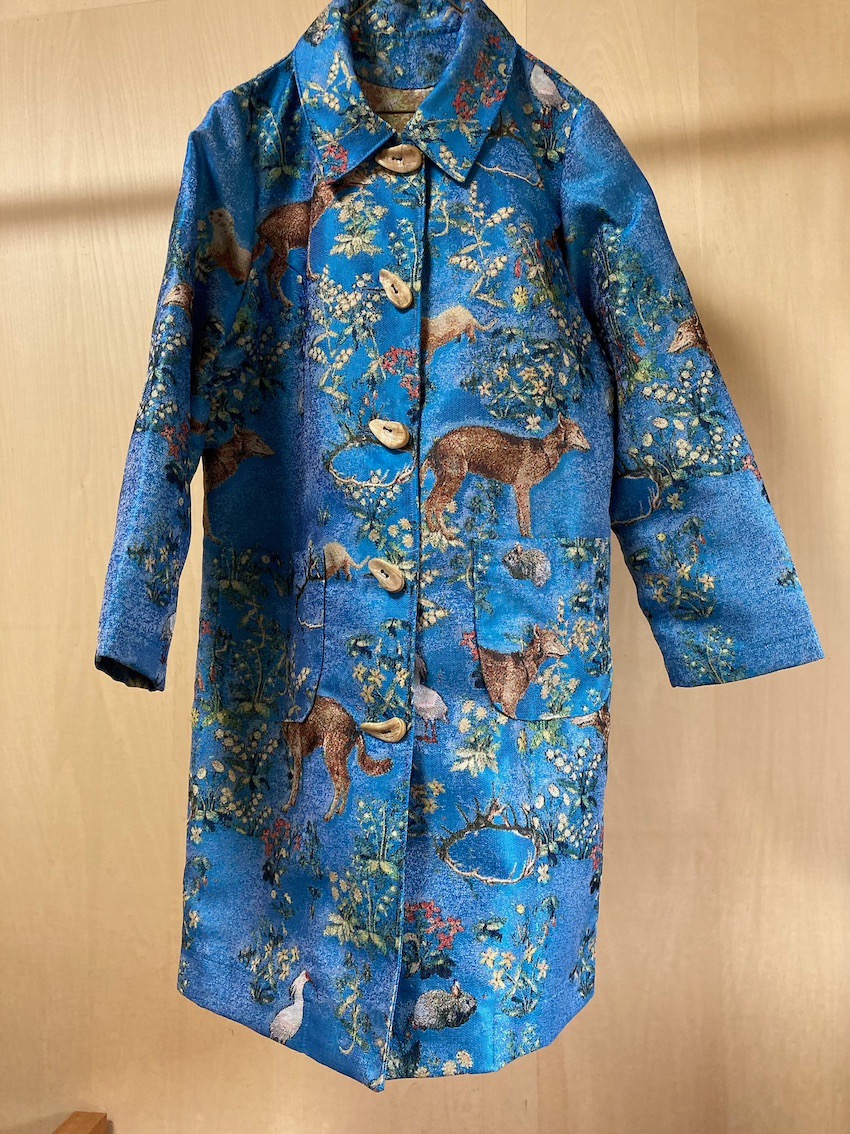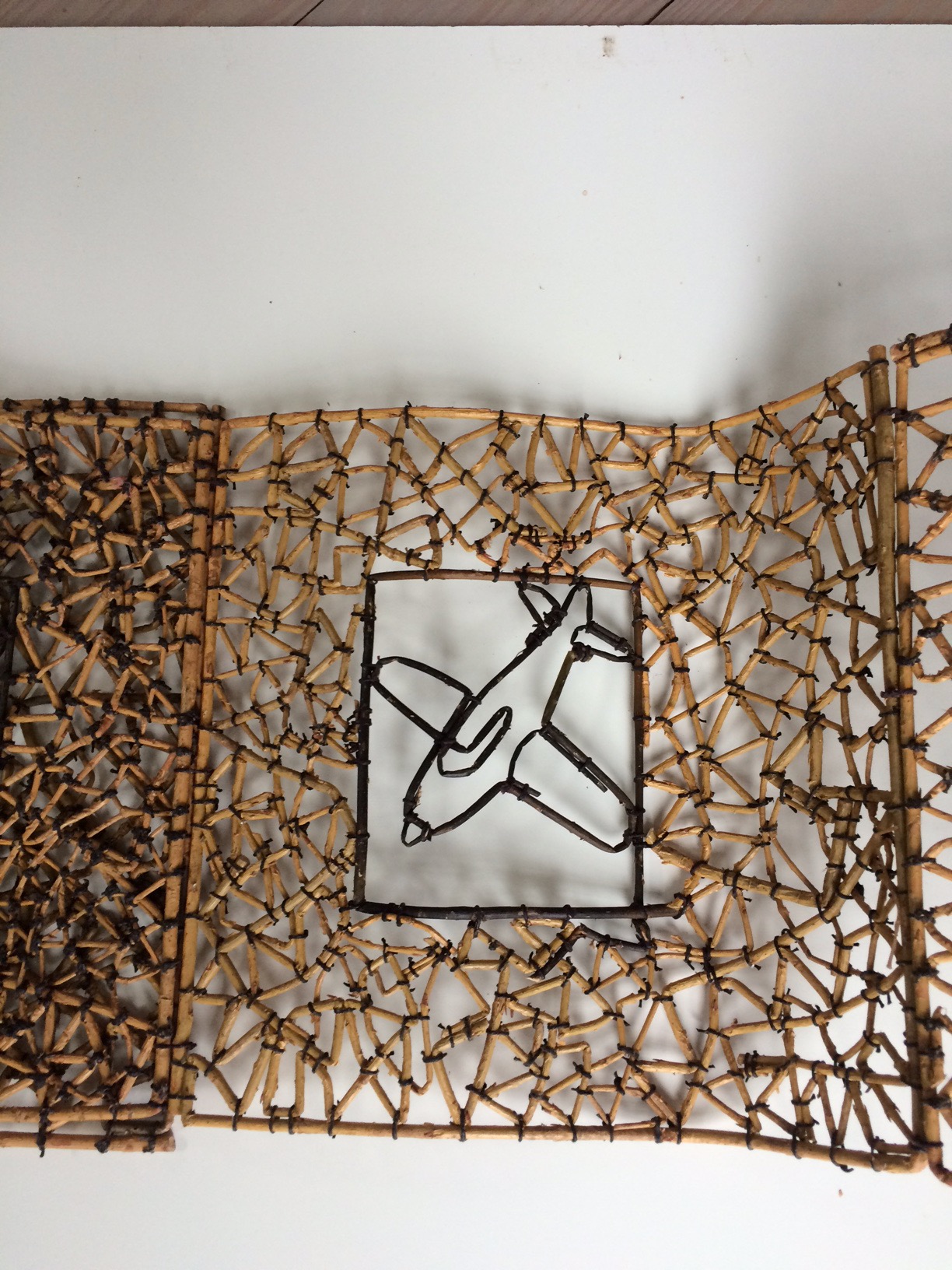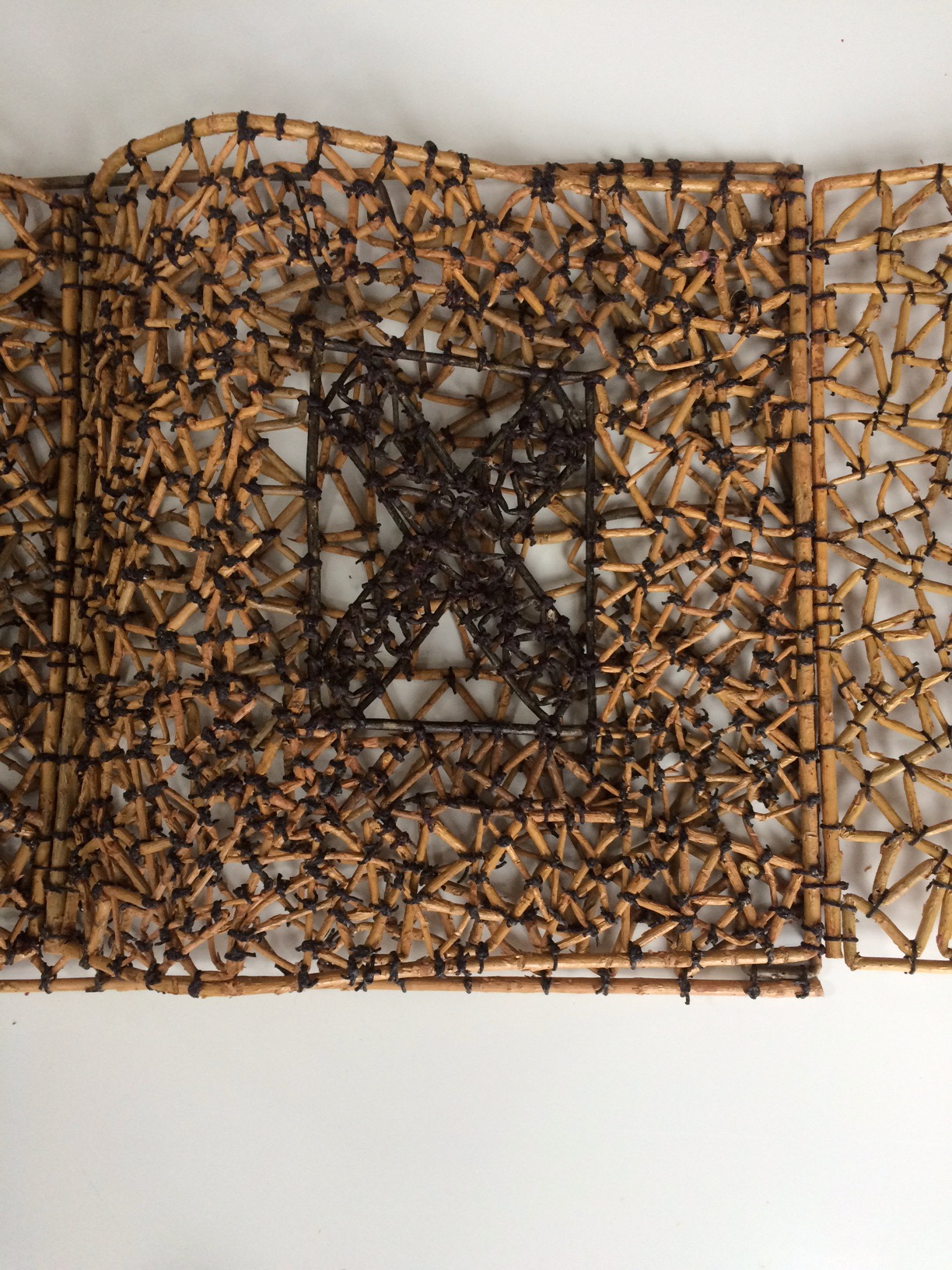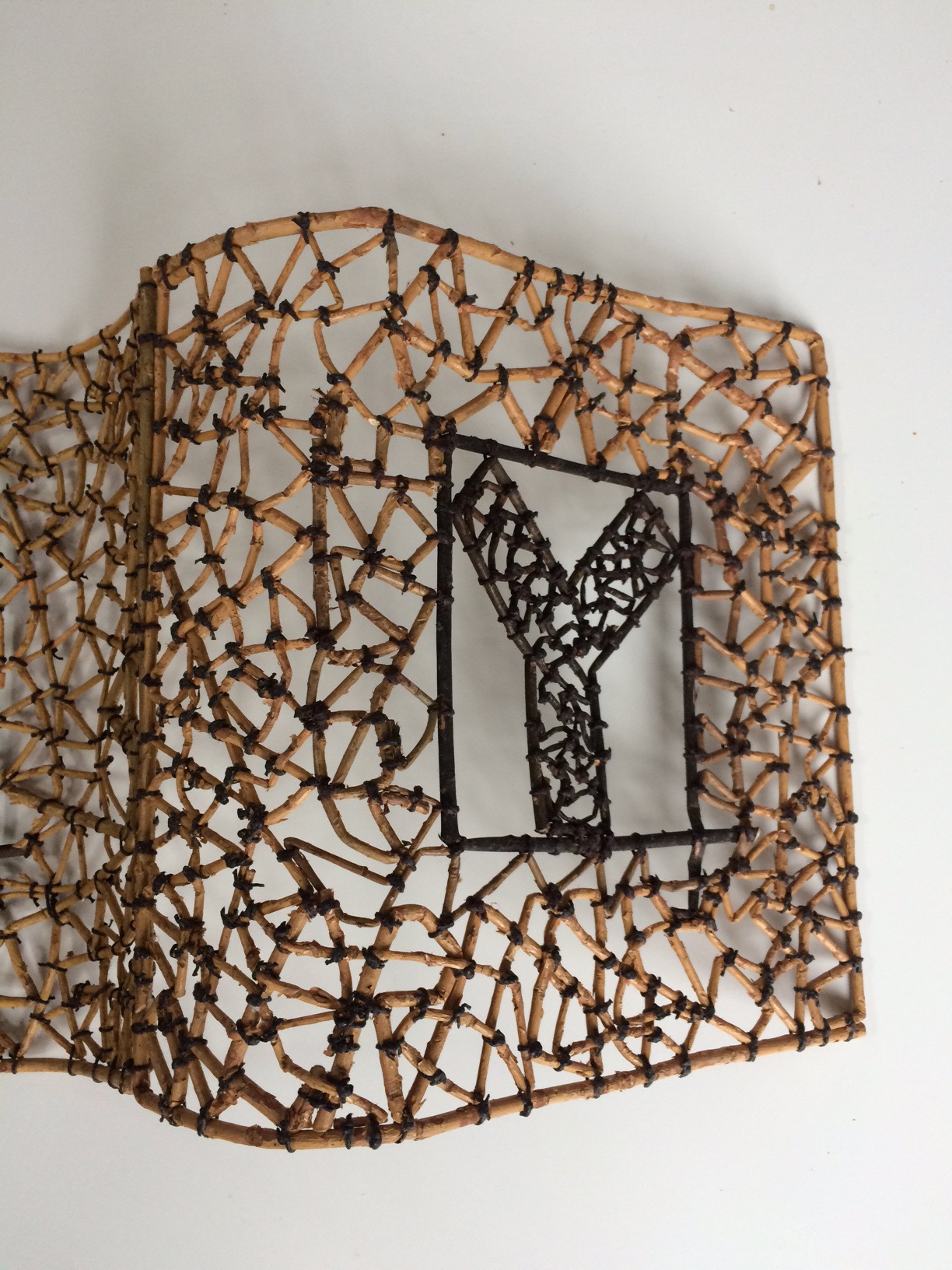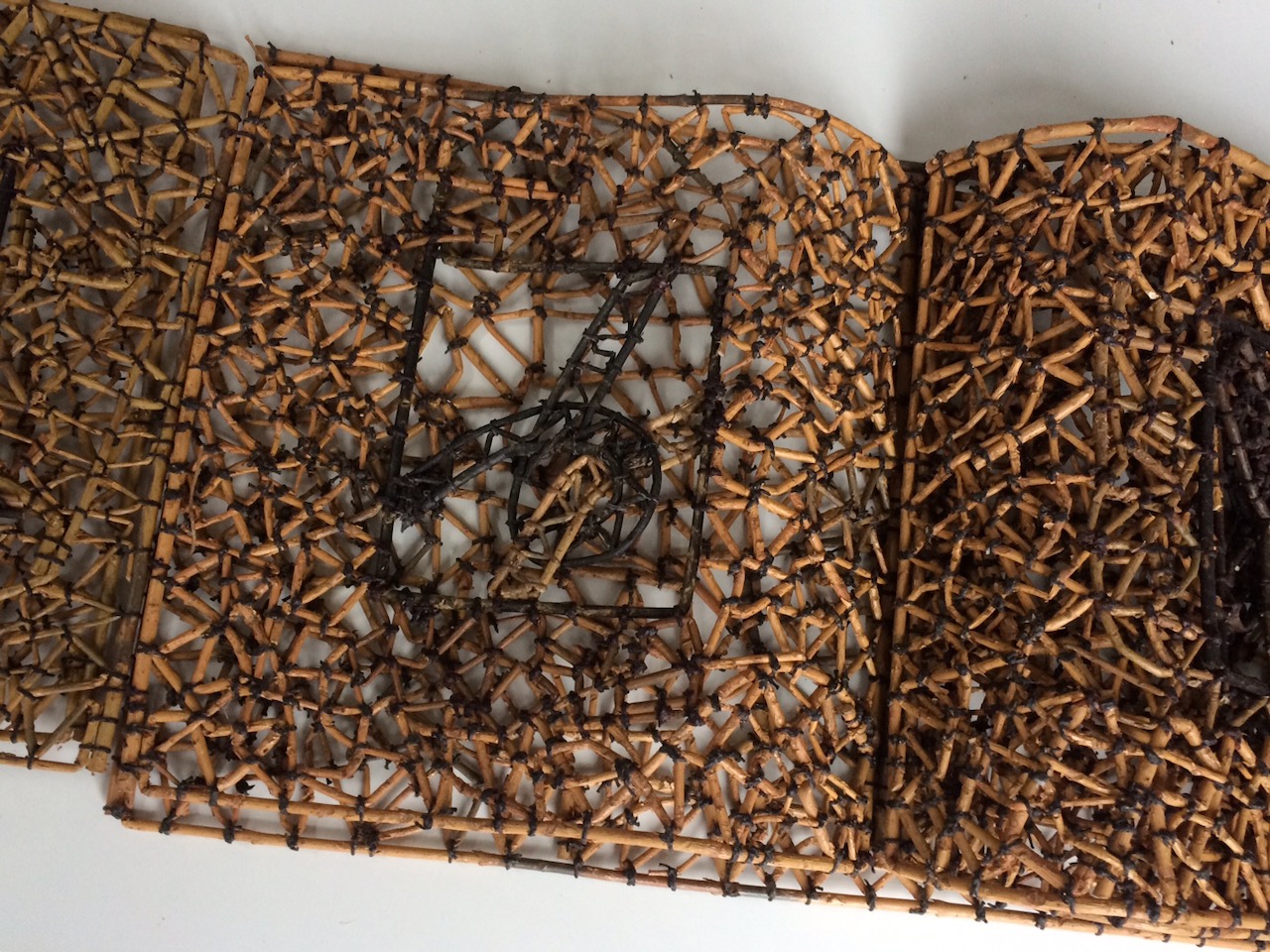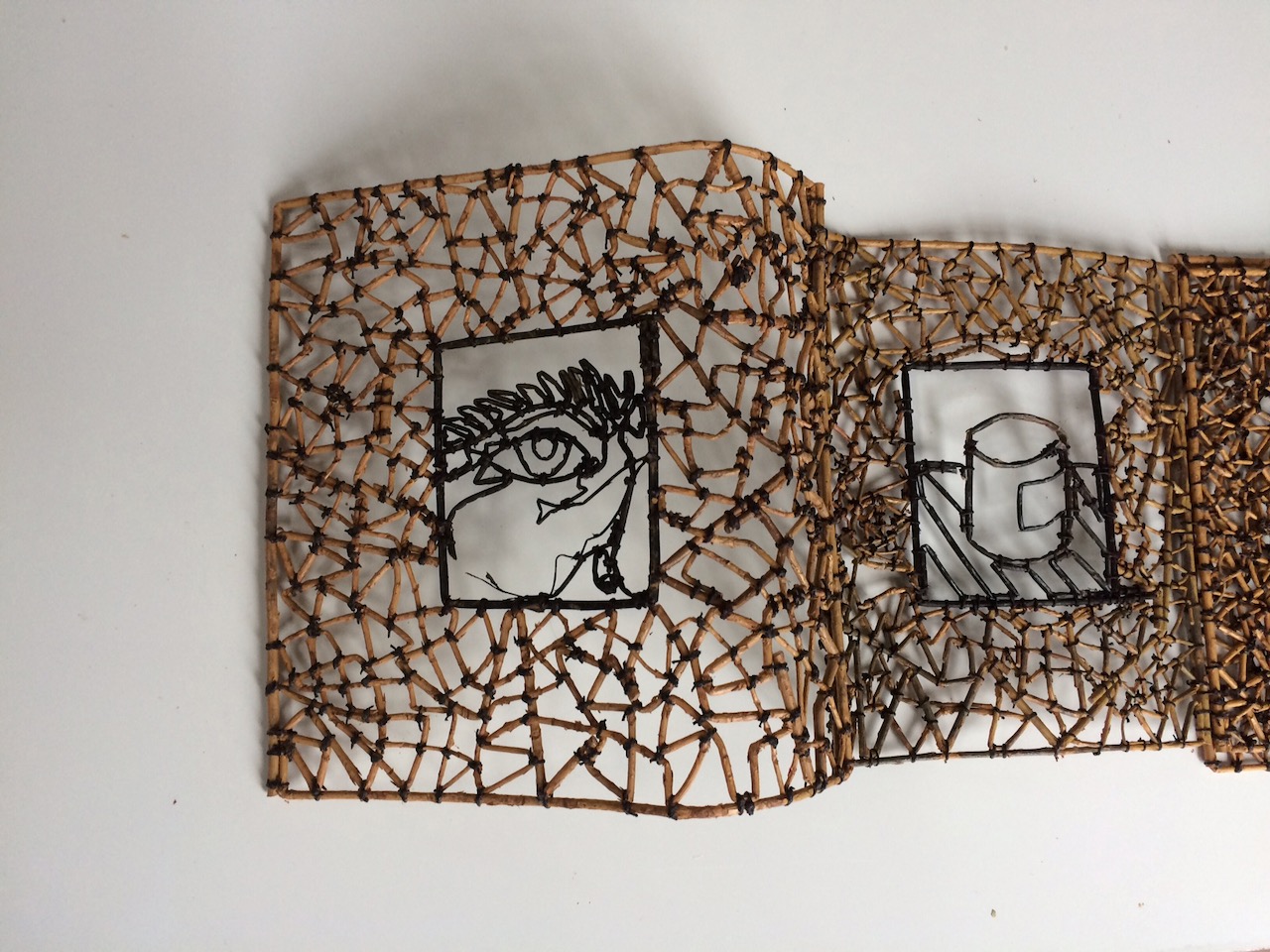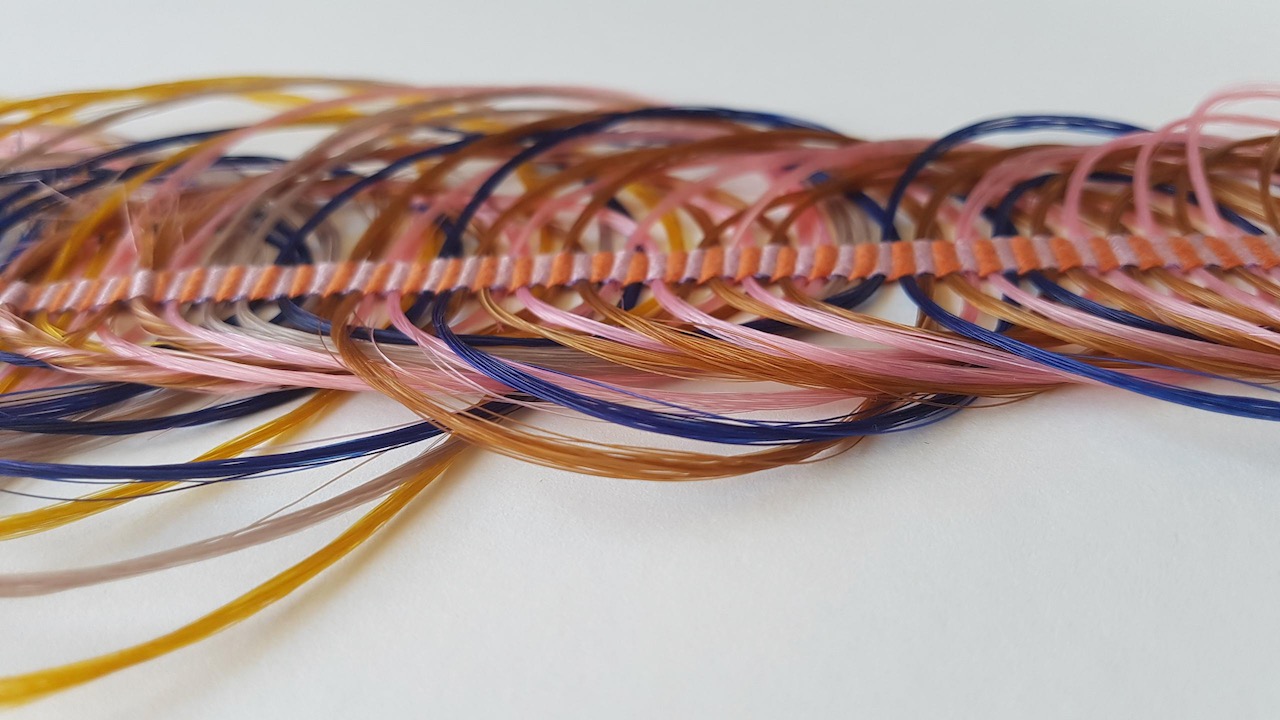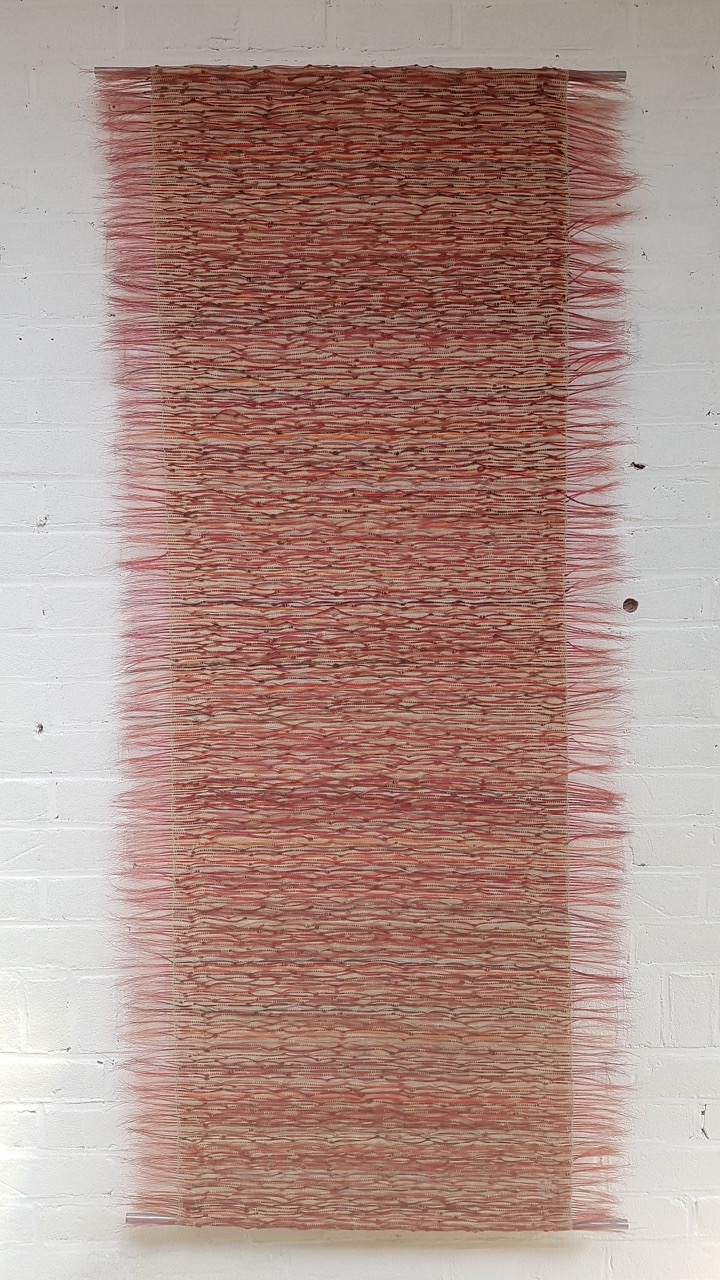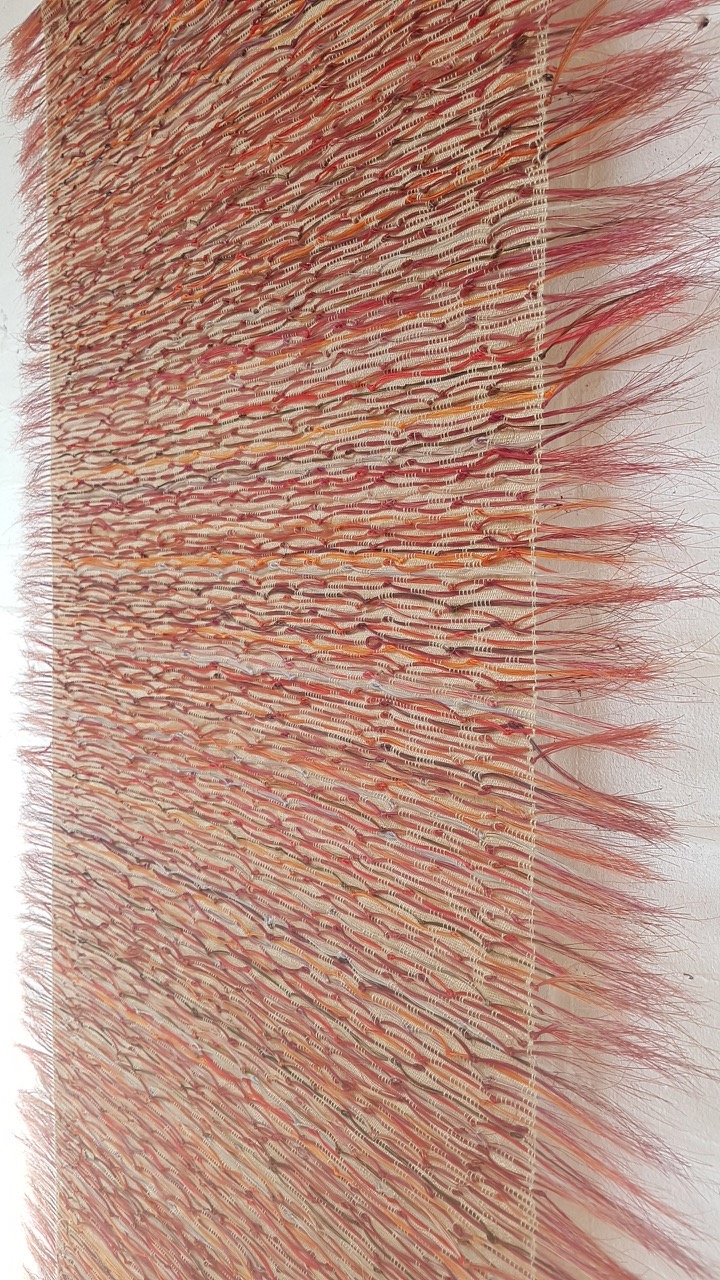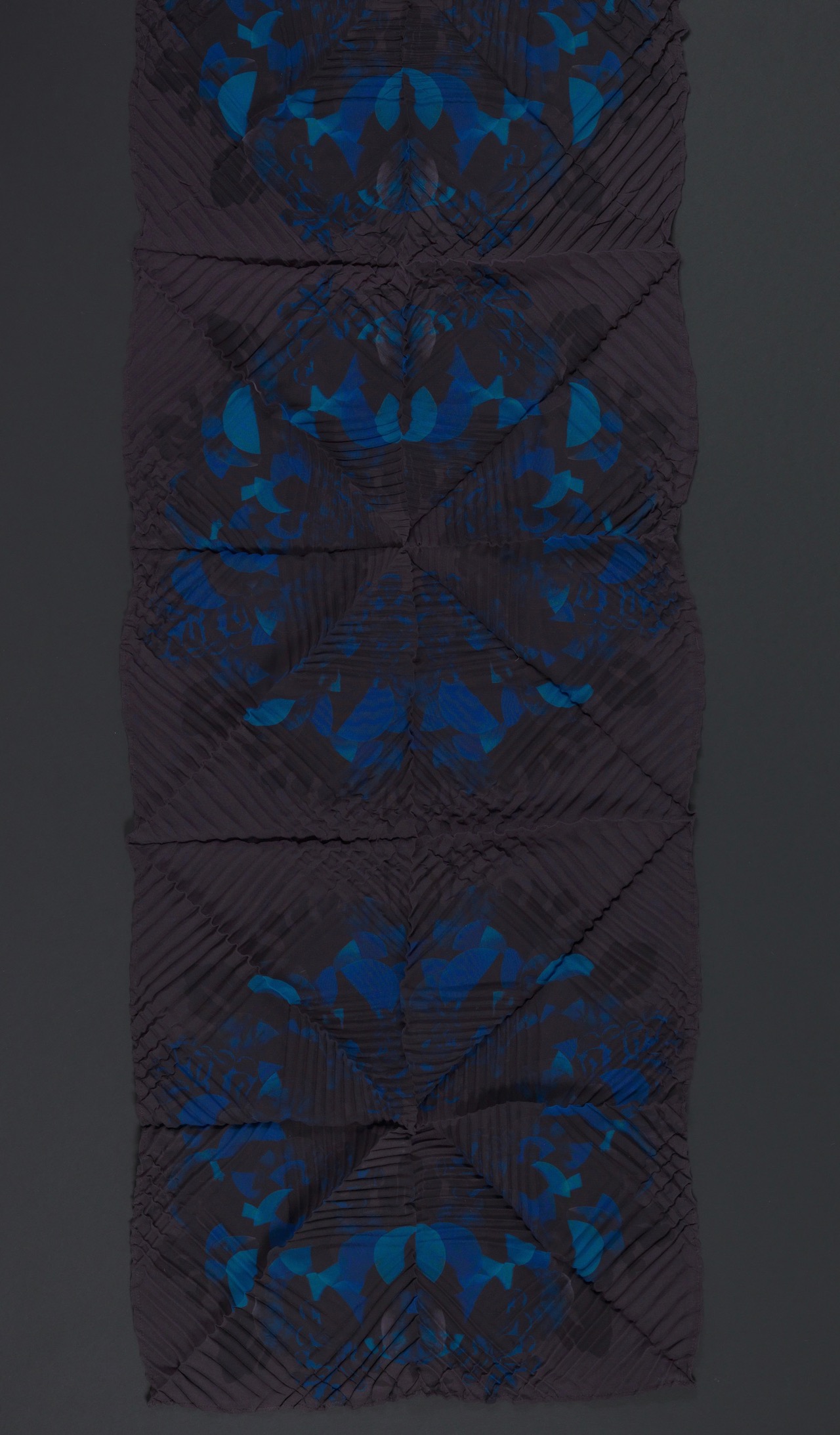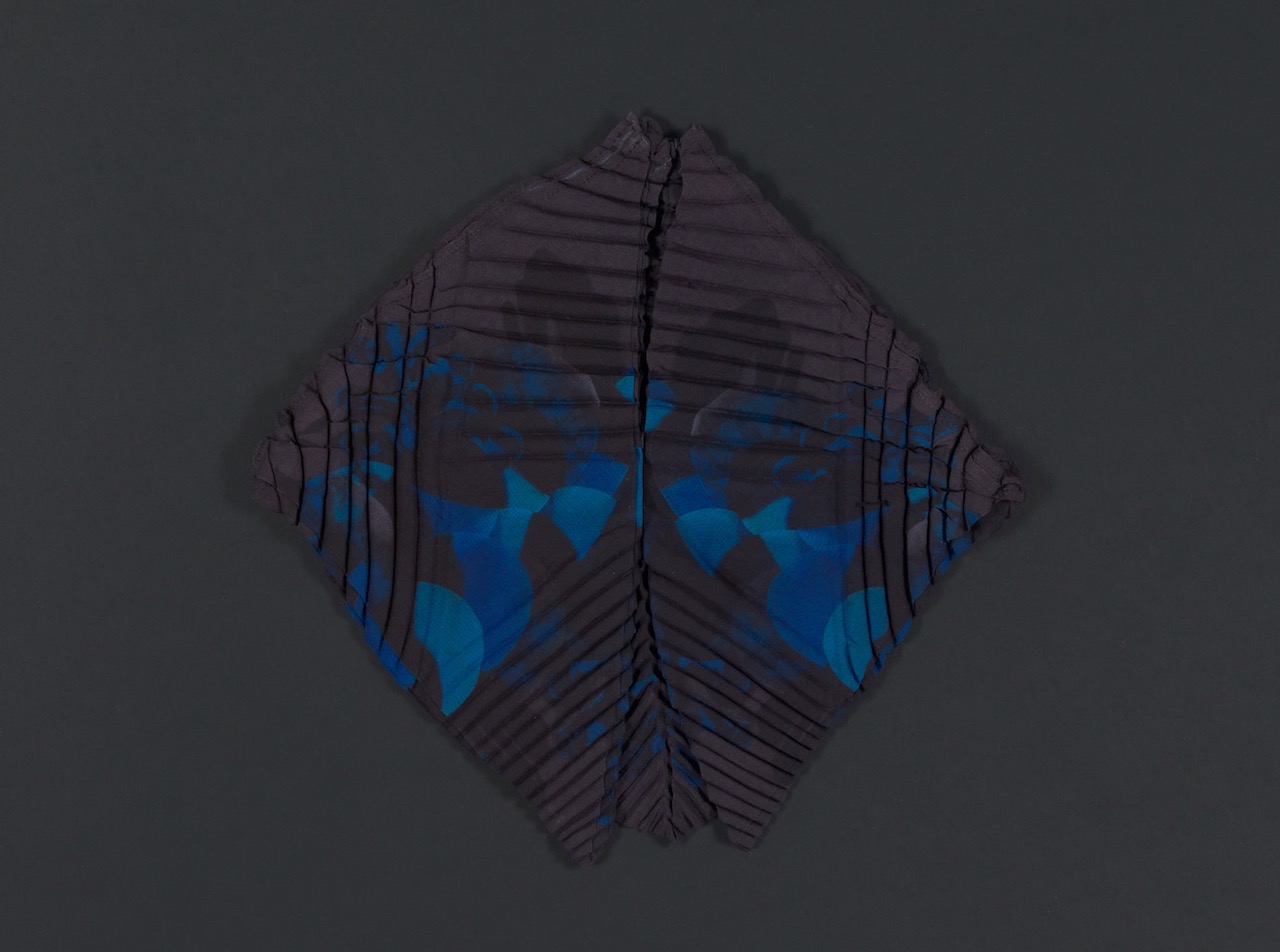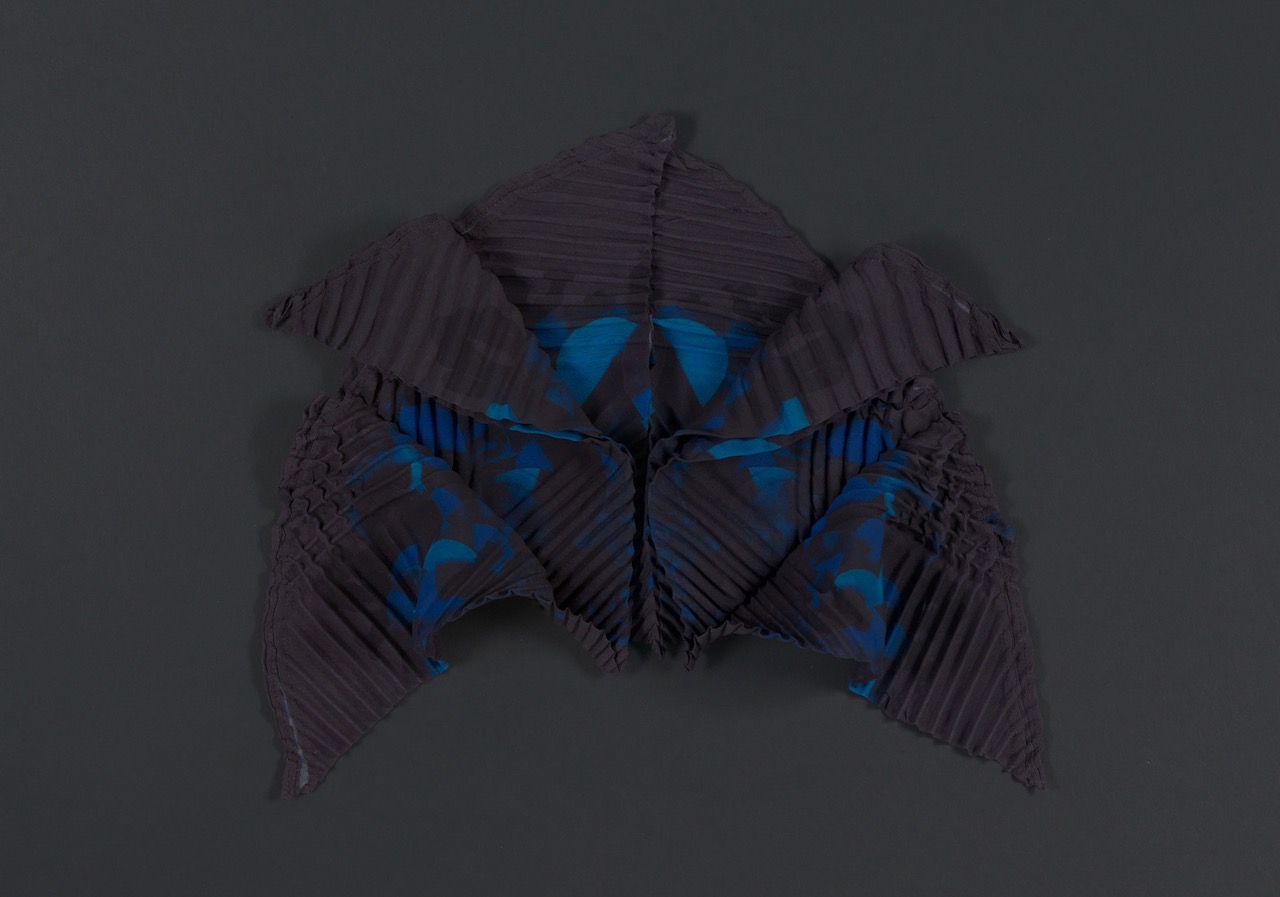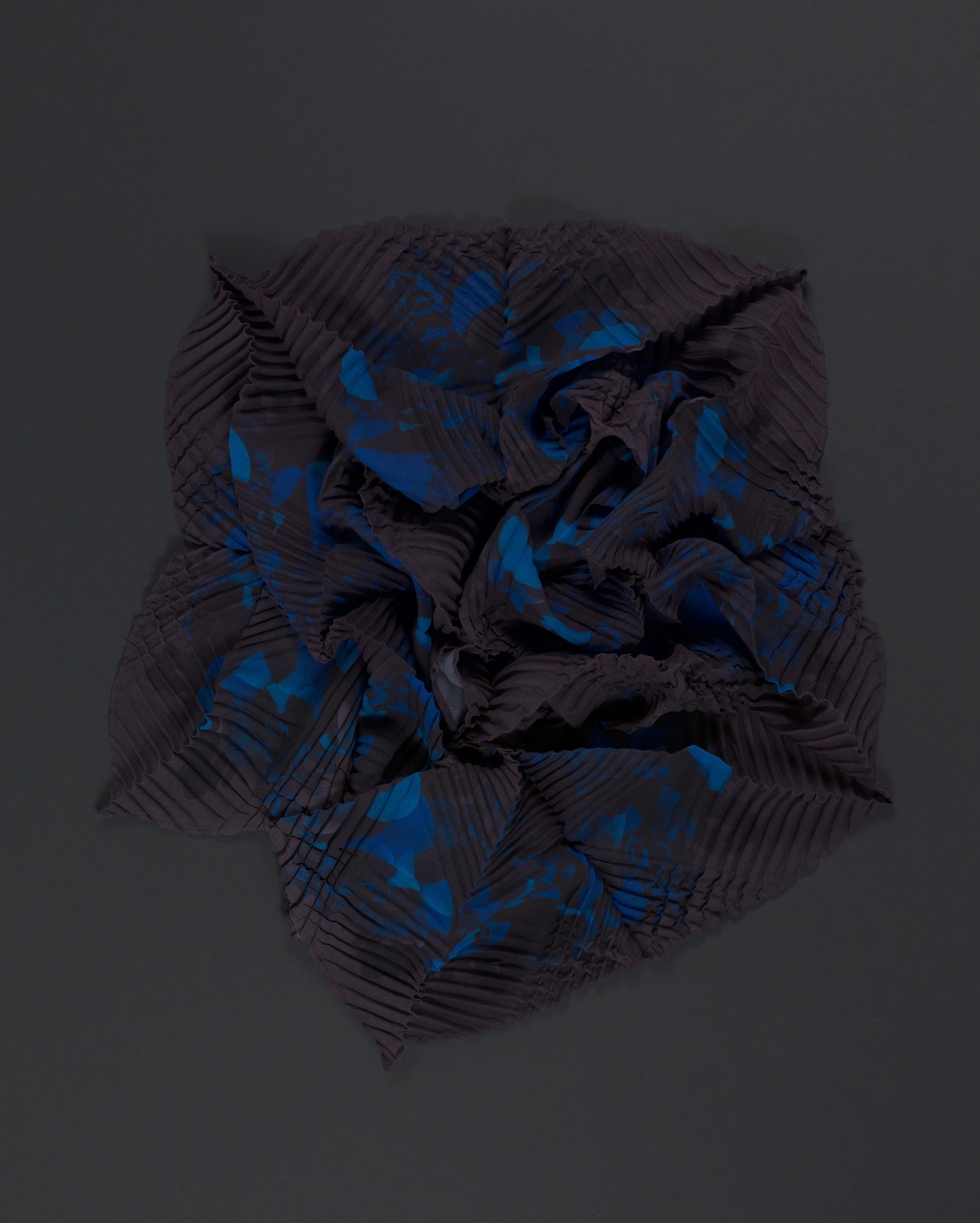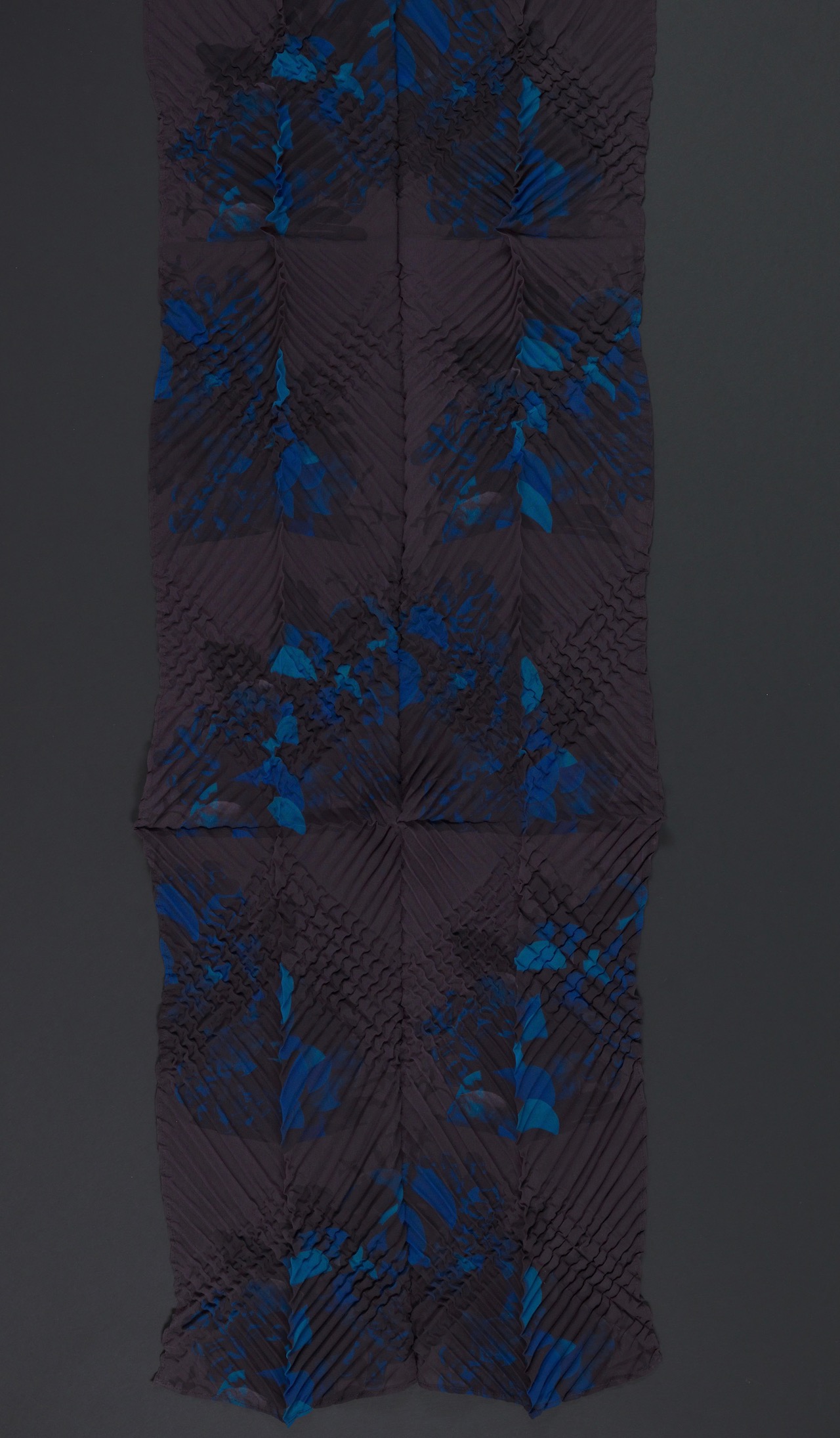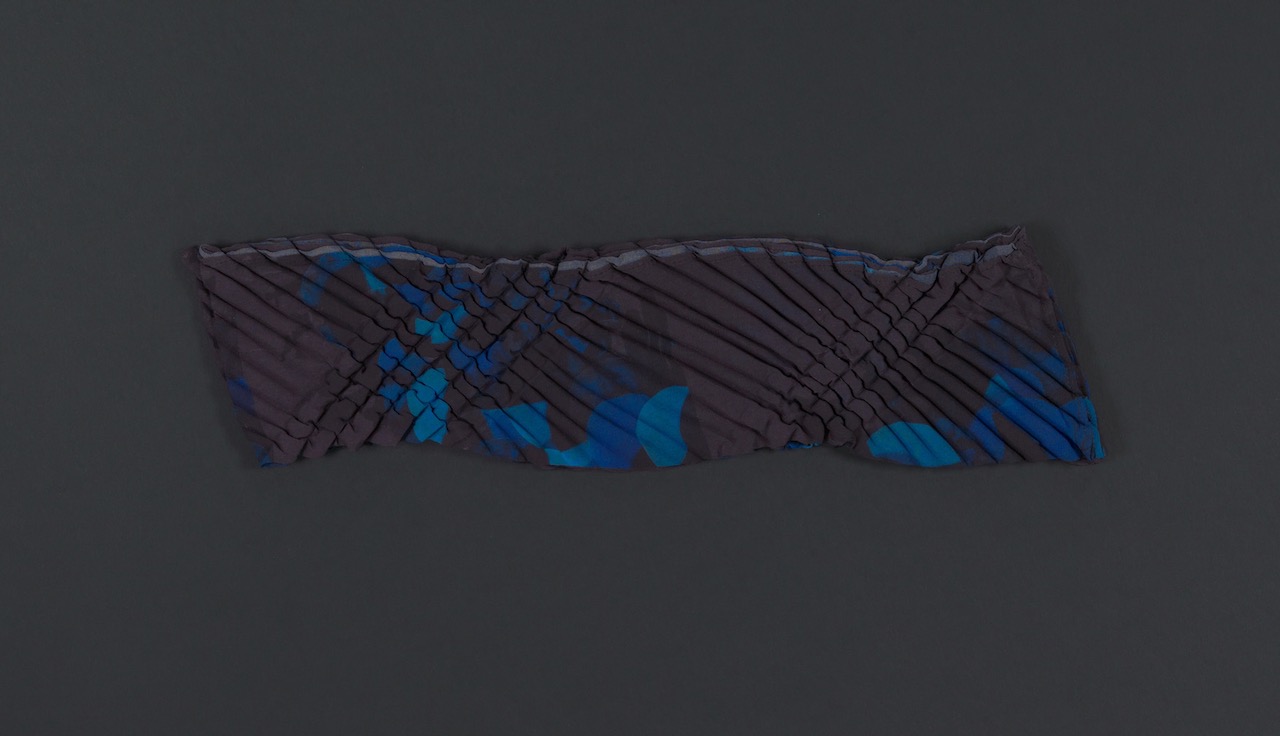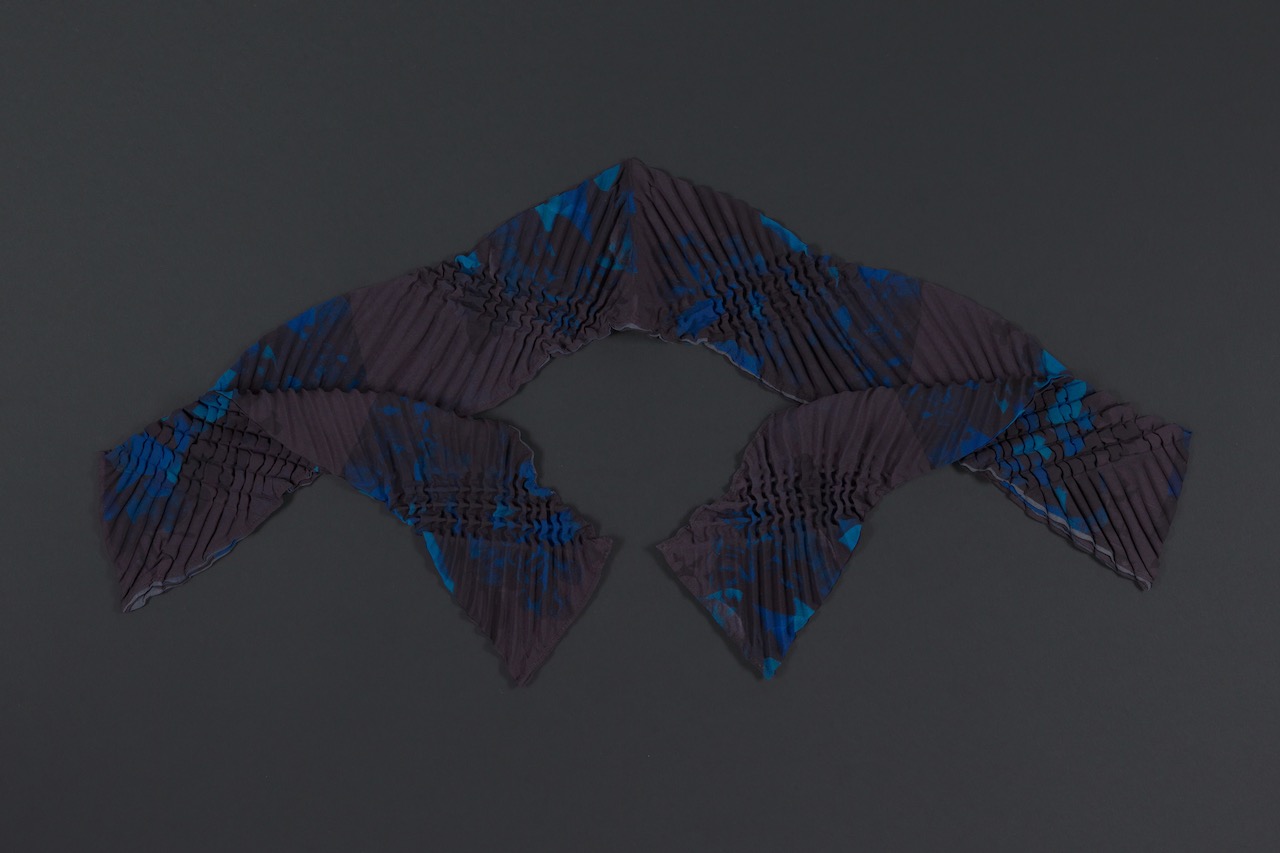Domestic Disturbances
February 1, 2021 – March 31, 2021
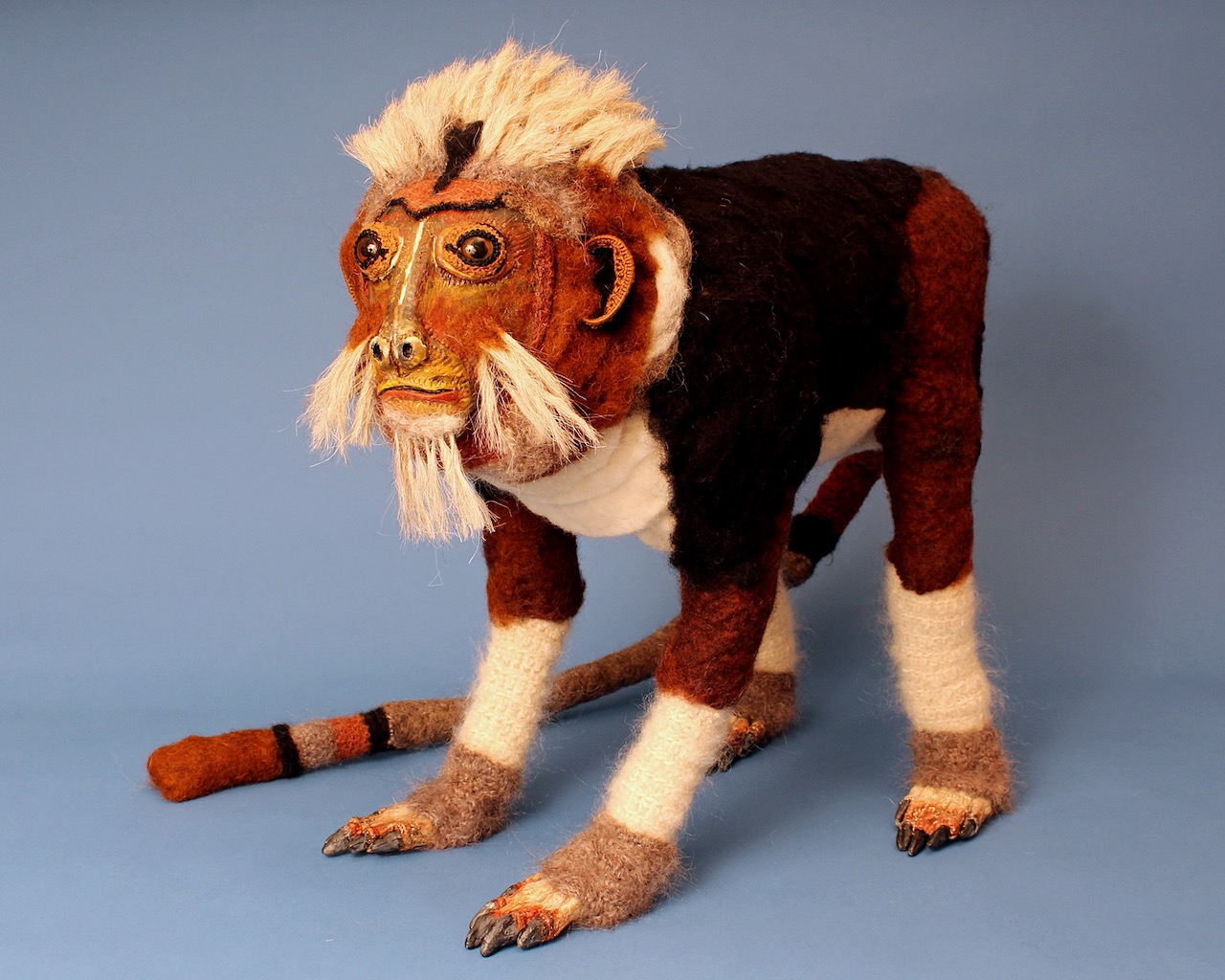
Andrea Uravitch
Tamarin: Going, Going, Gone?
Constructed steel and wire armature, hand=made felt, ceramic head and feet, crochet fiber parts and Romanian Goat hair whiskers.
Body 18”long / tail 32” long 17” tall / 9” foot span
“I have crossed Cotton Topped Tamarin from Colombia with a Golden Lion Monkey from Brazil. These are found in South America and are on the Endangered Species List. People are cutting down the monkey’s tree habitats to make cheap furniture and clear the land for crops. And yet the Tamarin’s are very popular and there is a ground swell of people who are trying to save the Tamarin’s tree environment. I have spent decades creating sculptures of wildlife, always wanting to draw people in. I am hoping to open a dialogue between the audience and the future existence of certain species.”
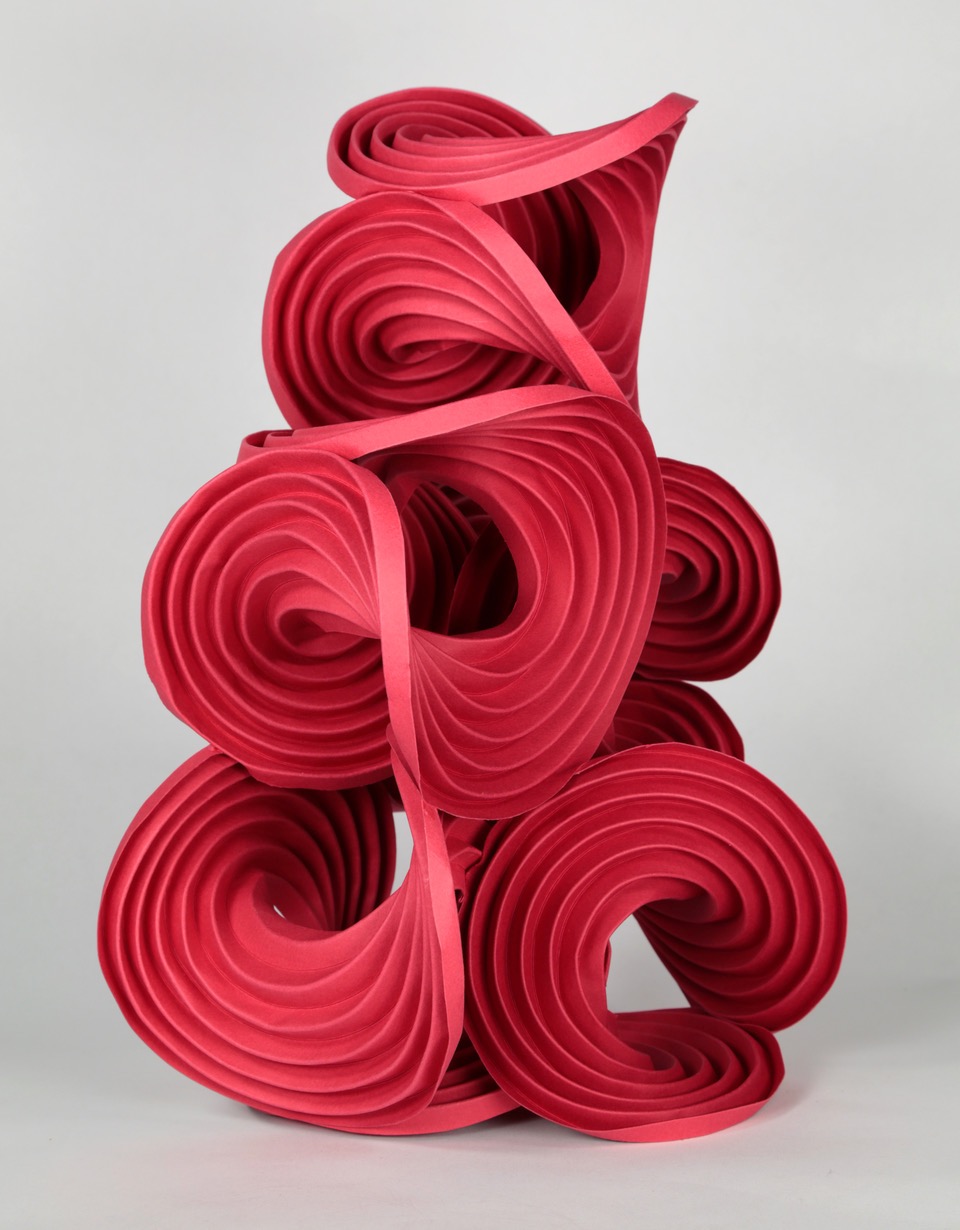
ERIK AND MARTIN DEMAINE
FIRE BUBBLES
Mi-Teintes watercolor paper
7” x 9” x 14” high
Erik Demaine and Martin Demaine are a father-son math-art team. Martin started the first private hot glass studio in Canada and has been called the father of Canadian glass. Since 2005, Martin Demaine has been an Artist-in-Residence at the Massachusetts Institute of Technology. Erik Demaine, also at the Massachusetts Institute of Technology, is a professor of computer science. He received a MacArthur Fellowship in 2003. In these capacities, the Demaines work together in paper, glass, and other material. They use their exploration in sculpture to help visualize and understand unsolved problems in science, and their scientific abilities to inspire new art forms. Their artistic work includes curved origami sculptures in the permanent collections of the Museum of Modern Art (MoMA) in New York, and the Renwick Gallery in the Smithsonian. Their scientific work includes over 60 published joint papers, including several about combining mathematics and art. The Demains also won a Guggenheim Fellowship (2013) for exploring folding of other materials, such as hot glass.
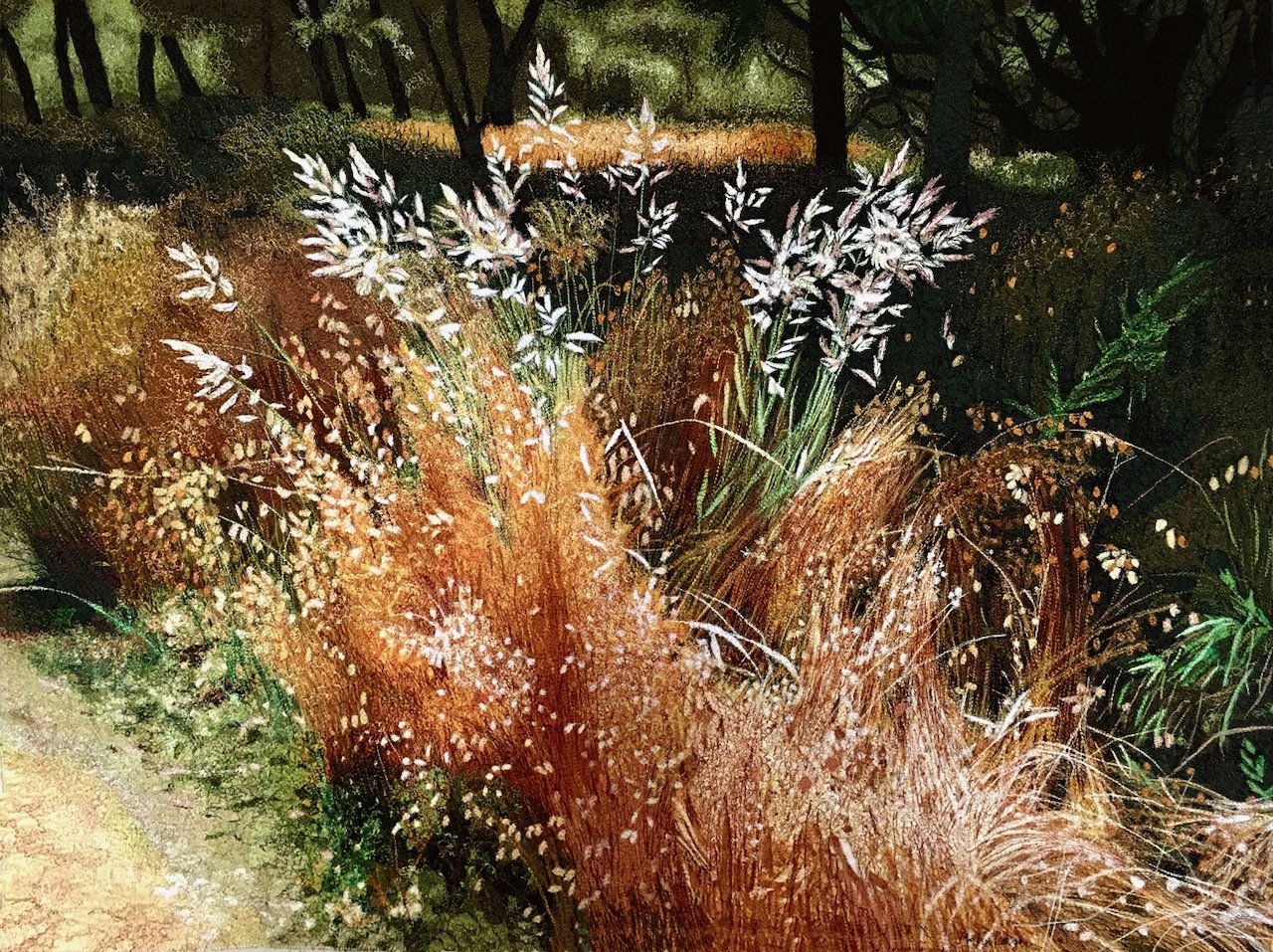
MALIN LAGER
BLUEGRASS, ELKHORN SLOUGH
Fabric, thread, machine embroidery. Mounted.
25” x 33”
Inspired by lichen-covered rocks, wet cobblestone streets and the expressive faces of her family and friends, Swedish textile artist Malin Lager creates highly detailed ‘paintings’ with her favourite 1984 Pfaff sewing machine. Her pictures, crafted of meticulously stitched layers of fabric and thread, are so lifelike they are often mistaken for oil paintings. Malin begins with lustrous, coloured strands of fine silk which she builds up in a many-hued cascade of tiny darning threads over a patched fabric background, similar to the traditional method of underpainting in painted art. The free motion foot on her sewing machine is expertly guided to create colour and composition in an image with shading and highlights that give it its photographic-like expression.
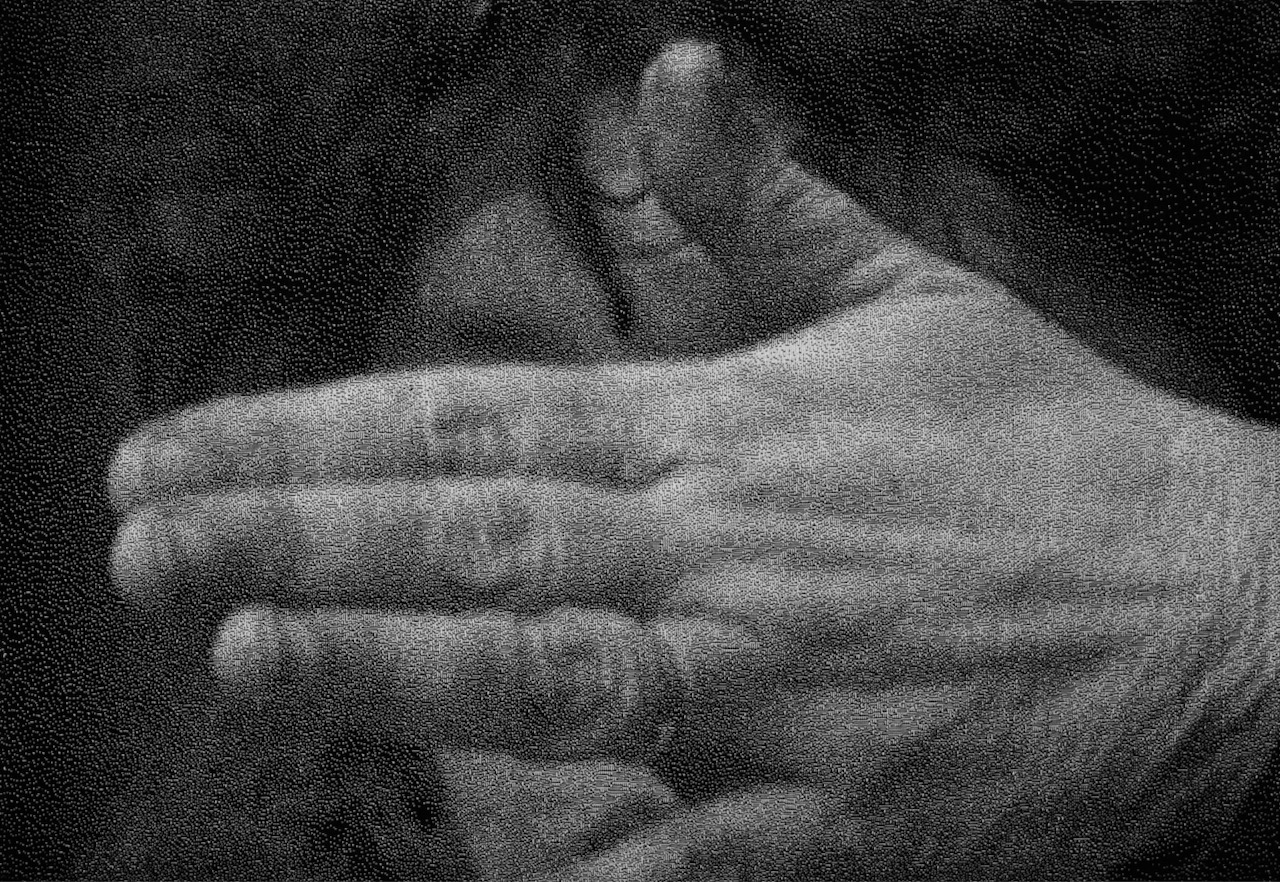
LIA COOK
DIGIT MAPS: SKIN
Rayon, cotton woven
36” x 53”
“Despite the involvement of man-made technology, the figures Cook paints seem to live and breathe from their poses in silk, rayon and abaca (banana plant fiber). In Point of Touch: Bathsheba, hidden hands reach out to touch the woman pressing the sumptuous cloth to her skin. “Those hands woven into the cloth underscore the notion of tactility and the sensuousness of the point of touch,” – Jeremy Adamson, Renwick Gallery curator. “I create sensual and complex works that focus on the meaning of cloth and what that suggests about being human and vulnerable,” said Cook, who has studied textiles and lectured around the globe. “I’m attracted not only to the physical properties of woven cloth, but the meaning of textiles in a variety of cultures throughout history.” – from Lia Cook: Material Allusions exhibition (Washington D.C.: National Museum of American Art)
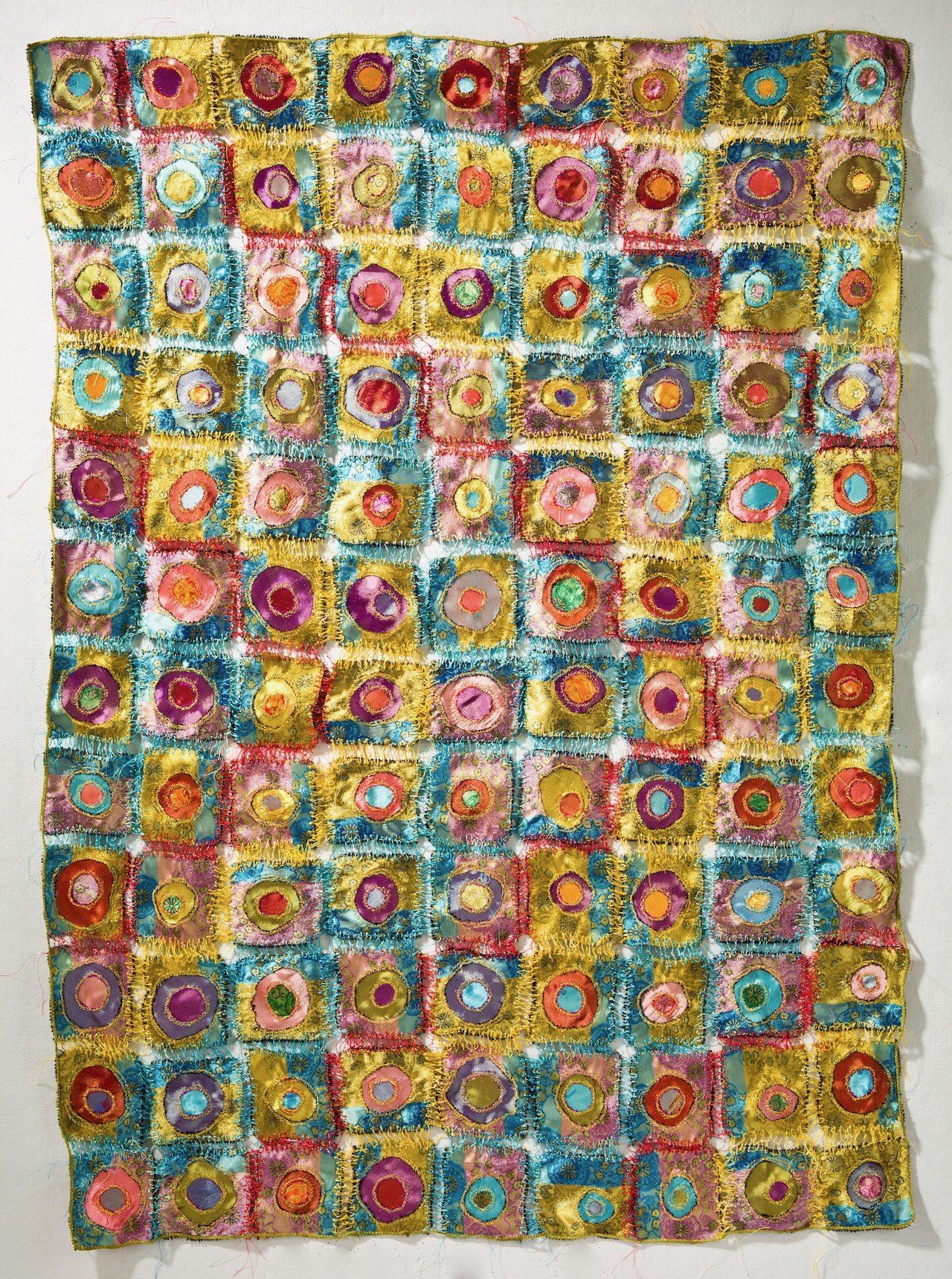
DONNA MARDER
REMNANT WOUNDS
Pieced, corded and sewn, silk-poly blend.
26” x 38”
“Recently, (during the last five years) I have been applying techniques I developed sewing paper to, what is a new material for me–fabric. Although there is a lengthy history of dressmaking, quilting and other needlework techniques my fabric pieces have evolved from this unusual byway. During the pandemic I worked almost exclusively on two commissions. The pieces in this show evolved from that focused work. They are both constructed from material left over from the 20’ x 7’ wall-piece that will be installed in the American Embassy in Paraguay this year. The second commission was a much smaller family memento piece which used a leaf/eye/flame shape. Remembering it as a favorite theme of my own, it became the main motif and structural element of “Looking Back at Paraguay”. ‘Remnant Wounds’ uses the reverse side of the vibrant, raucous material I used for the embassy work exposing a subtler, precious, jewel-like surface. This hanging also re-uses a favorite personal theme: layered hurts. Both pieces reflect the closing in of the pandemic. Using what is at hand. And a revisiting of self.”
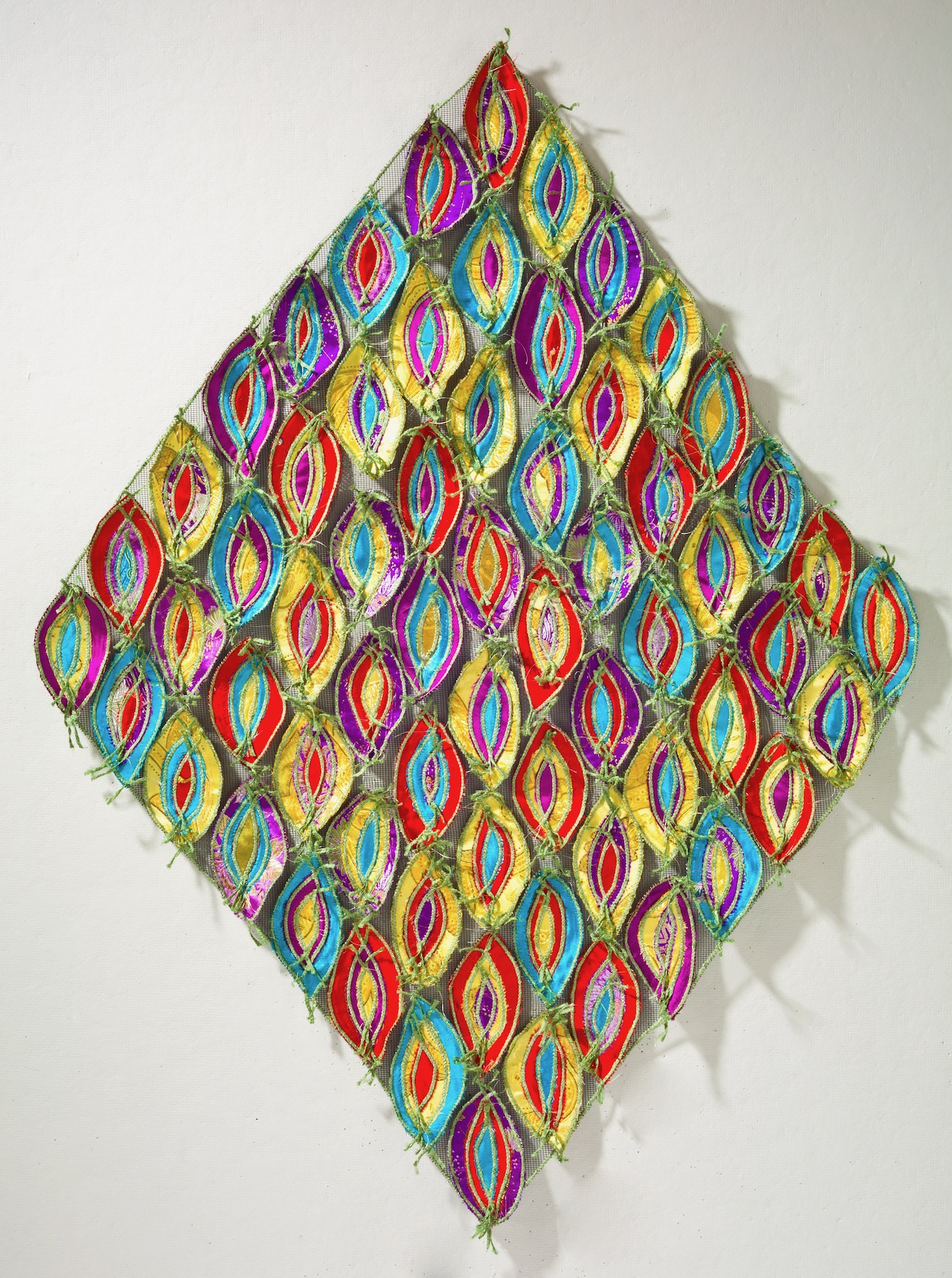
DONNA MARDER
LOOKING BACK AT PARAGUAY
Pieced, corded and sewn, silk-poly blend.
18” x 24”
“Recently, (during the last five years) I have been applying techniques I developed sewing paper to, what is a new material for me–fabric. Although there is a lengthy history of dressmaking, quilting and other needlework techniques my fabric pieces have evolved from this unusual byway. During the pandemic I worked almost exclusively on two commissions. The pieces in this show evolved from that focused work. They are both constructed from material left over from the 20’ x 7’ wall-piece that will be installed in the American Embassy in Paraguay this year. The second commission was a much smaller family memento piece which used a leaf/eye/flame shape. Remembering it as a favorite theme of my own, it became the main motif and structural element of “Looking Back at Paraguay”. ‘Remnant Wounds’ uses the reverse side of the vibrant, raucous material I used for the embassy work exposing a subtler, precious, jewel-like surface. This hanging also re-uses a favorite personal theme: layered hurts. Both pieces reflect the closing in of the pandemic. Using what is at hand. And a revisiting of self.”
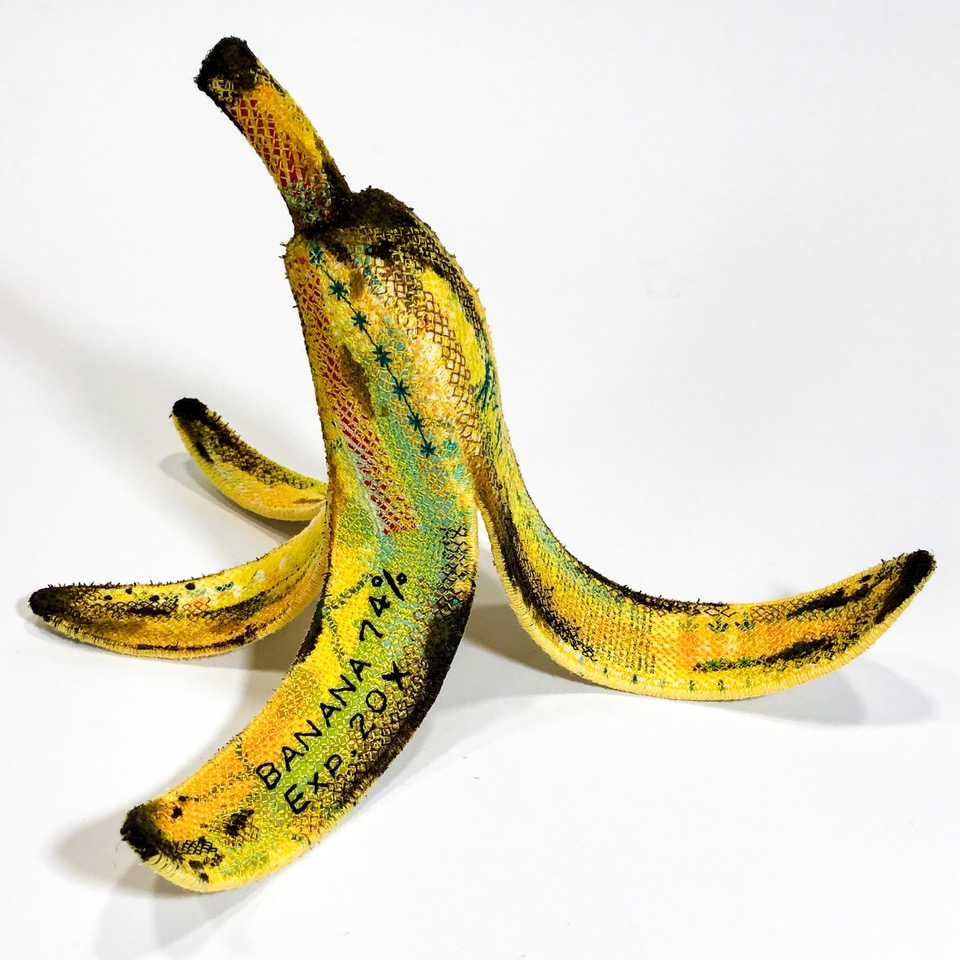
ALICJA KOZLOWSKA
74% Banana Peel
Felt, cotton, machine and hand embroidery
9” x 7.5” x 6”
“I started to create 3d embroidered felt sculptures of everyday objects to provide an opportunity to rethink these items we take for granted. I draw inspiration from the reality that surrounds me, consumerism and everyday objects. I create in the aesthetics of Pop Art. In my works I use a needle, like a brush. I combine various materials from labels, newspapers, foils, to felt and fabric. Working with material is my passion. In a fit of inspiration,I try to make each of my works unique and stimulate the viewer's imagination.”
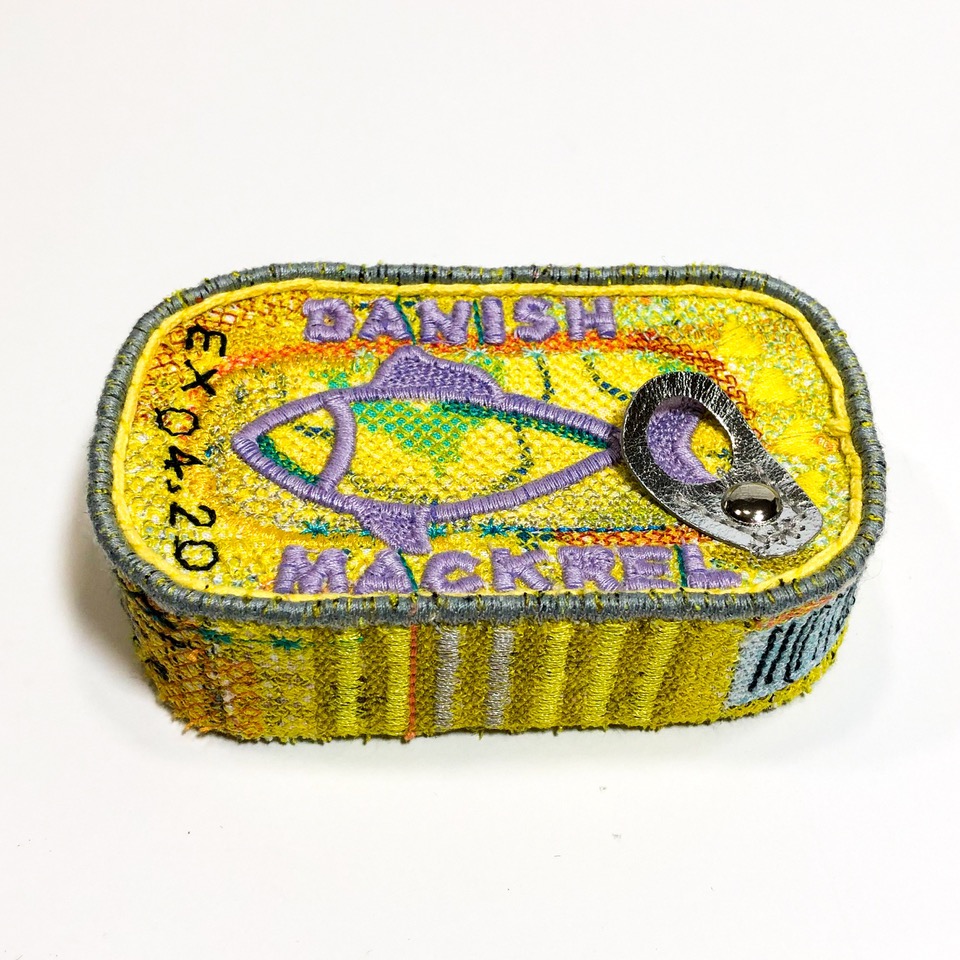
ALICJA KOZLOWSKA
YELLOW SARDINE CAN
Lemons, Blue, Red and Yellow Sardine Cans Embroidered felt sculpture made in artquilt technique.
4.3” x 2.6” x 1.2”
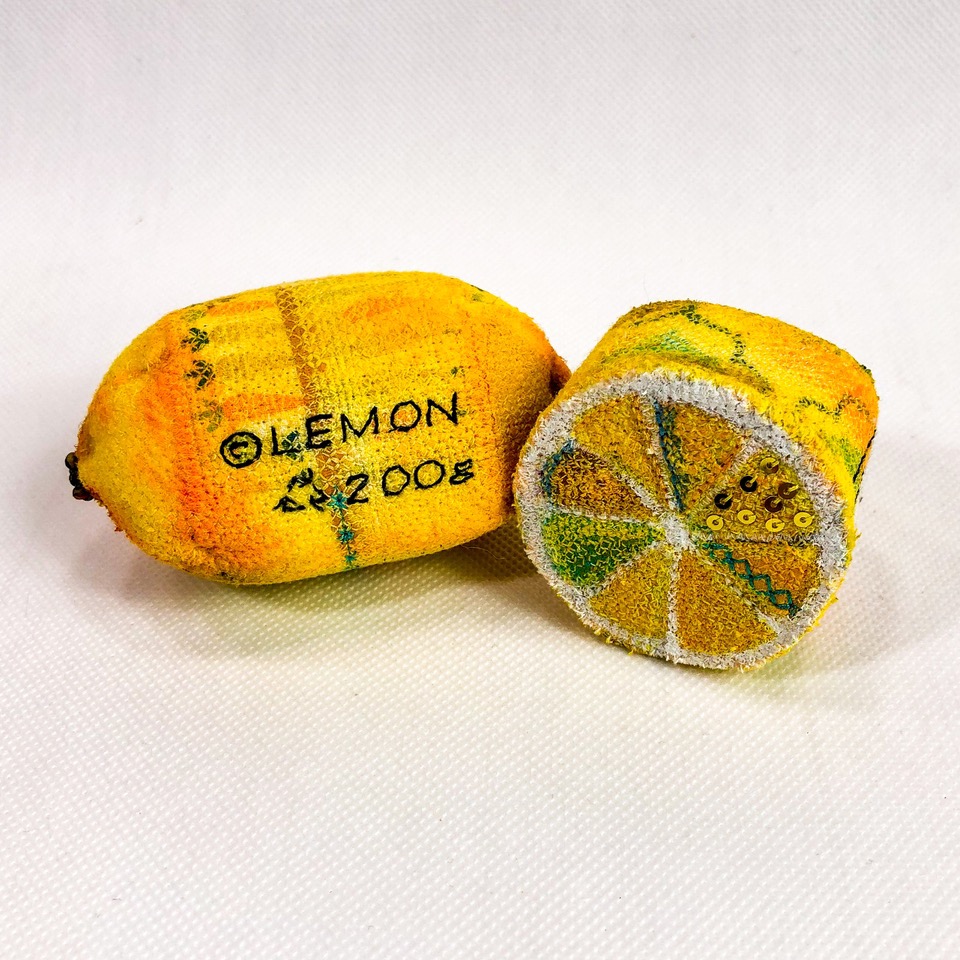
ALICJA KOZLOWSKA
Lemons
Lemons, Blue, Red and Yellow Sardine Cans Embroidered felt sculpture made in artquilt technique.
Whole lemon: 4.1” x 2.4” x 2.4”; Half a lemon: 2.4” x 2.4” x 2.4”
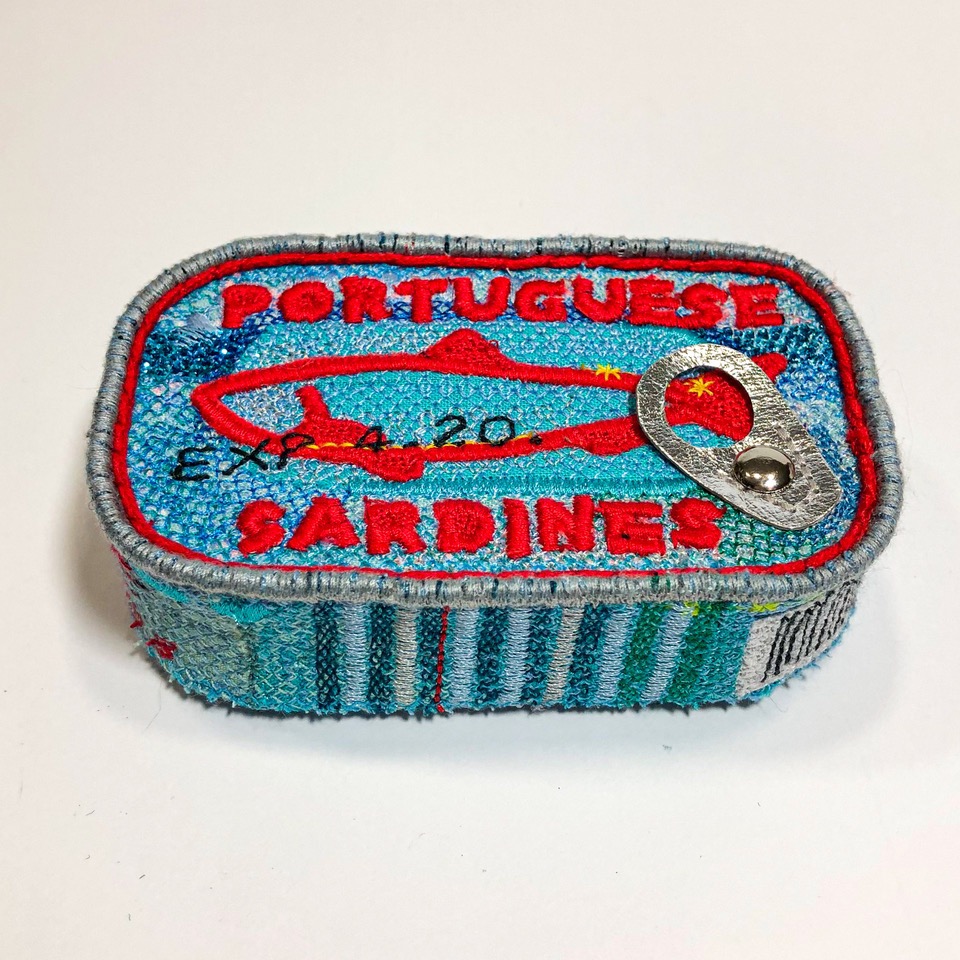
ALICJA KOZLOWSKA
BLUE SARDINE CAN
Lemons, Blue, Red and Yellow Sardine Cans Embroidered felt sculpture made in artquilt technique.
4.3” x 2.6” x 1.2”
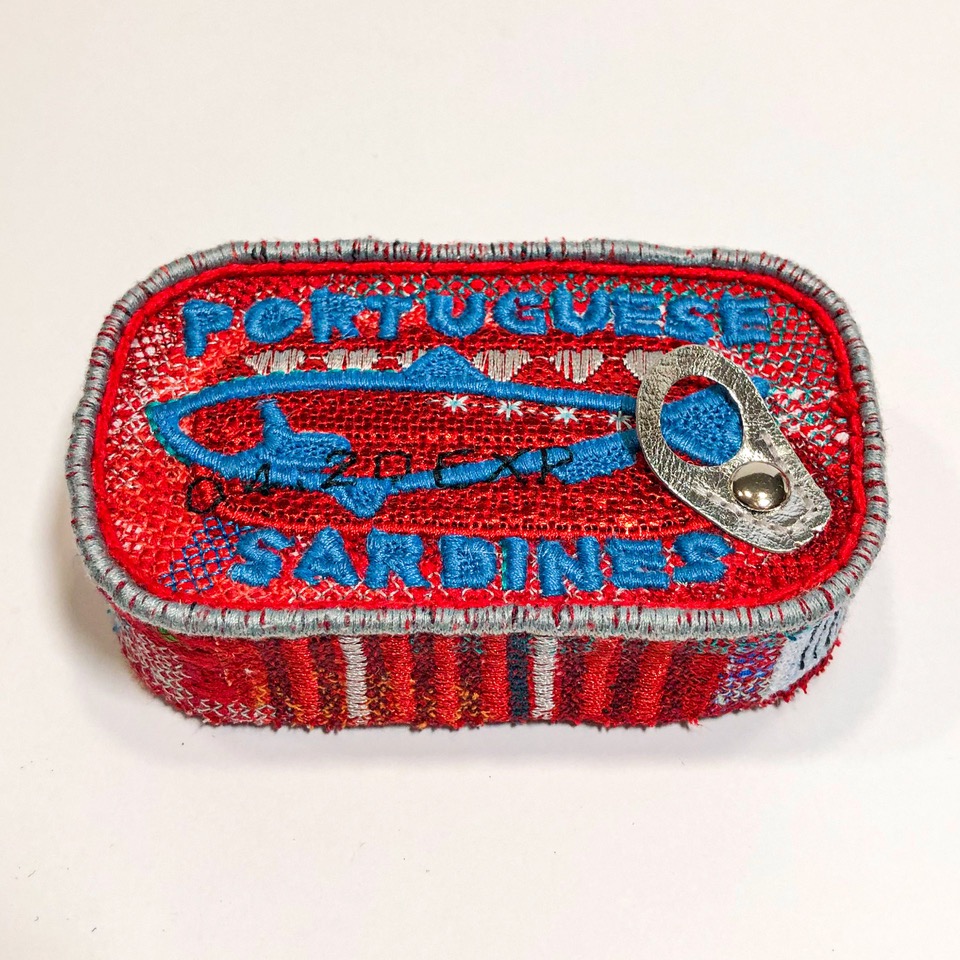
ALICJA KOZLOWSKA
RED SARDINE CAN
Lemons, Blue, Red and Yellow Sardine Cans Embroidered felt sculpture made in artquilt technique.
4.3” x 2.6” x 1.2”
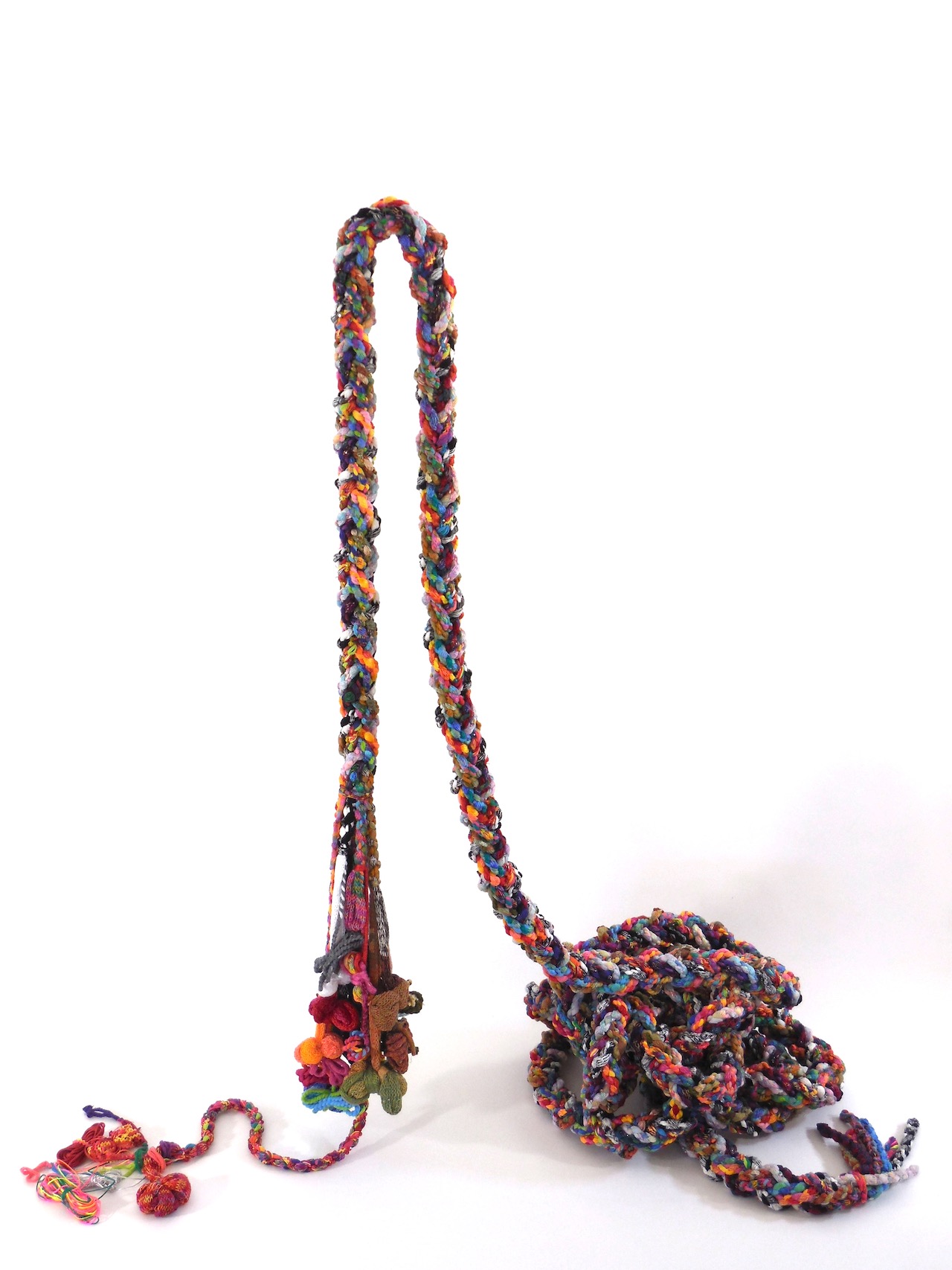
JOHN GARRETT
ROPE
Various machine knit, corded and braided threads and fabrics.
Approximately 36 feet x 3 inches
“When I received the invitation from Libby and Jo Anne to participate in “Domestic Disturbances”, it took some time for me to decide what to make. It seemed as if everything had been disturbed. As I had already been contemplating what I might be making as I entered my 70’s (!) and reviewing what I has made in the past (many things), I settled on the idea of making a rope. Partly, this was a literal interpretation of the exclamation: “I’m at the end of my rope!” In addition, I was thinking of a rope as a metaphor for my life. The many strands of a rope represent the various experiences of my life. I settled on creating a braided rope composed from 8 smaller braids. Each small braid was made from 4 strands of machine knit tubes and handmade cords. The BLACK AND WHITE braid refers to text, books, musical scores, intelligence and reason. The PASTEL braid refers to innocence and childhood. The braid of DEEP DARK colors refers to experience and maturity. The red braid is about PASSION and ENTHUSIASM. The blue/green braid is about MEDITATION and CONTEMPLATION. My DESERT ENVIRONMENT is expressed in a braid of gray-greens and browns. CELEBRATIONS are expressed with a palette of fiesta like colors. My creative life is represented with a braid of BRIGHT COLORS, a strand of BEADS and a group of eccentric cords and strings. One end shows the start of the individual braids. The other end shows clearly the components of the braids. The ROPE isn’t finished because obviously my LIFE isn’t finished. Even though the individual braids are quite different, they mesh and blend together well into a single entity through the braiding process.“
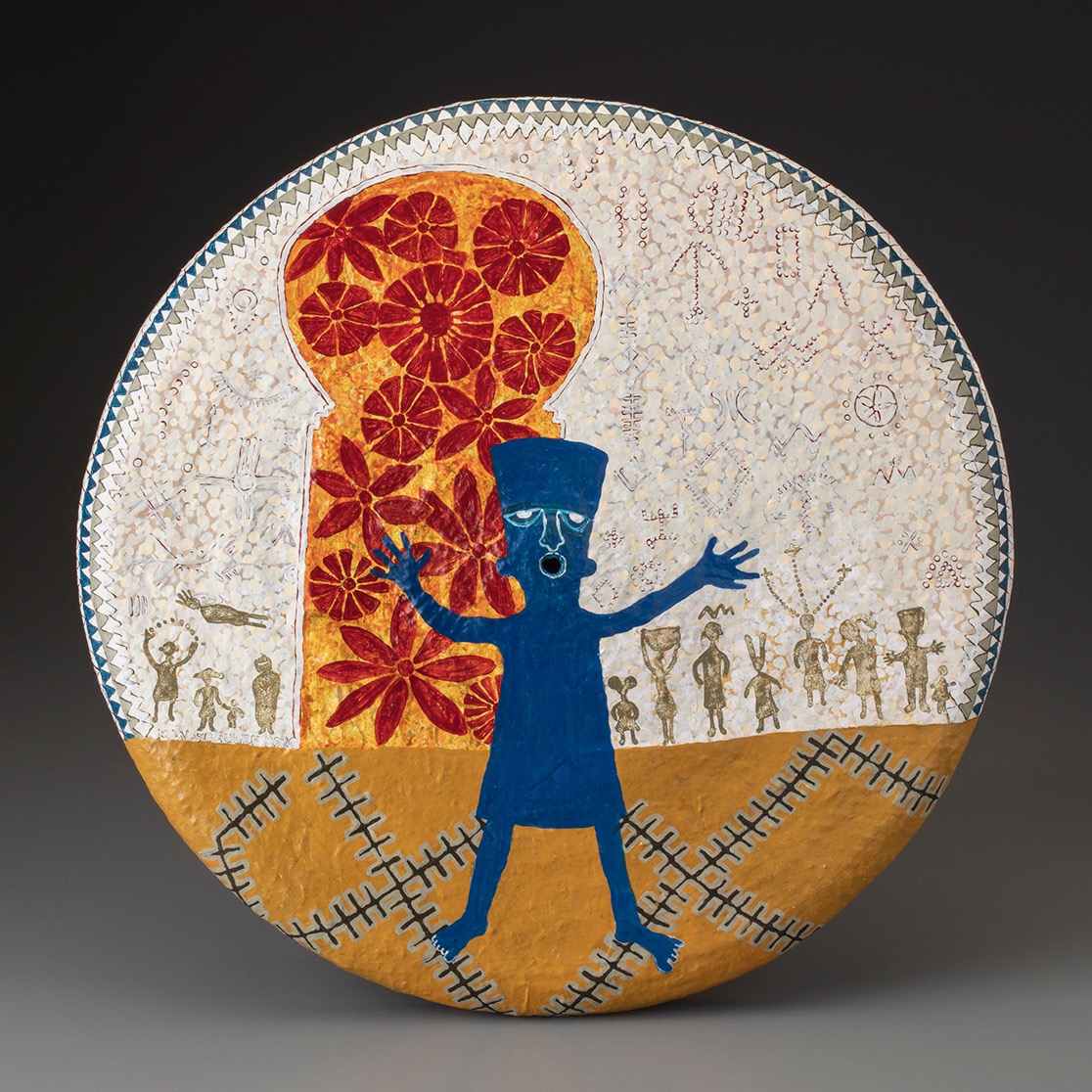
ELIZABETH WHYTE SCHULZE
BLUE FEZ
Pine needles, natural and dyed raffia, acrylic paint
16” x 3”
“This circular basket has a beautiful blue figure at its center whose mouth is the tiny opening of the basket. Her mouth is calling to the small line of females parading behind her. She stands on a common carpet often seen in the local market place. One side of the blue figure is an elaborately decorated Moorish arch. The white background is covered with Berber tattoo designs- a white on white pattern.”
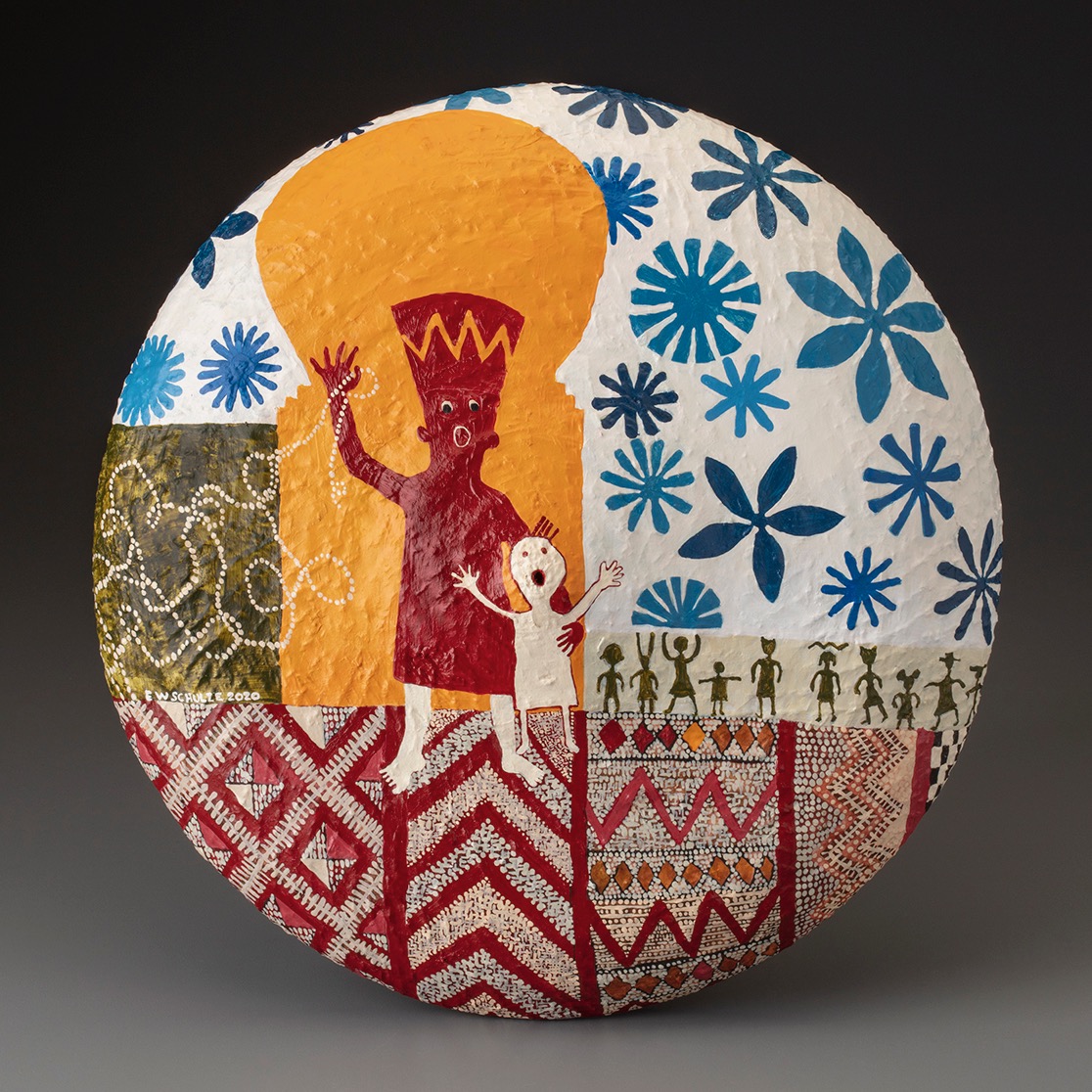
ELIZABETH WHYTE SCHULZE
ELSAH WALLPIECE (MOROCCO SERIES)
Pine needles, natural and dyed raffia, acrylic paint
14” x 3”
“This round basket wall piece is coiled so the small opening in the center of the work is the open mouth of the small female. The larger female wears a tall hat with a fine zigzag matching the color of the Moorish shaped arch they stand under. Below them is a carpet with intricate designs which I have painted rather than try to produce it in texture. The large wall next to the arch is covered in a blue floral pattern on a white background. The pattern and colors are influenced by the mosaic walls characteristic of Moroccan architecture.”
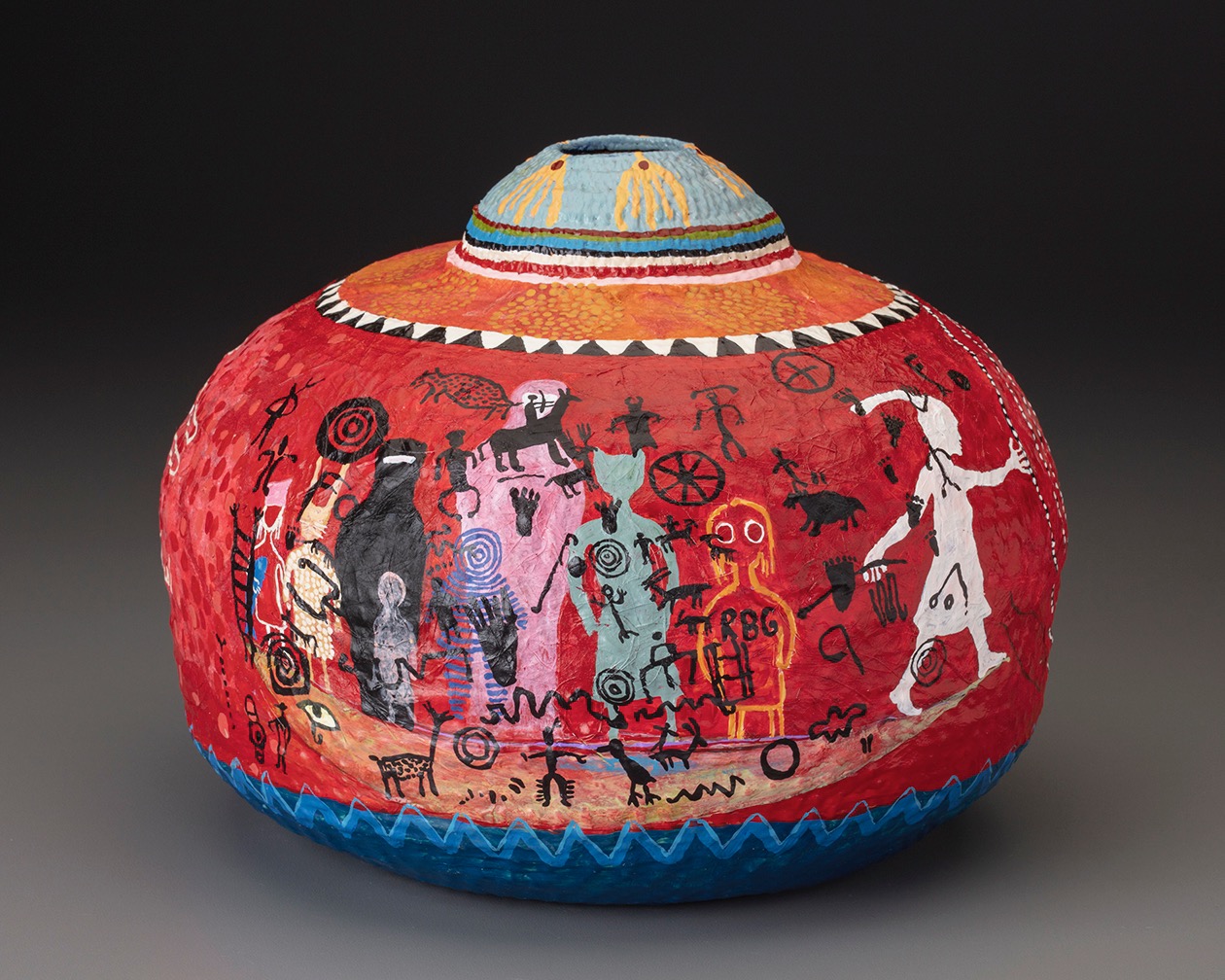
ELIZABETH WHYTE SCHULZE
FISH WOMEN (MOROCCO SERIES)
Pine needles, natural and dyed raffia, acrylic paint
9” x 10”
Women fish together from the boat lending support - there are many women from all sorts of backgrounds. At the front of the boat a woman casts her net in the shape of many concentric circles. An elaborate fish is caught or does it escape? beyond this, a figure floats in space and her dress is covered in many colors representing the LBGQ community. And finally the word fishwoman is written in Arabic.
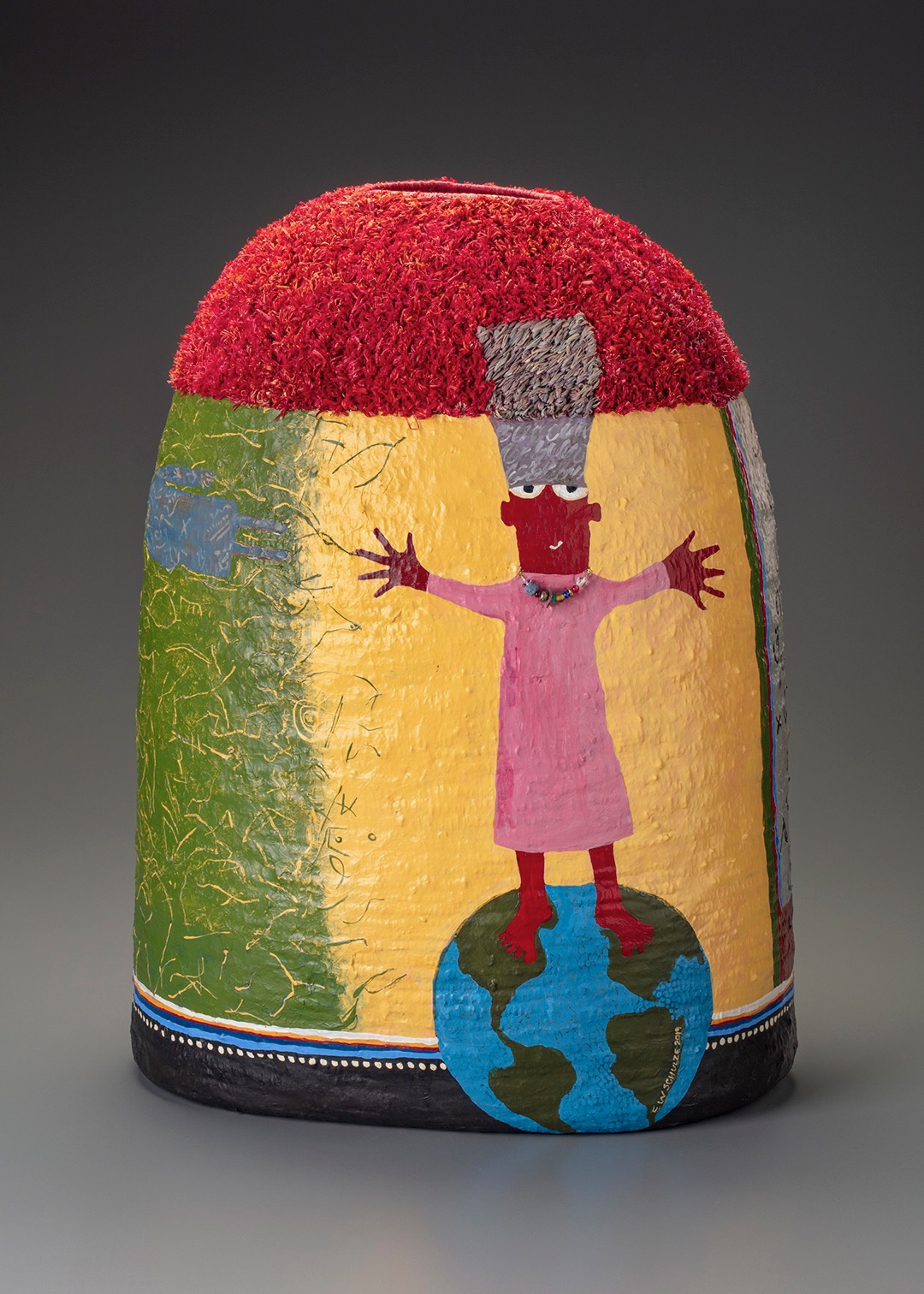
ELIZABETH WHYTE SCHULZE
TARBOOSH (MOROCCO SERIES)
Pine needles, natural and dyed raffia, acrylic paint
21 “ x 16“ x 9“
“A large vessel with the upper part covered in rich red textured raffia and is in the shape of the well-known cap of Morocco. A figure with a tall woven hat stretches out her arms as she stands on the world proclaiming her concern for the health of the climate. Figures of women of different cultures gather near an elaborately mosaiced arch. Above the group of women in the red textured area is the hand of Fatima in blue raffia. The hand of Fatima is an important protection symbol for women in the community.”
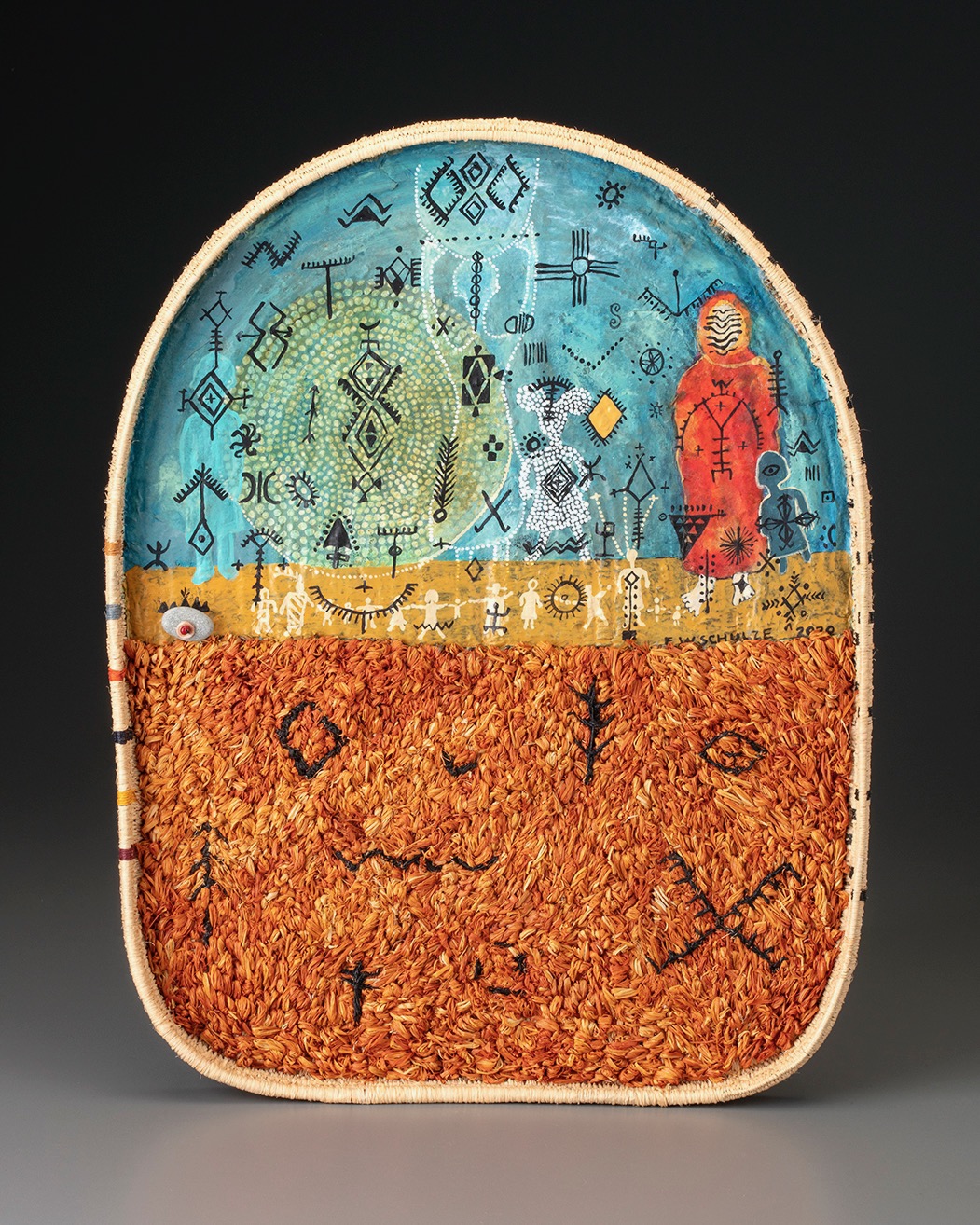
ELIZABETH WHYTE SCHULZE
TIZNIT WALLPIECE (MOROCCO SERIES)
Pine needles, natural and dyed raffia, acrylic paint
17” x 13” x 1’’
“Influenced by my trip to Morocco I made this work to celebrate the many beautifully crafted rugs and carpets I saw in the country. The rug in Tiznit is a deep orange with several black Arabic designs. Above the rug, women gather in the marketplace surrounding a tall woman carrying a basket. The group are overlaid with a palimpsest of tattoo designs often seen on the Berber women of the Sahara.”
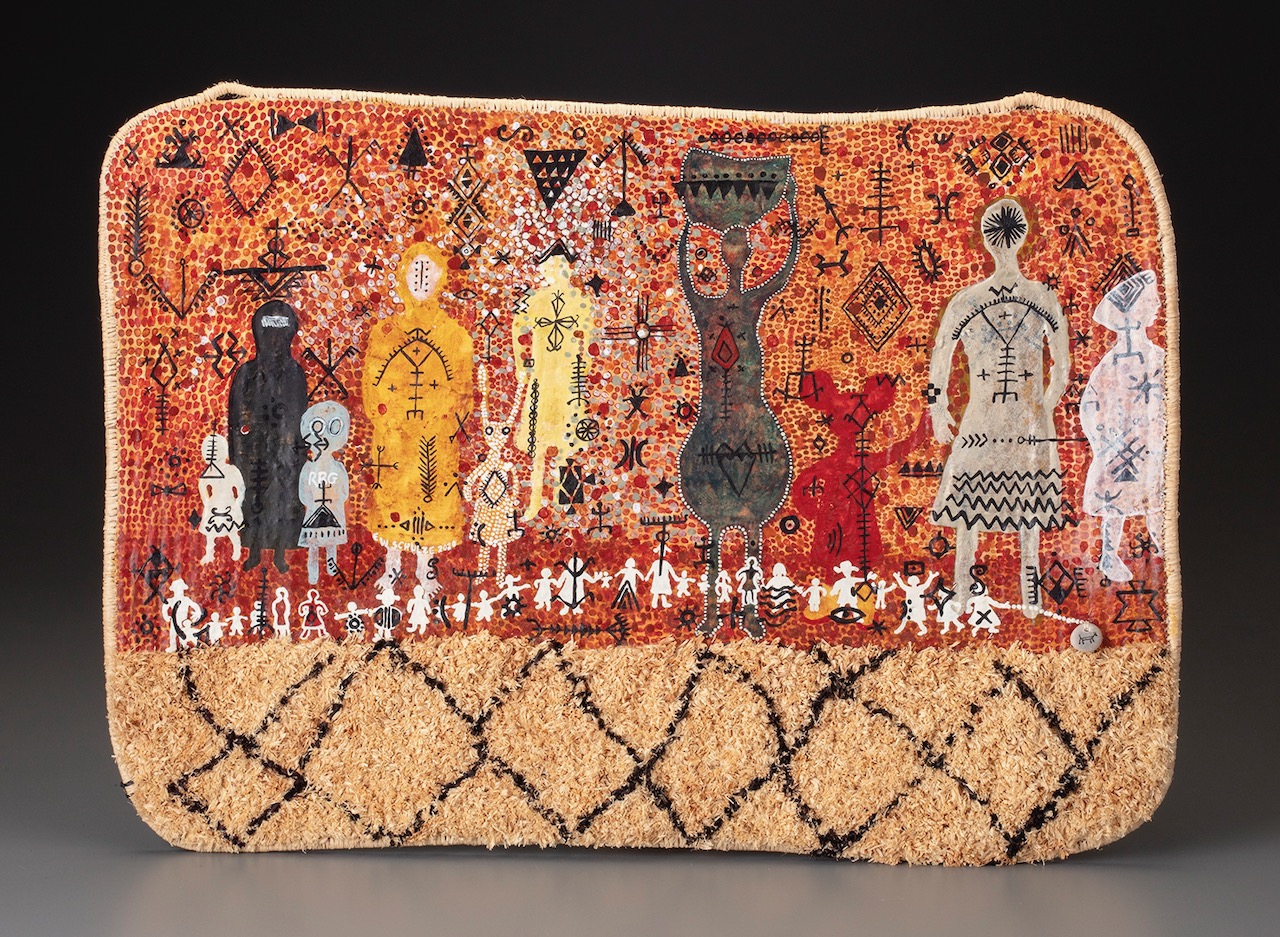
ELIZABETH WHYTE SCHULZE
MARMOOSH WALLPIECE
Pine needles, natural and dyed raffia, acrylic paint
15” x 23”
“In this wall piece I worked the coiling into a flat wall piece. The lower part of the work shows a beautiful black and natural textured carpet, a beautiful example of Moroccan weaving. The larger figures of women gather together at the market in all their varied costumes. A palimpsest of Berber tattoo designs gives the figures character. The middle of the piece has a long line of small female figures who are shown in doing the many tasks done by women.”

LANNY BERGNER
MULTI 676
Bronze mesh, glass frit, paper, silicone, wire.
26” x 26”
“By using hands-on processes of coiling, fraying, twisting, wrapping, gluing and knotting, I transform industrial screening, wire, silicone and monofilament into organic constructions. My desire is to create works that appear to have grown into being. I love the natural world and am constantly inspired by its beauty and infinite varieties of form. This, in combination with my fears, quirks and joys, results in works that celebrate the wonder of it all.”
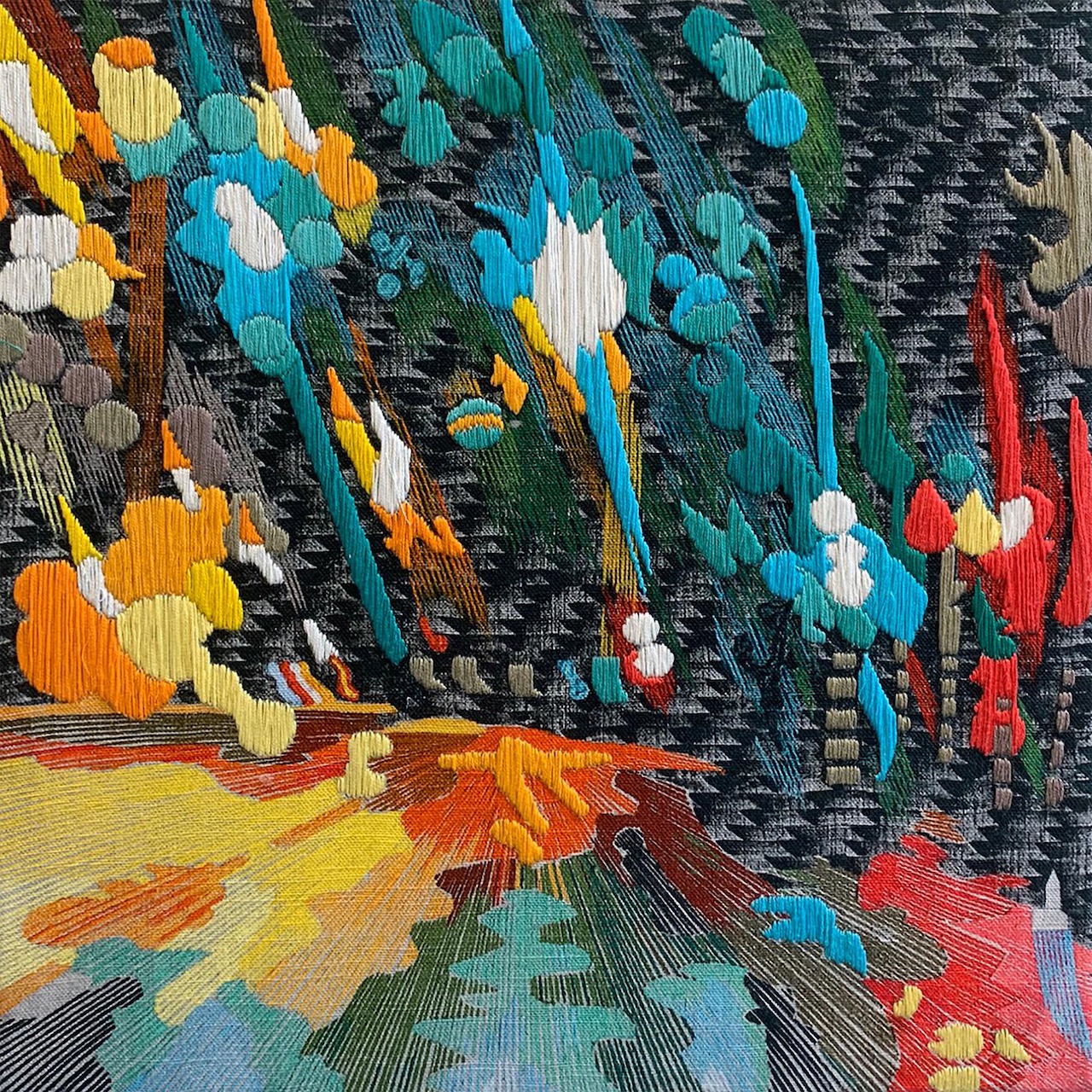
PAULINE NIJENHUIS
HAND@WORK TEXTILE
Cotton linen, embroidery, acrylic paint
“My work consists of two techniques: partly painted with acrylic paint and partly embroidered on untreated linen. I use the flat stitch ( ‘plat steek’ in Dutch language). I can fill forms using this stitch and it feels very similar to sketching. The way I paint is very time consuming because I reduce the photographic image in many acrylic painted lines. In an interview with Melissa Zexter she says: ‘I loved the meditative process of sewing – it was in such contrast to the technologically more immediate art of photography. I was also interested in how thread blended in and reacted to the photographs. The combination of sewing and photography brought together two very different processes that I love’. I have the same meditative process of embroidering.”
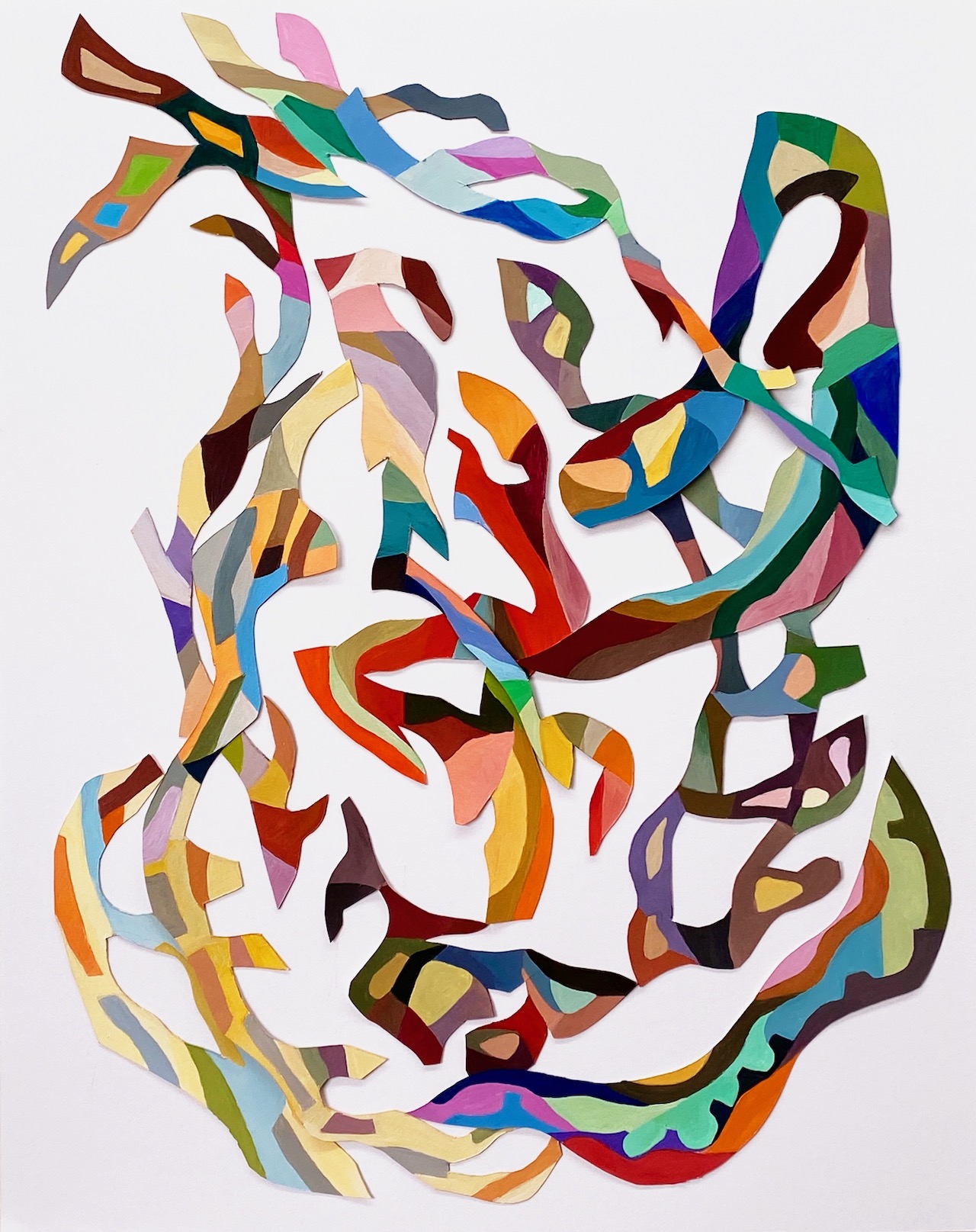
HOLLY WONG
EOS II
Cut paper with acrylic paint, mounted on paper
24″ h × 19″ w
“I created ‘Eos II’ with the intent to offer energy, color and light to viewers, especially in these challenging times. Eos is the Goddess of the Dawn in Greek mythology and has power over light. I found this imagery particularly inspiring and so I decided to paint a series of patterns on paper with acrylic paint, emphasizing the organic and female aspects of energy.”

Polly Sutton
BUMBLE
Dyed black cedar, yellow cane
12″ x 8″ x 7″
“The work begins when I have located a logging source where, with permission, I can harvest inner bark from the Western Red cedar trees. The outer bark is split off in the woods and I bring home several coils of fresh cedar bark. After it dries and seasons, it is resoaked, split and cut for the appropriate piece. The ideal setting is when I can set the dried bark outside to be reconstituted in the rain. This is the perfect way to begin to weave. There is no preconceived notion as to the purpose of my sculptural shapes, except perhaps, a quest for pleasing curvilinear forms. I cut lengths of cedar with either big or small in mind. Once the size of the base is determined and woven, the shape evolves as the work progresses. I keep an eye on this evolution and try to control it with the use of the tension in the material I am twining with, which is commonly wire. The cedar bark, when damp, has an impact on the shaping, as it is very pliable when soaked. In this compilation of pieces the cedar rims are suspended outward, forming visually connecting edges, held in place by the rigid quality of the spruce root borders.” Sutton’s museum collections include: Arizona State University Art Museum, AZ, Museum of Fine Arts, Boston, MA, Racine Art Museum, WI, Michigan State University Museum, MI and Edmonds Art Museum, WA.
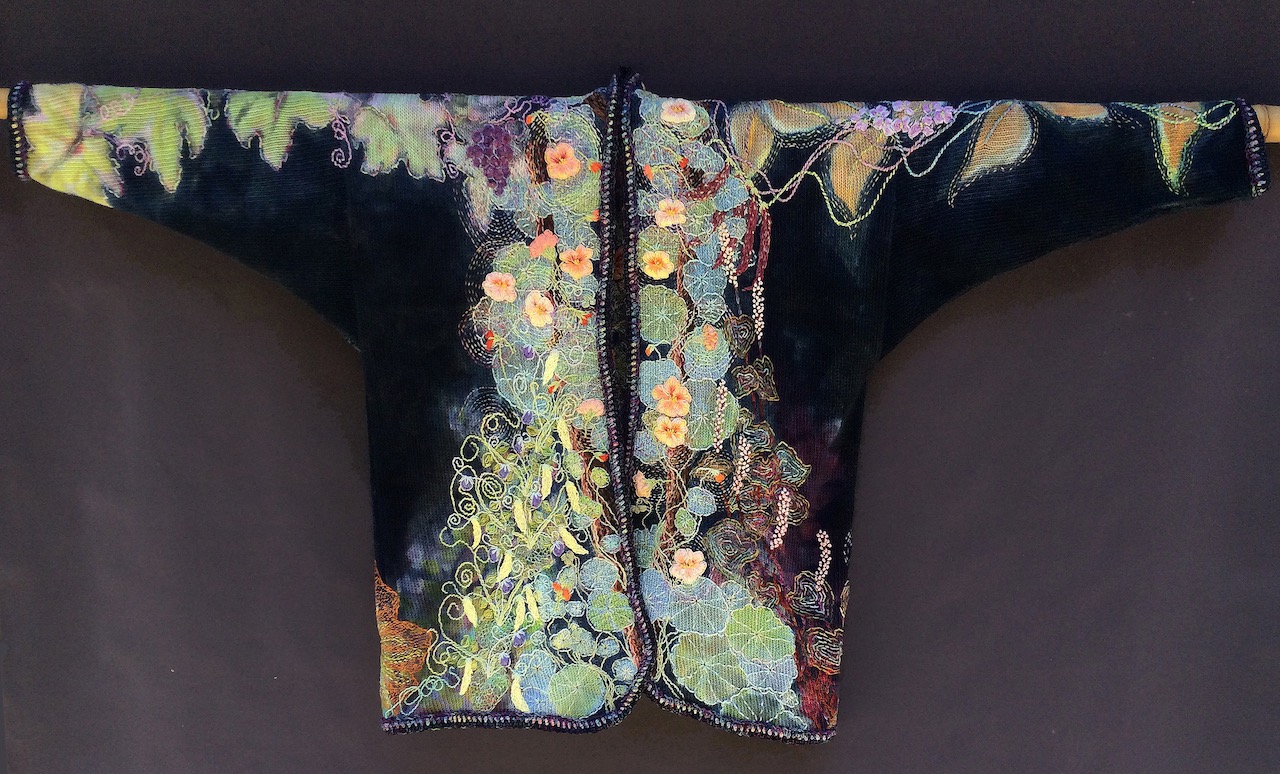
ELLEN MOON
VINY JACKET
Knitted and dye painted perle cotton embroidered with cotton threads.
Size – Bust: 46″, Length: 26″, Wrist to wrist with arms out: 52″
“In my jackets, I am reporting on some of the daily phenomena that I have witnessed in the natural world around me—butterflies in the mist, the surprising beauty of a spider’s web, light and shadow in a field, the lively round of life and death in the pond. I start with a line—a piece of thread, and loop it, dye it, layer it into a sculptural form that people can wear. To me that is a satisfactory transformation. Dense layers of stitches describe dramatic moments in the lives of some of the smaller inhabitants of the beautiful world around us”.
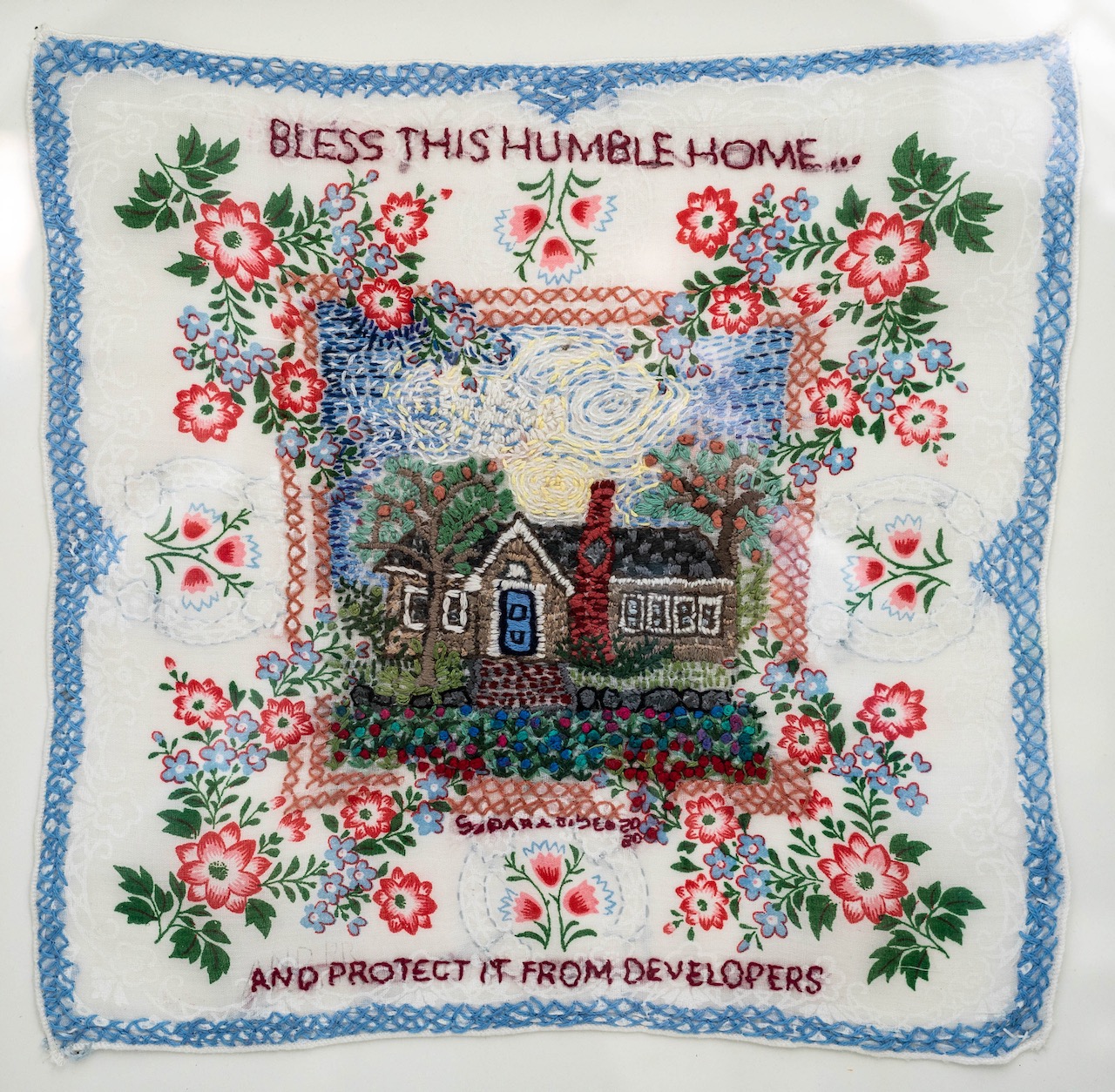
SUSAN PARADISE
BLESS THIS HUMBLE HOME
Cotton embroidery on vintage handkerchief
14” x 12”
“Having lived in my home in Needham, Massachusetts for over three decades I have watched generations of families come and go. Not much had changed until recently. Over the past few years I’ve stood by and watched the lovely modest Cape Cods and traditional Colonial homes being demolished, pock-marking the neighborhood with gaping holes and then replaced by humongous ostentatious homes. There’s hardly a day without being awoken by the sound of wrecking crews and large trucks barreling down the road delivering everything from Styrofoam blocks to faux siding. Where old craftsmanship once stood now there is prefab construction trimmed in tacky shiny brass. I used to know the neighbors, we’d all take to the time to chat, but the newbies always seem to be in a rush, slipping out of their garage’s unseen. Maybe I’m being overly sentimental, but I hope when the time comes for me to leave my home that it will remain erect and that someone will learn to love it as I have, old bones and all.”
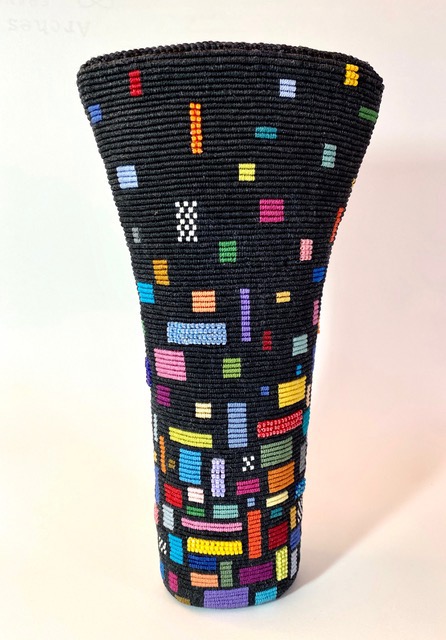
MERRILL MORRISON
MARKING TIME
Knotted & beaded flared vessel. Styrofoam, waxed linen, rayon cord, glass beads.
9 7/8” H x 5 1/4” W x 2 1/2” D
“I met my husband, Mark, at 16 years old while attending high school in New York. We were married at 25 and then moved to California, where we raised two daughters and built a life together. In 2018, after a short illness, Mark died of leukemia at age 69. This piece represents how a shared life creates layers of patterns. Loss can disrupt the sense of comfort derived from familiar patterns, resulting in both the pain associated with absence as well as the space to create new beginnings. ‘MARKing Time’ depicts our life together, through the use of colored building blocks. As I navigate this next phase of my life, the patterns transform to allow for new growth and discovery.”
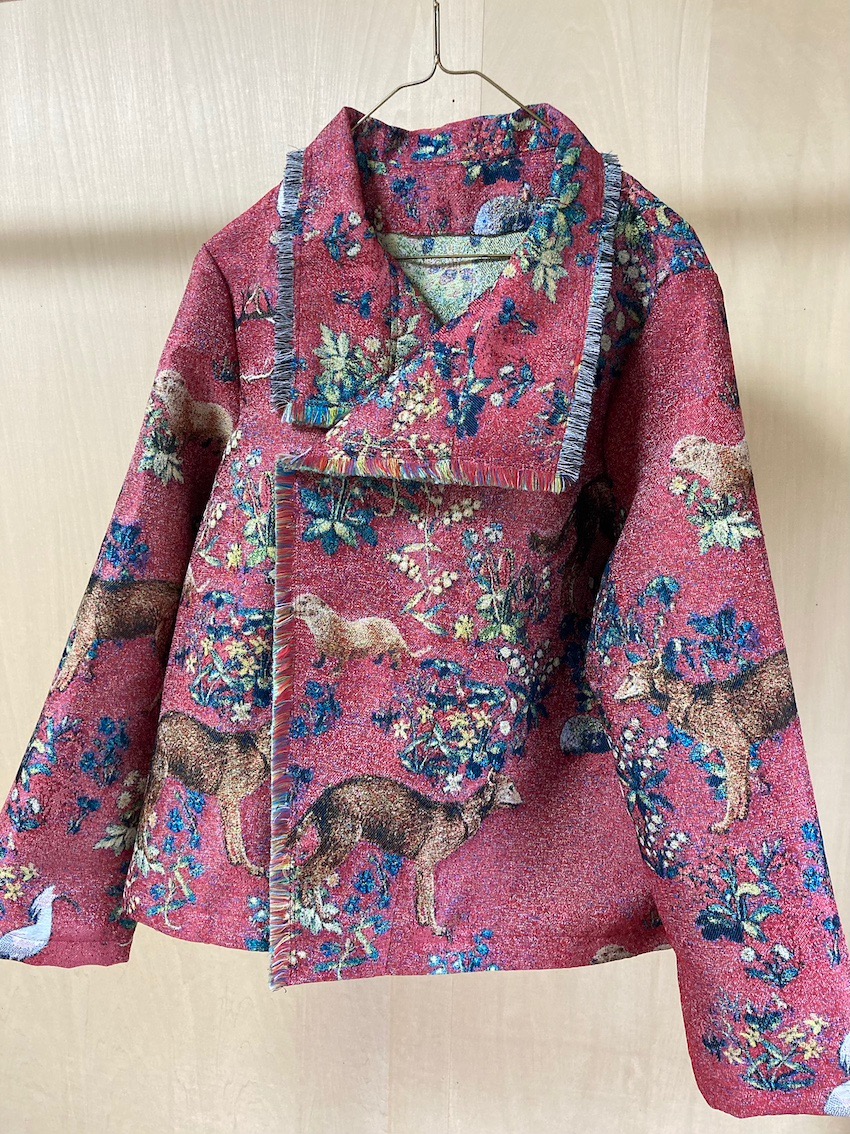
YORIKO MURAYAMA
MILLEFLEUR JAPAN JACKET
Digital Jacquard, textile polyester
“I started my career by making a kasuri kimono when I was a student at art university. I still weave silk and other yarns which are bound and dyed with natural dyes then woven into cloth. Weaving textiles by using the warp and weft presents a restriction to me. I think that to find a free expression in this restriction, this is my challenge.”
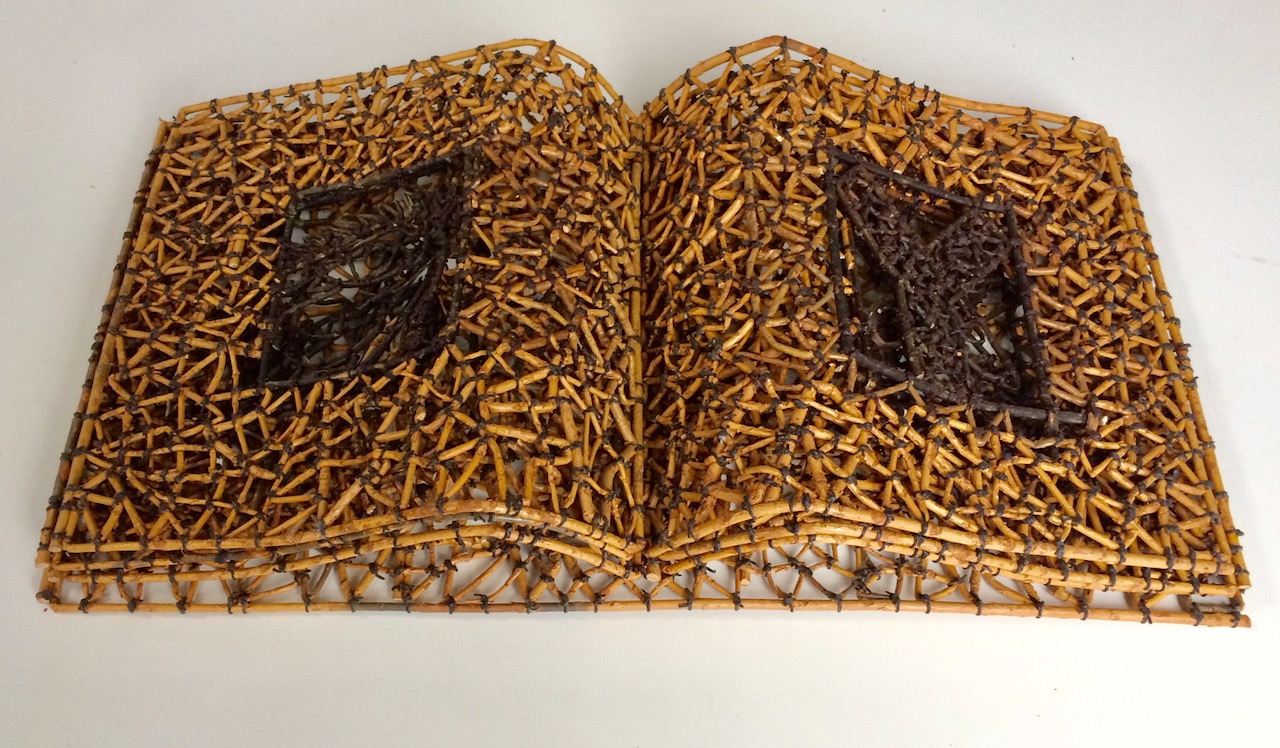
JOHN MCQUEEN
I CAN NOT X PLANE Y – BOOK AND REBUS (close)
Willow, thread
4” x 24” x 12” closed, 68” in length when open
John McQueen’s extraordinary works have been described as “hovering, with great humor, in the gap between craft, sculpture and Conceptual art.” – Gerald Mead. His sculptural forms acknowledge the rich tradition of basketry by manipulating organic materials such as bent, tied and woven willow branches, harvested from his own property. Richly textured and layered wall pieces are expertly transformed into figurative images or narratives from layers of colored birch bark found on the forest floor. McQueen masterfully discovers the potential of any substance, awakening our awareness to natural materials that are usually ignored and often discarded. These remnants are deftly constructed with a myriad of textile techniques, incorporating ancient art forms with contemporary issues and concepts. Each object is transformed into a unique and vibrant work of art with imagination, wit and brilliant execution. “His virtuoso craftsmanship and the conceptual underpinnings of his work merge to remind us that skill is subservient to meaning in artwork that nourishes both the eye and the intellect.” – Gerald Mead
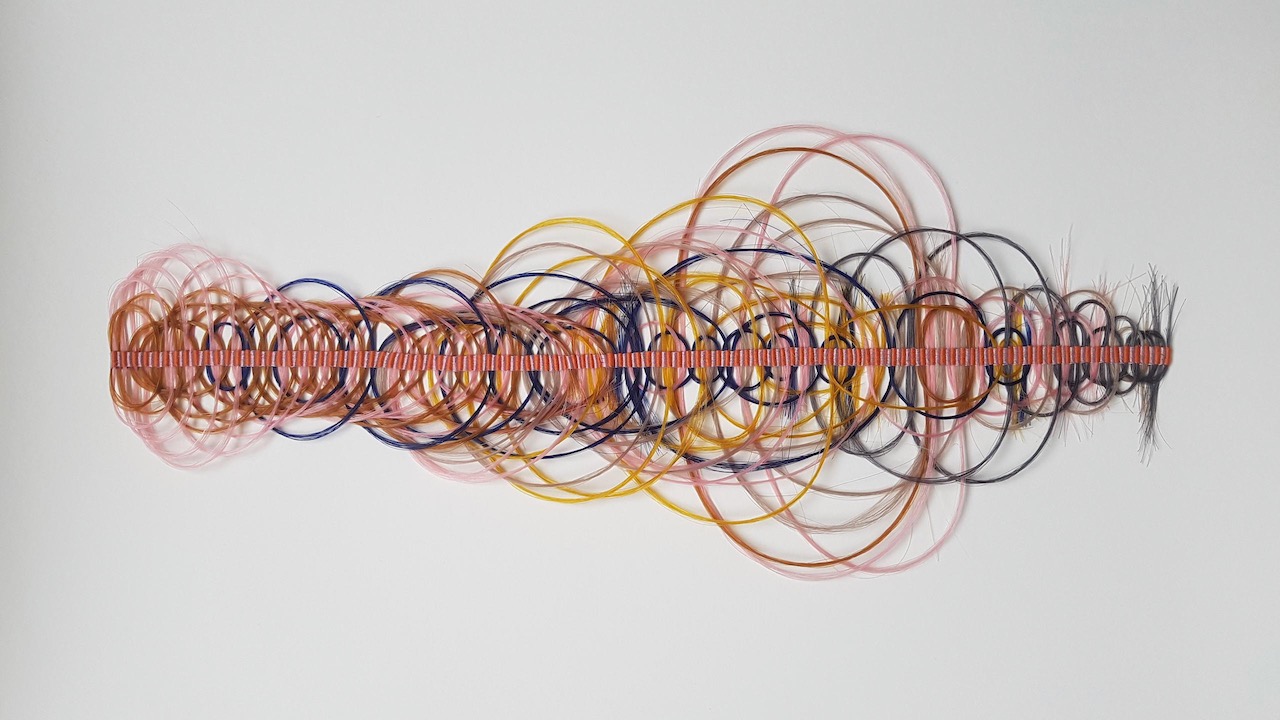
MARIANNE KEMP
SPIRALS
Horse Hair Weaving, Unframed
15.35″ x 21.25″
Marianne Kemp’s passion for weaving is evident in her meticulous work, often specializing in weaving with horsehair. When taking a closer look at her work one can see that each piece has a unique character achieved with her unconventional weaving techniques and the combination of the texture, color and movement.
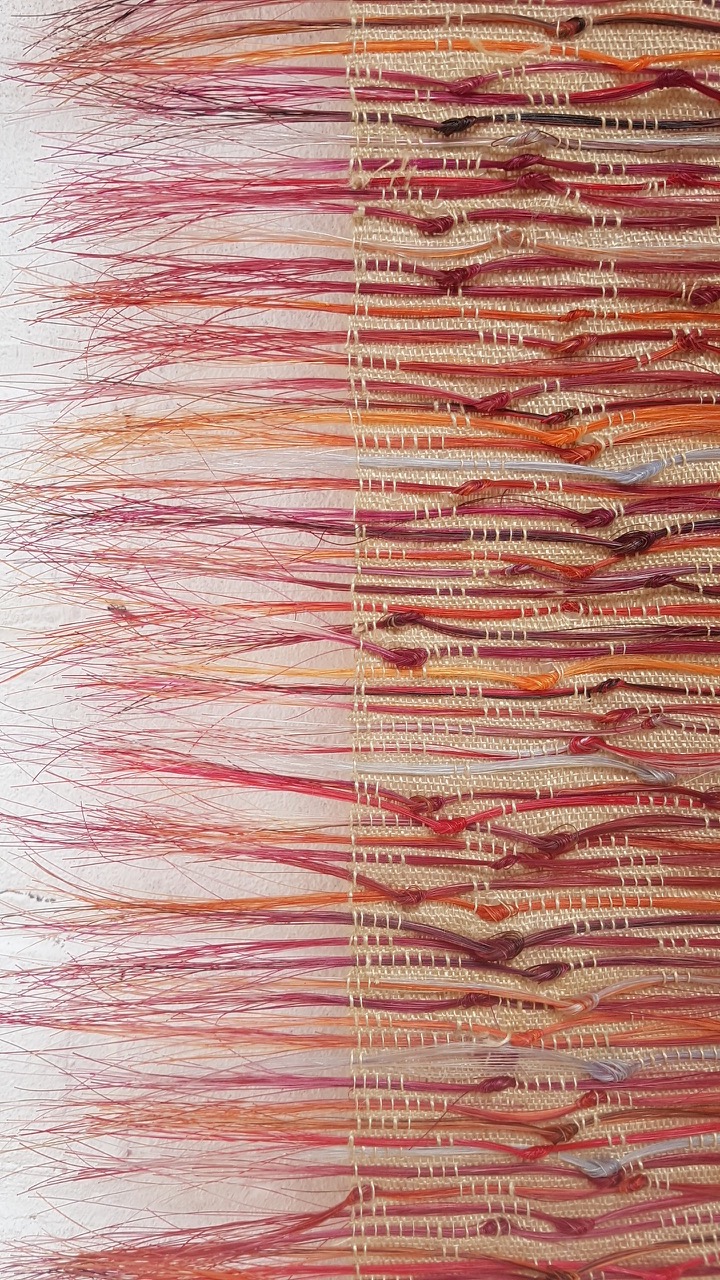
MARIANNE KEMP
VIBRATIONS (detail)
Horsehair, linen, two sticks
24.8” x 56.3”
Marianne Kemp’s passion for weaving is evident in her meticulous work, often specializing in weaving with horsehair. When taking a closer look at her work one can see that each piece has a unique character achieved with her unconventional weaving techniques and the combination of the texture, color and movement.
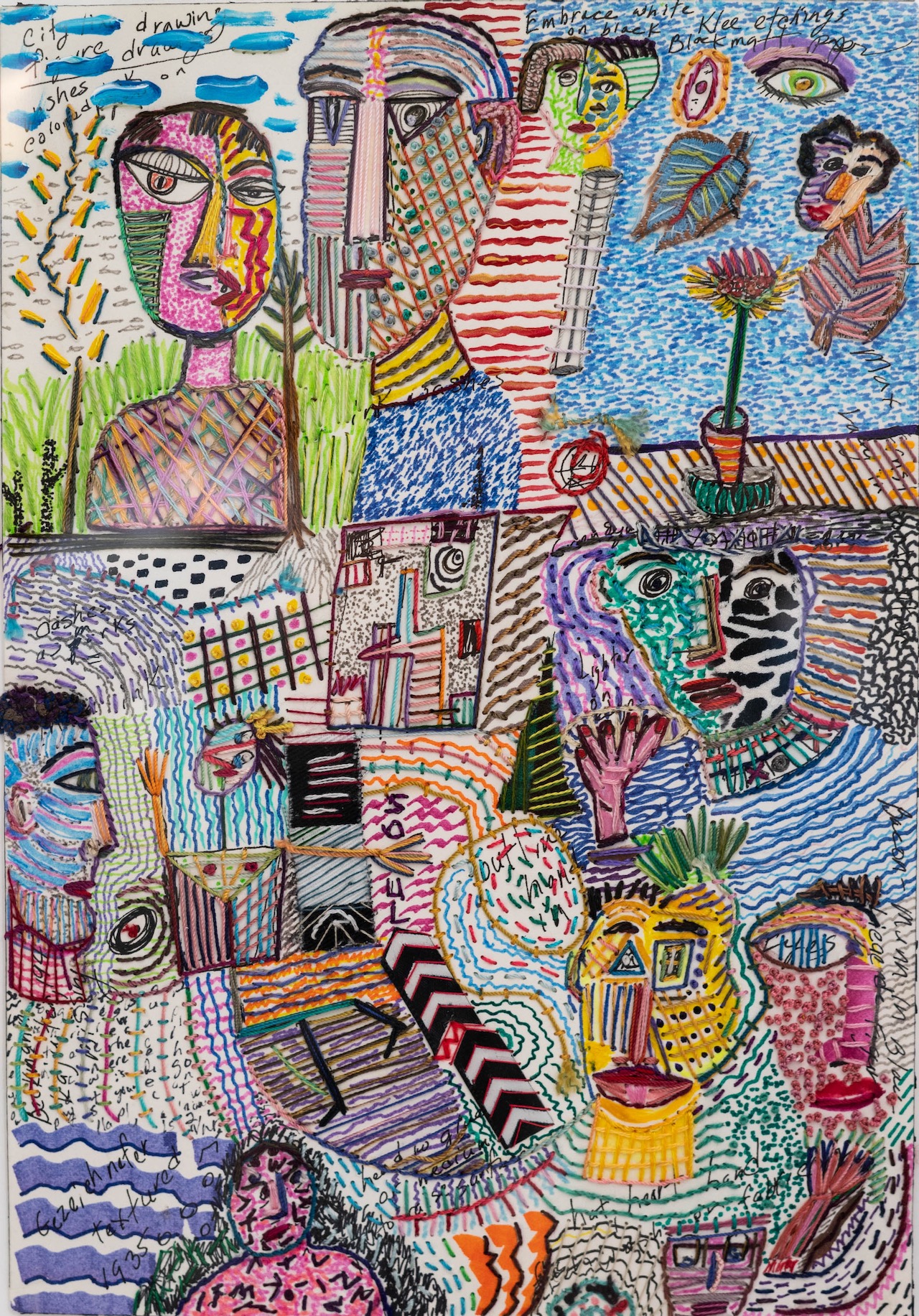
MARY BERO
BRUT MUSEUM DRAWING
Paper, ink, embroidery thread
19” h x 16” w
“Mary Bero fearlessly breaks all the traditional rules of fiber art. She deftly combines embroidery, painting, and sculptural elements to create exuberant works of art. She is a virtuoso of color. Her images are loosely connected, as if part of a daydream or, at times nightmare. The various elements in the picture plane come together through a succession of small marks, and build a successive whole.” – Jane Sauer, Speaking with Threads Exhibition
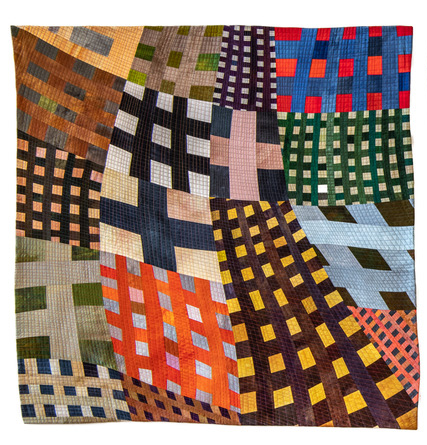
ELEANOR MCCAIN
WARPING COLOR BLOCKS QUILT #1
Quilts. Fabric, thread. Hand-dyed, cut and pieced, machine-stitched
45″ x 45″
“Domestic Disturbances describes much of what my work means to me. I have always loved the physical act of making things, love feeling materials, love handling the product. Craft art references common objects with cultural meanings, and fabric has all the references for me. I love the feel of fabric, it is comforting, malleable, with infinite textures and colors. I come from a long line of quilters. I own beautiful quilts from both sides of my family and my husband’s family, They are true works of art, but always considered ‘women’s work’ and utilitarian in purpose. I feel connected to my ancestors through my art, and hope to honor and understand them through my practice. • • This is the heritage I claim: Women’s work, craft and domestic art, historical and cultural references with meaning for me, in an art form that has been traditionally undervalued. My influences are traditional quilts and traditional piecing. I continue to be inspired by the beautiful works of textile artists , historical and contemporary.”
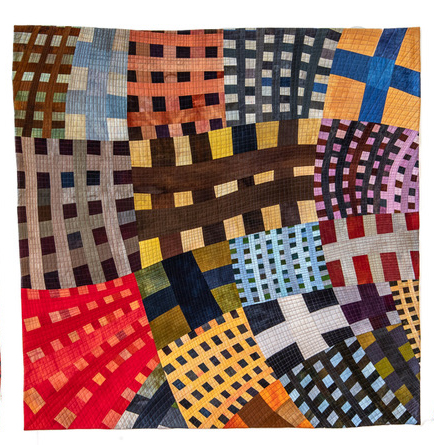
ELEANOR MCCAIN
WARPING COLOR BLOCKS QUILT #2
Quilts. Fabric, thread. Hand-dyed, cut and pieced, machine-stitched
45″ x 45″
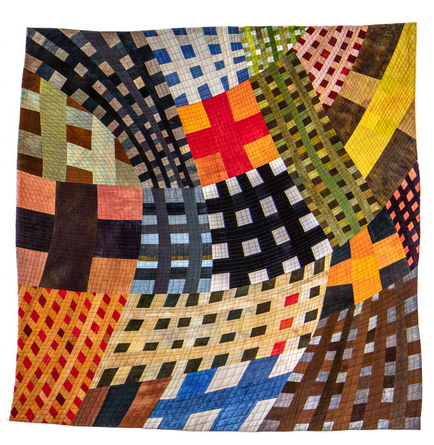
ELEANOR MCCAIN
WARPING COLOR BLOCKS QUILT #3
Quilts. Fabric, thread. Hand-dyed, cut and pieced, machine-stitched
45″ x 45″
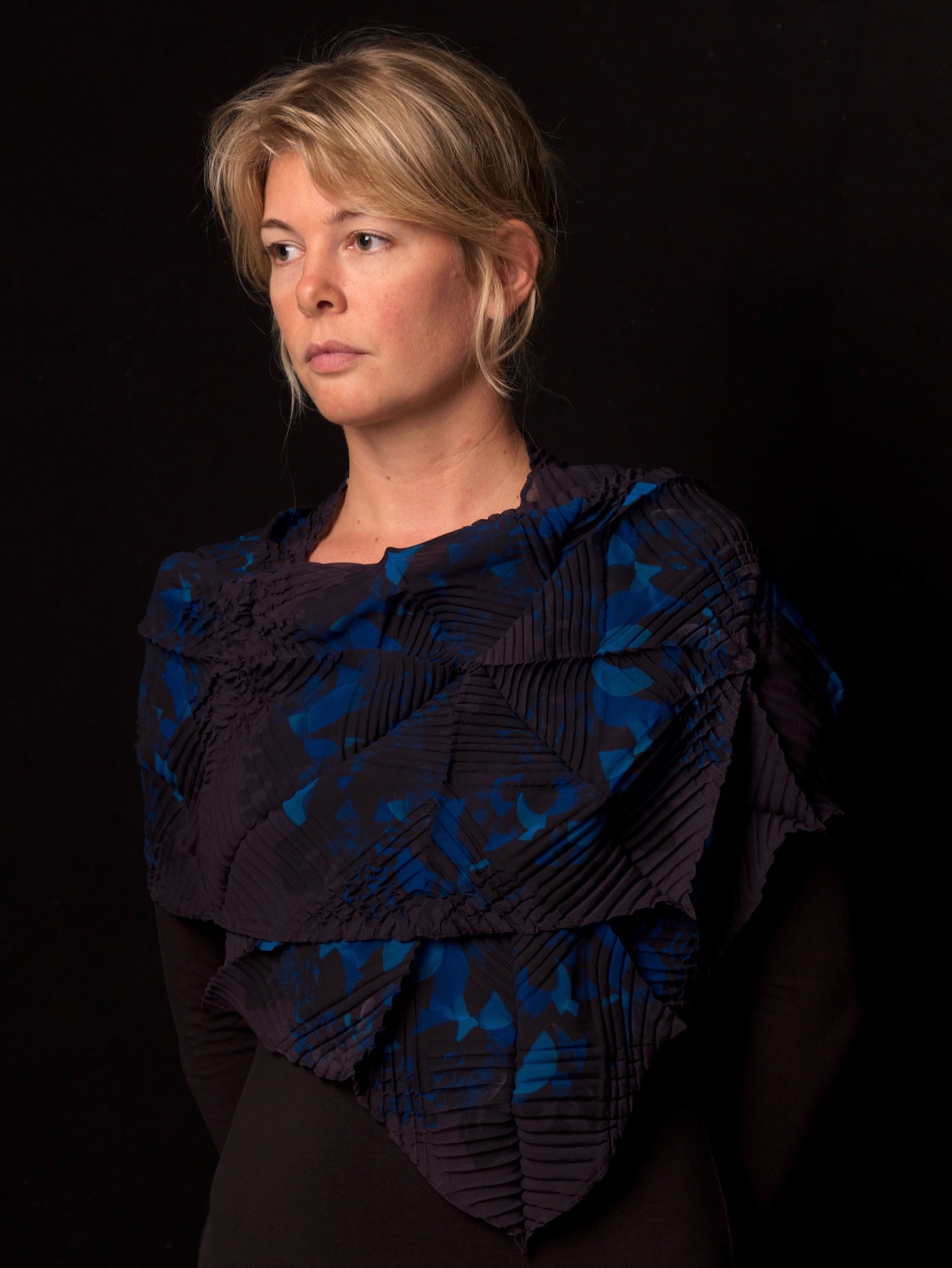
SARAH ENOCH
CRINOIDEA
Shawl. Sown and heat set pleated by artist (one off piece). Digital print on semi transparent, lightweight Polyester fabric (PES). Fabric designed by artist.
approx. 69” Long x 18” Wide
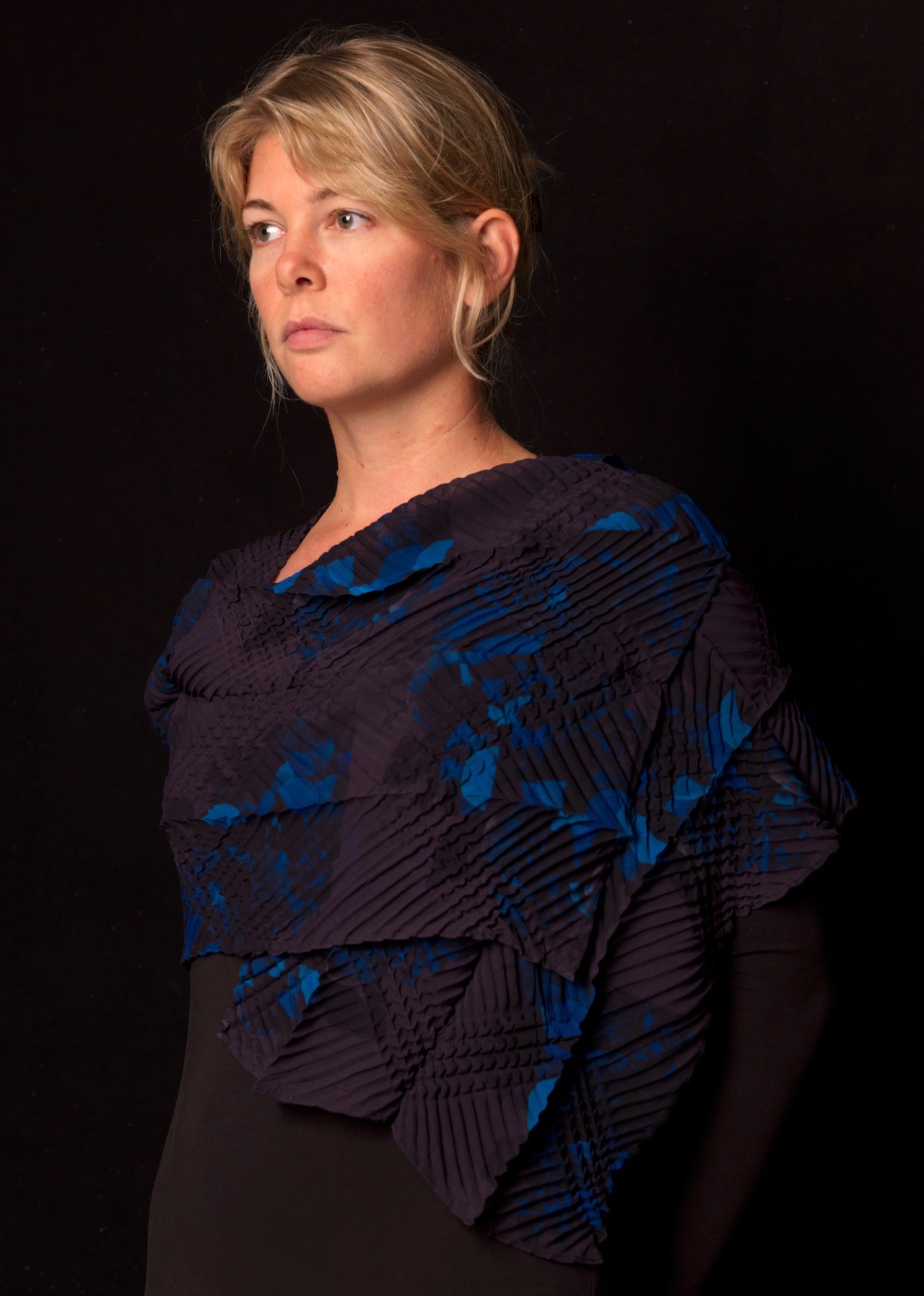
SARAH ENOCH
DIATOMEA
Shawl. Sown and heat set pleated by artist (one off piece). Digital print on semi transparent, lightweight Polyester fabric (PES). Fabric designed by artist.
approx. 69” Long x 18” Wide

Andrea Uravitch
Tamarin: Going, Going, Gone?
Constructed steel and wire armature, hand=made felt, ceramic head and feet, crochet fiber parts and Romanian Goat hair whiskers.

ALICJA KOZLOWSKA
YELLOW SARDINE CAN
Lemons, Blue, Red and Yellow Sardine Cans Embroidered felt sculpture made in artquilt technique.

ALICJA KOZLOWSKA
Lemons
Lemons, Blue, Red and Yellow Sardine Cans Embroidered felt sculpture made in artquilt technique.

ALICJA KOZLOWSKA
BLUE SARDINE CAN
Lemons, Blue, Red and Yellow Sardine Cans Embroidered felt sculpture made in artquilt technique.

ALICJA KOZLOWSKA
RED SARDINE CAN
Lemons, Blue, Red and Yellow Sardine Cans Embroidered felt sculpture made in artquilt technique.

ELIZABETH WHYTE SCHULZE
ELSAH WALLPIECE (MOROCCO SERIES)
Pine needles, natural and dyed raffia, acrylic paint

ELIZABETH WHYTE SCHULZE
FISH WOMEN (MOROCCO SERIES)
Pine needles, natural and dyed raffia, acrylic paint

ELIZABETH WHYTE SCHULZE
TARBOOSH (MOROCCO SERIES)
Pine needles, natural and dyed raffia, acrylic paint

ELIZABETH WHYTE SCHULZE
TIZNIT WALLPIECE (MOROCCO SERIES)
Pine needles, natural and dyed raffia, acrylic paint

MERRILL MORRISON
MARKING TIME
Knotted & beaded flared vessel. Styrofoam, waxed linen, rayon cord, glass beads.

ELEANOR MCCAIN
WARPING COLOR BLOCKS QUILT #1
Quilts. Fabric, thread. Hand-dyed, cut and pieced, machine-stitched

ELEANOR MCCAIN
WARPING COLOR BLOCKS QUILT #2
Quilts. Fabric, thread. Hand-dyed, cut and pieced, machine-stitched

ELEANOR MCCAIN
WARPING COLOR BLOCKS QUILT #3
Quilts. Fabric, thread. Hand-dyed, cut and pieced, machine-stitched

SARAH ENOCH
CRINOIDEA
Shawl. Sown and heat set pleated by artist (one off piece). Digital print on semi transparent, lightweight Polyester fabric (PES). Fabric designed by artist.

SARAH ENOCH
DIATOMEA
Shawl. Sown and heat set pleated by artist (one off piece). Digital print on semi transparent, lightweight Polyester fabric (PES). Fabric designed by artist.
- IMAGES:
- /

Andrea Uravitch
Tamarin: Going, Going, Gone?
Constructed steel and wire armature, hand=made felt, ceramic head and feet, crochet fiber parts and Romanian Goat hair whiskers.
Body 18”long / tail 32” long 17” tall / 9” foot span

ALICJA KOZLOWSKA
YELLOW SARDINE CAN
Lemons, Blue, Red and Yellow Sardine Cans Embroidered felt sculpture made in artquilt technique.
4.3” x 2.6” x 1.2”

ALICJA KOZLOWSKA
Lemons
Lemons, Blue, Red and Yellow Sardine Cans Embroidered felt sculpture made in artquilt technique.
Whole lemon: 4.1” x 2.4” x 2.4”; Half a lemon: 2.4” x 2.4” x 2.4”

ALICJA KOZLOWSKA
BLUE SARDINE CAN
Lemons, Blue, Red and Yellow Sardine Cans Embroidered felt sculpture made in artquilt technique.
4.3” x 2.6” x 1.2”

ALICJA KOZLOWSKA
RED SARDINE CAN
Lemons, Blue, Red and Yellow Sardine Cans Embroidered felt sculpture made in artquilt technique.
4.3” x 2.6” x 1.2”

JOHN GARRETT
ROPE
Various machine knit, corded and braided threads and fabrics.
Approximately 36 feet x 3 inches

ELIZABETH WHYTE SCHULZE
ELSAH WALLPIECE (MOROCCO SERIES)
Pine needles, natural and dyed raffia, acrylic paint
14” x 3”

ELIZABETH WHYTE SCHULZE
FISH WOMEN (MOROCCO SERIES)
Pine needles, natural and dyed raffia, acrylic paint
9” x 10”

ELIZABETH WHYTE SCHULZE
TARBOOSH (MOROCCO SERIES)
Pine needles, natural and dyed raffia, acrylic paint
21 “ x 16“ x 9“

ELIZABETH WHYTE SCHULZE
TIZNIT WALLPIECE (MOROCCO SERIES)
Pine needles, natural and dyed raffia, acrylic paint
17” x 13” x 1’’

ELIZABETH WHYTE SCHULZE
MARMOOSH WALLPIECE
Pine needles, natural and dyed raffia, acrylic paint
15” x 23”

ELLEN MOON
VINY JACKET
Knitted and dye painted perle cotton embroidered with cotton threads.
Size – Bust: 46″, Length: 26″, Wrist to wrist with arms out: 52″

MERRILL MORRISON
MARKING TIME
Knotted & beaded flared vessel. Styrofoam, waxed linen, rayon cord, glass beads.
9 7/8” H x 5 1/4” W x 2 1/2” D

JOHN MCQUEEN
I CAN NOT X PLANE Y – BOOK AND REBUS (close)
Willow, thread
4” x 24” x 12” closed, 68” in length when open

ELEANOR MCCAIN
WARPING COLOR BLOCKS QUILT #1
Quilts. Fabric, thread. Hand-dyed, cut and pieced, machine-stitched
45″ x 45″

ELEANOR MCCAIN
WARPING COLOR BLOCKS QUILT #2
Quilts. Fabric, thread. Hand-dyed, cut and pieced, machine-stitched
45″ x 45″

ELEANOR MCCAIN
WARPING COLOR BLOCKS QUILT #3
Quilts. Fabric, thread. Hand-dyed, cut and pieced, machine-stitched
45″ x 45″

SARAH ENOCH
CRINOIDEA
Shawl. Sown and heat set pleated by artist (one off piece). Digital print on semi transparent, lightweight Polyester fabric (PES). Fabric designed by artist.
approx. 69” Long x 18” Wide

SARAH ENOCH
DIATOMEA
Shawl. Sown and heat set pleated by artist (one off piece). Digital print on semi transparent, lightweight Polyester fabric (PES). Fabric designed by artist.
approx. 69” Long x 18” Wide

Andrea Uravitch
Tamarin: Going, Going, Gone?
Constructed steel and wire armature, hand=made felt, ceramic head and feet, crochet fiber parts and Romanian Goat hair whiskers.

ALICJA KOZLOWSKA
YELLOW SARDINE CAN
Lemons, Blue, Red and Yellow Sardine Cans Embroidered felt sculpture made in artquilt technique.

ALICJA KOZLOWSKA
Lemons
Lemons, Blue, Red and Yellow Sardine Cans Embroidered felt sculpture made in artquilt technique.

ALICJA KOZLOWSKA
BLUE SARDINE CAN
Lemons, Blue, Red and Yellow Sardine Cans Embroidered felt sculpture made in artquilt technique.

ALICJA KOZLOWSKA
RED SARDINE CAN
Lemons, Blue, Red and Yellow Sardine Cans Embroidered felt sculpture made in artquilt technique.

ELIZABETH WHYTE SCHULZE
ELSAH WALLPIECE (MOROCCO SERIES)
Pine needles, natural and dyed raffia, acrylic paint

ELIZABETH WHYTE SCHULZE
FISH WOMEN (MOROCCO SERIES)
Pine needles, natural and dyed raffia, acrylic paint

ELIZABETH WHYTE SCHULZE
TARBOOSH (MOROCCO SERIES)
Pine needles, natural and dyed raffia, acrylic paint

ELIZABETH WHYTE SCHULZE
TIZNIT WALLPIECE (MOROCCO SERIES)
Pine needles, natural and dyed raffia, acrylic paint

MERRILL MORRISON
MARKING TIME
Knotted & beaded flared vessel. Styrofoam, waxed linen, rayon cord, glass beads.

ELEANOR MCCAIN
WARPING COLOR BLOCKS QUILT #1
Quilts. Fabric, thread. Hand-dyed, cut and pieced, machine-stitched

ELEANOR MCCAIN
WARPING COLOR BLOCKS QUILT #2
Quilts. Fabric, thread. Hand-dyed, cut and pieced, machine-stitched

ELEANOR MCCAIN
WARPING COLOR BLOCKS QUILT #3
Quilts. Fabric, thread. Hand-dyed, cut and pieced, machine-stitched

SARAH ENOCH
CRINOIDEA
Shawl. Sown and heat set pleated by artist (one off piece). Digital print on semi transparent, lightweight Polyester fabric (PES). Fabric designed by artist.

SARAH ENOCH
DIATOMEA
Shawl. Sown and heat set pleated by artist (one off piece). Digital print on semi transparent, lightweight Polyester fabric (PES). Fabric designed by artist.
A Group Exhibition of Contemporary Textiles Exploring Topics of Society, Politics, Nature & Everyday Living with a ‘Wow’ Factor!
Contemporary textiles encompass a vast field with an astounding range of techniques. Textiles for interiors, jewelry, fashion, and art can incorporate weaving, embroidery, knitting, crochet, quilting, knotting, dying, printing and painting. “Domestic Disturbance” will include a wide range of inspirational topics, whether social, political or the beauty of nature and everyday living.
